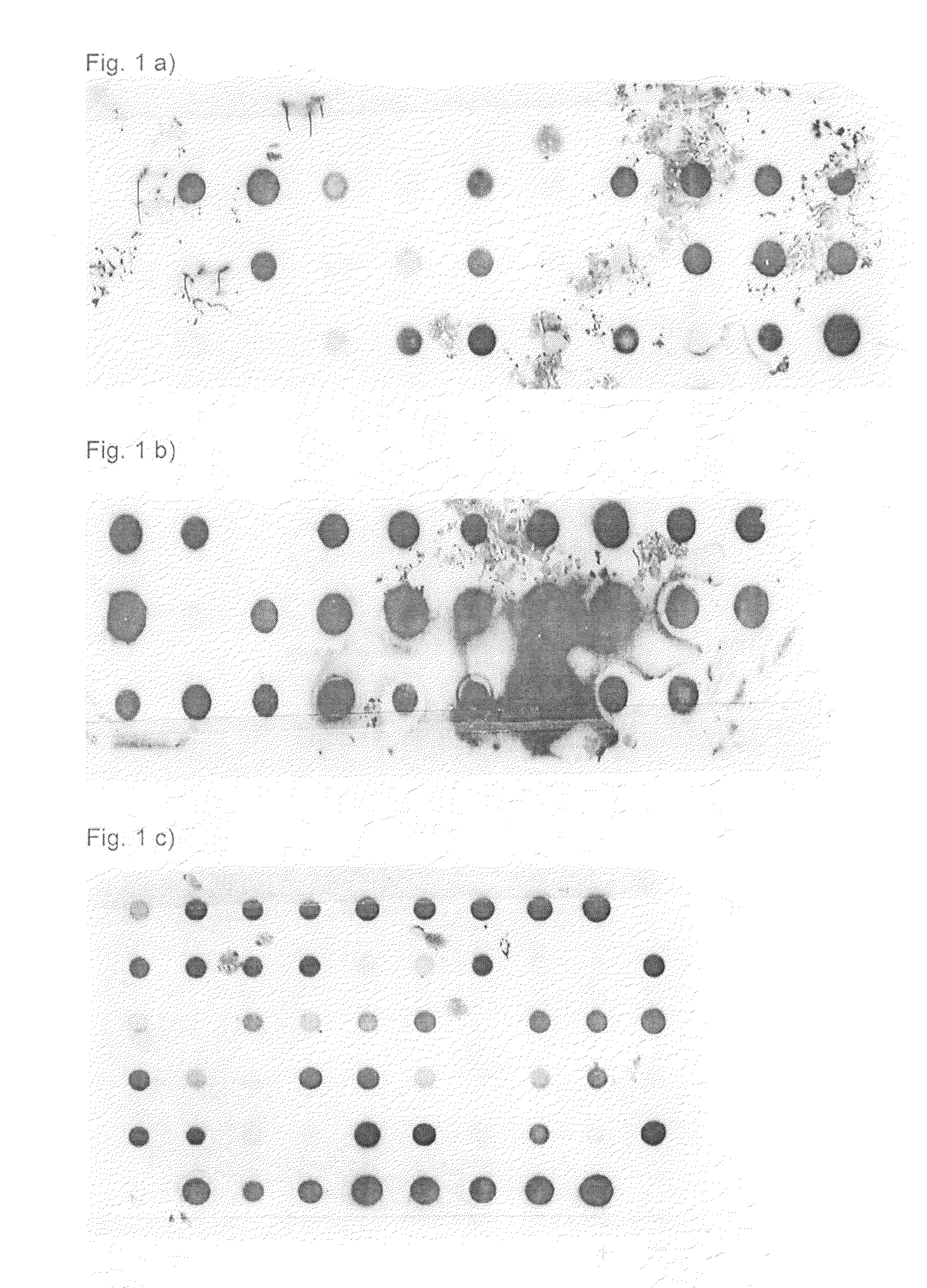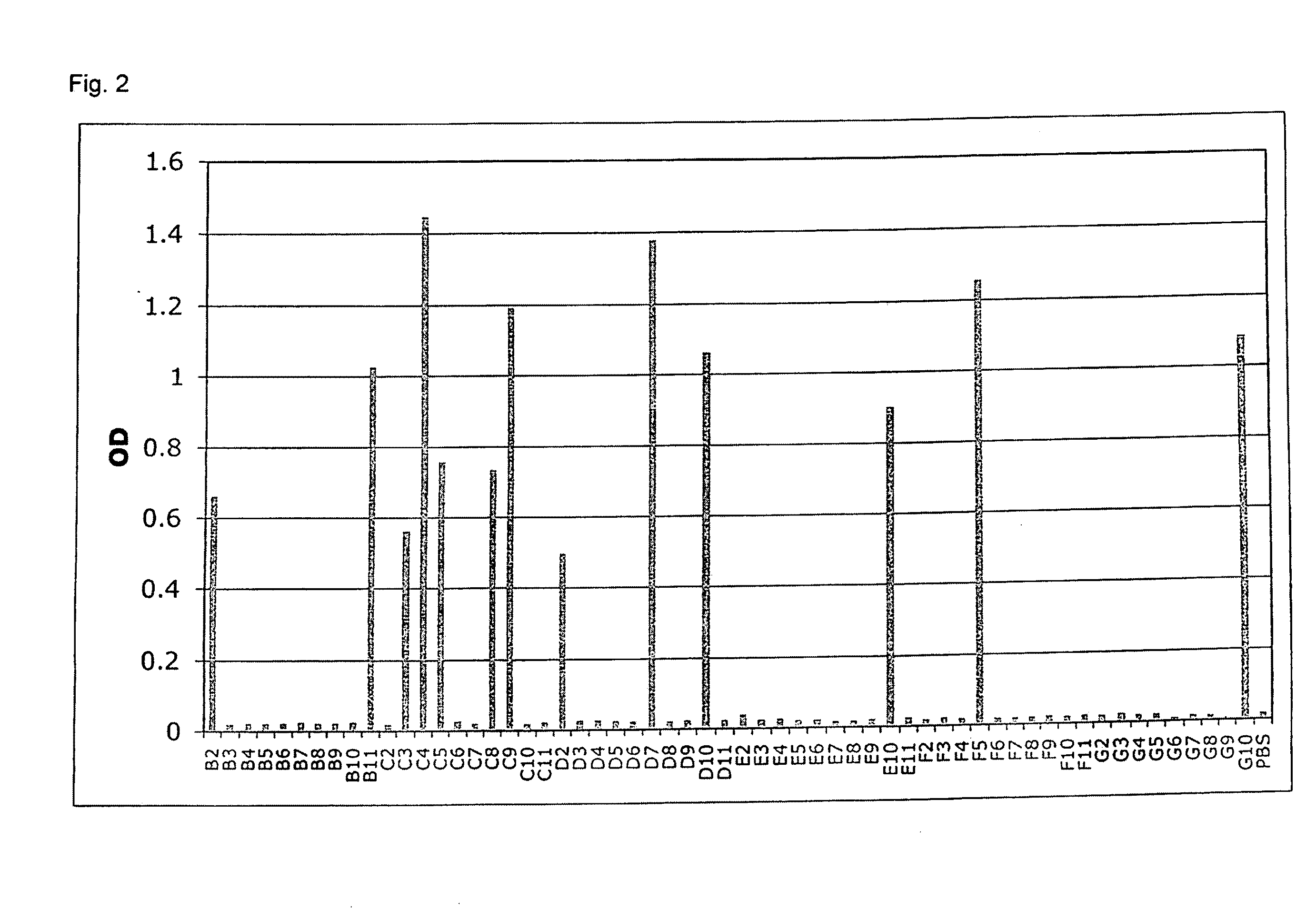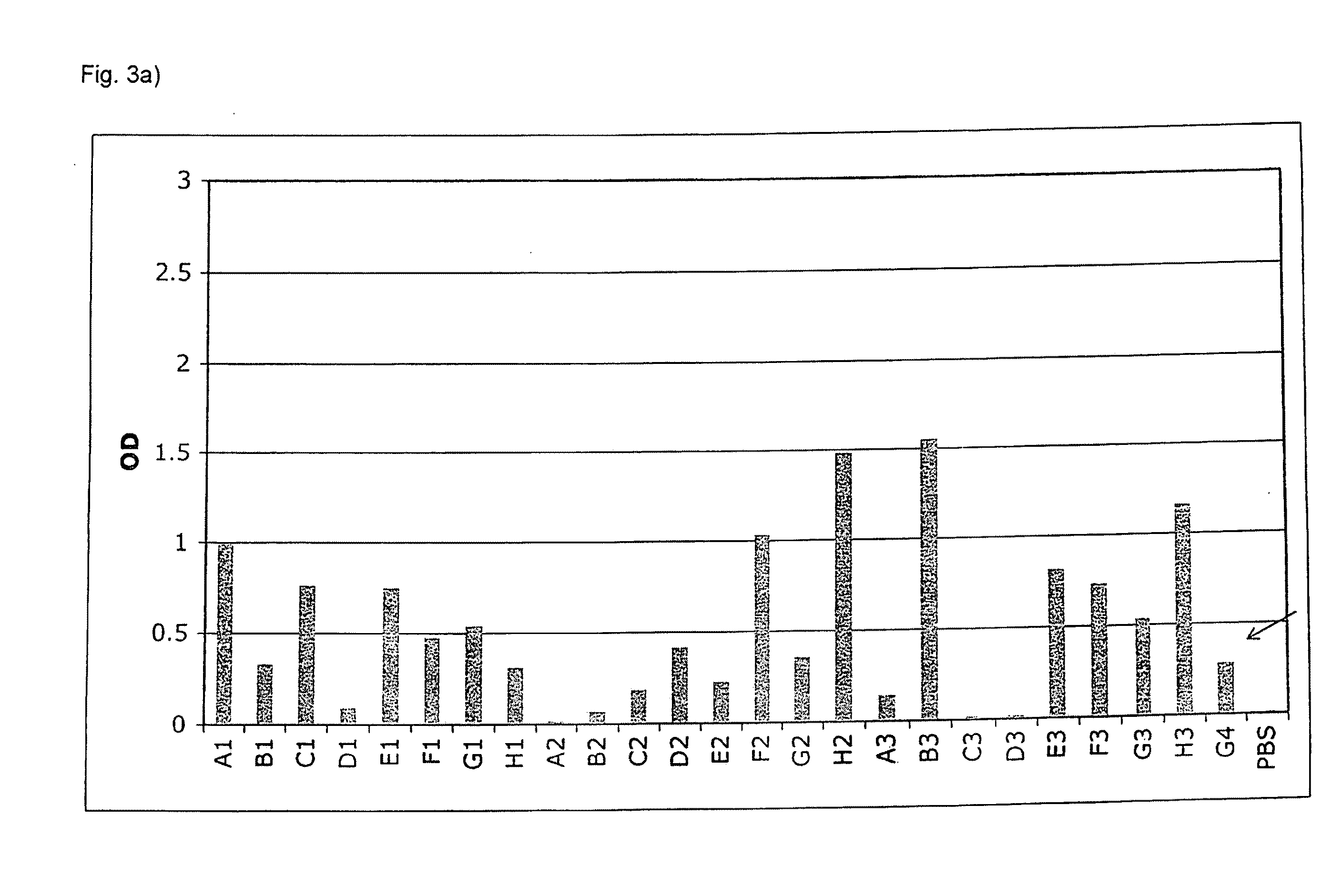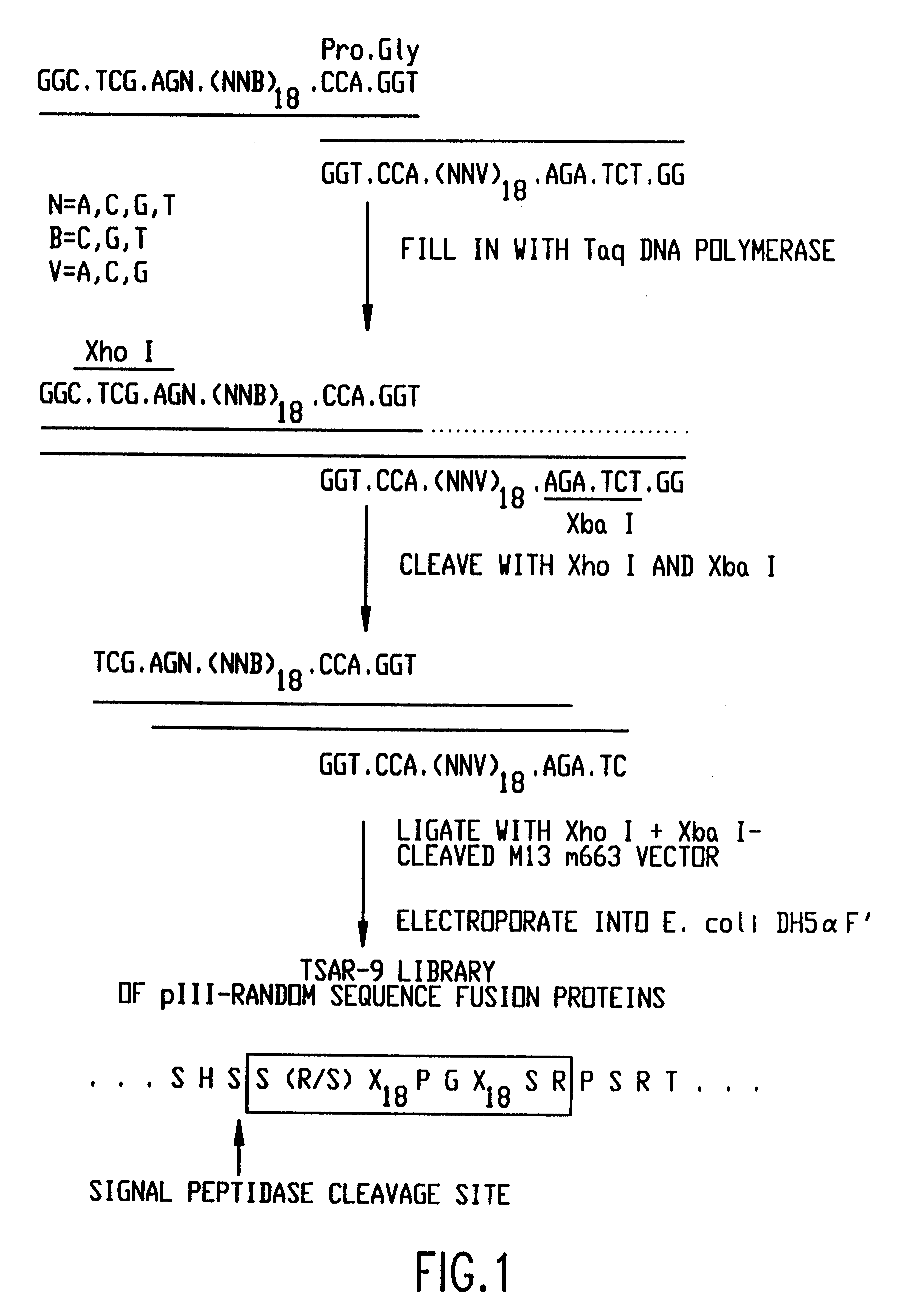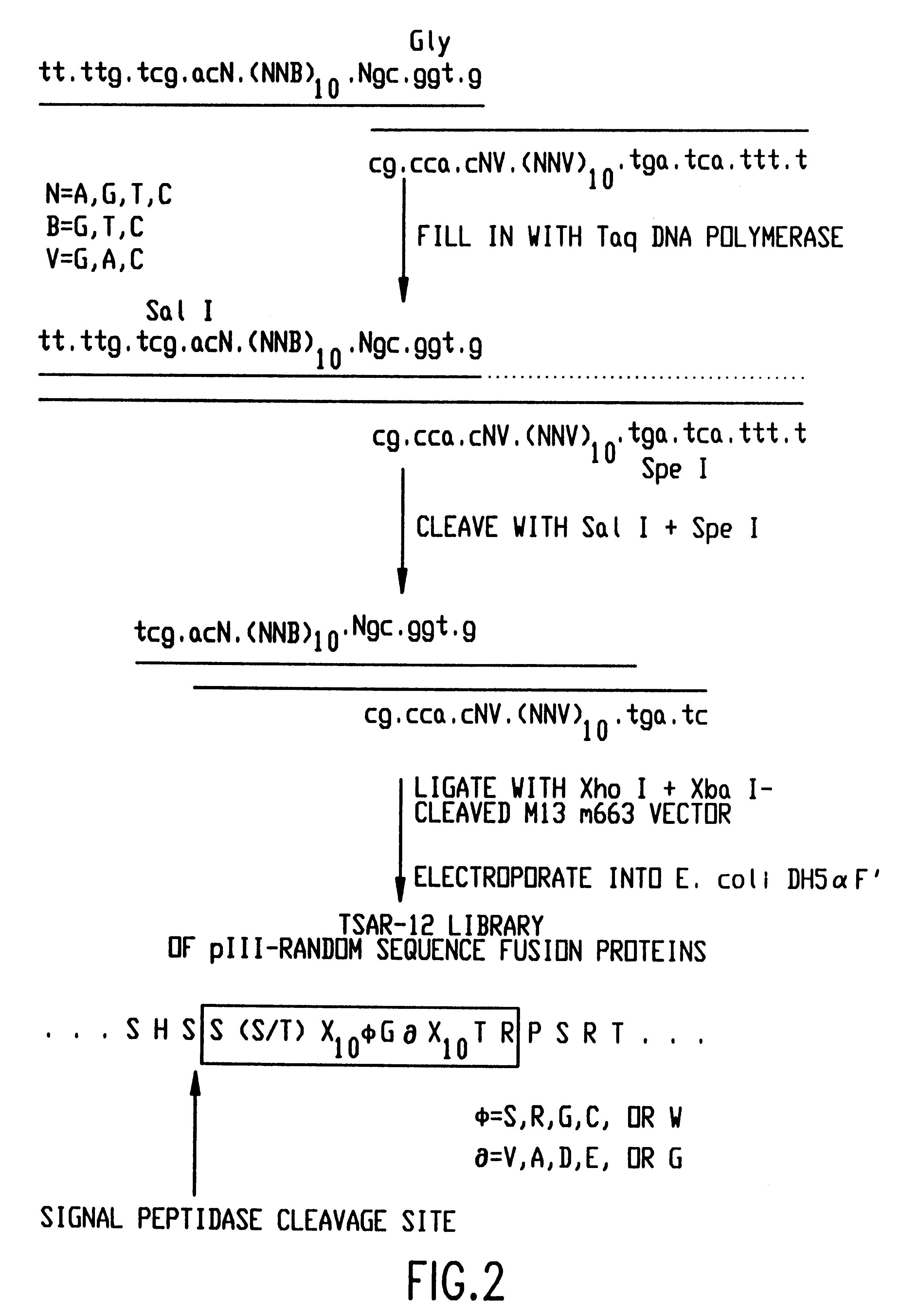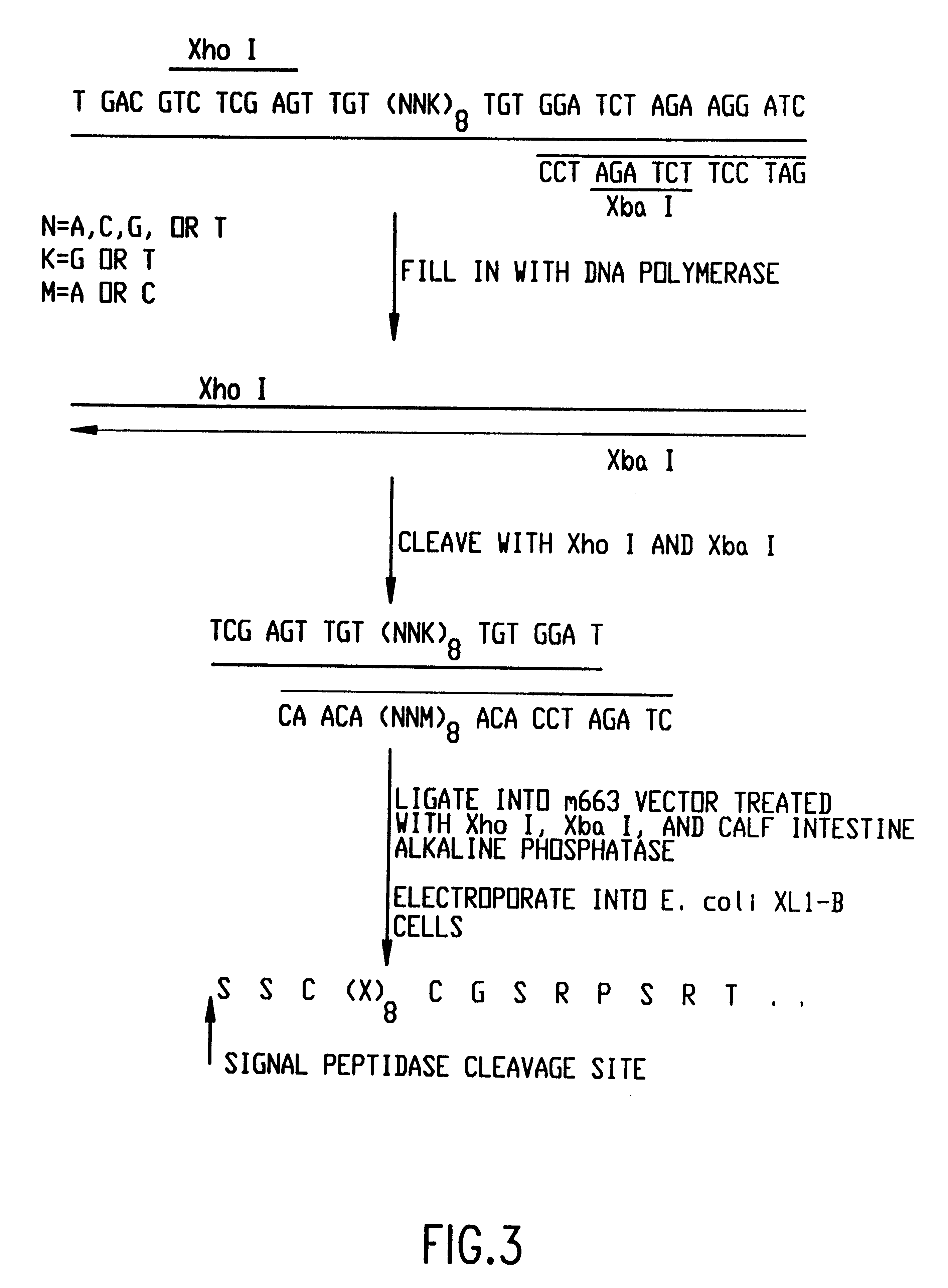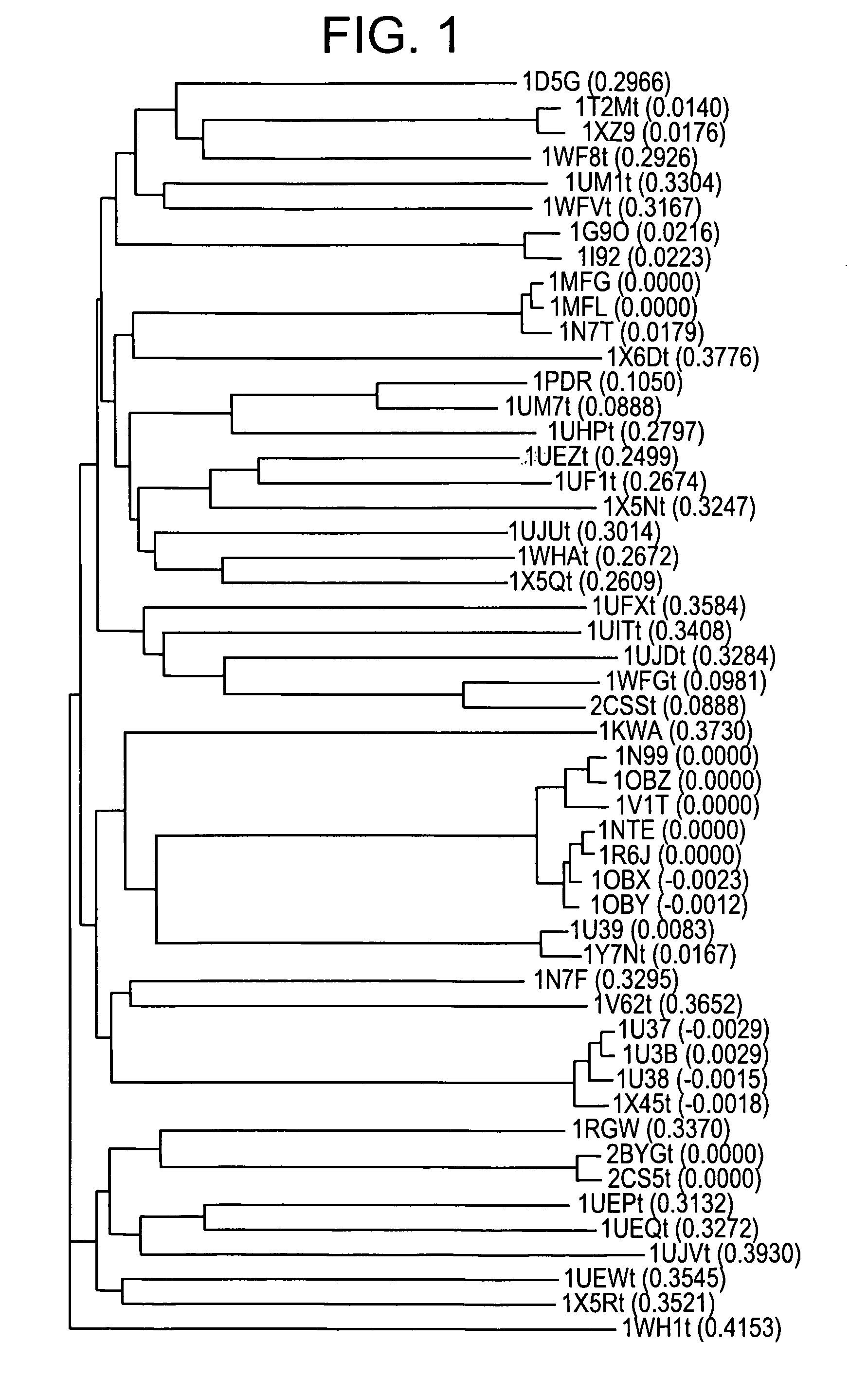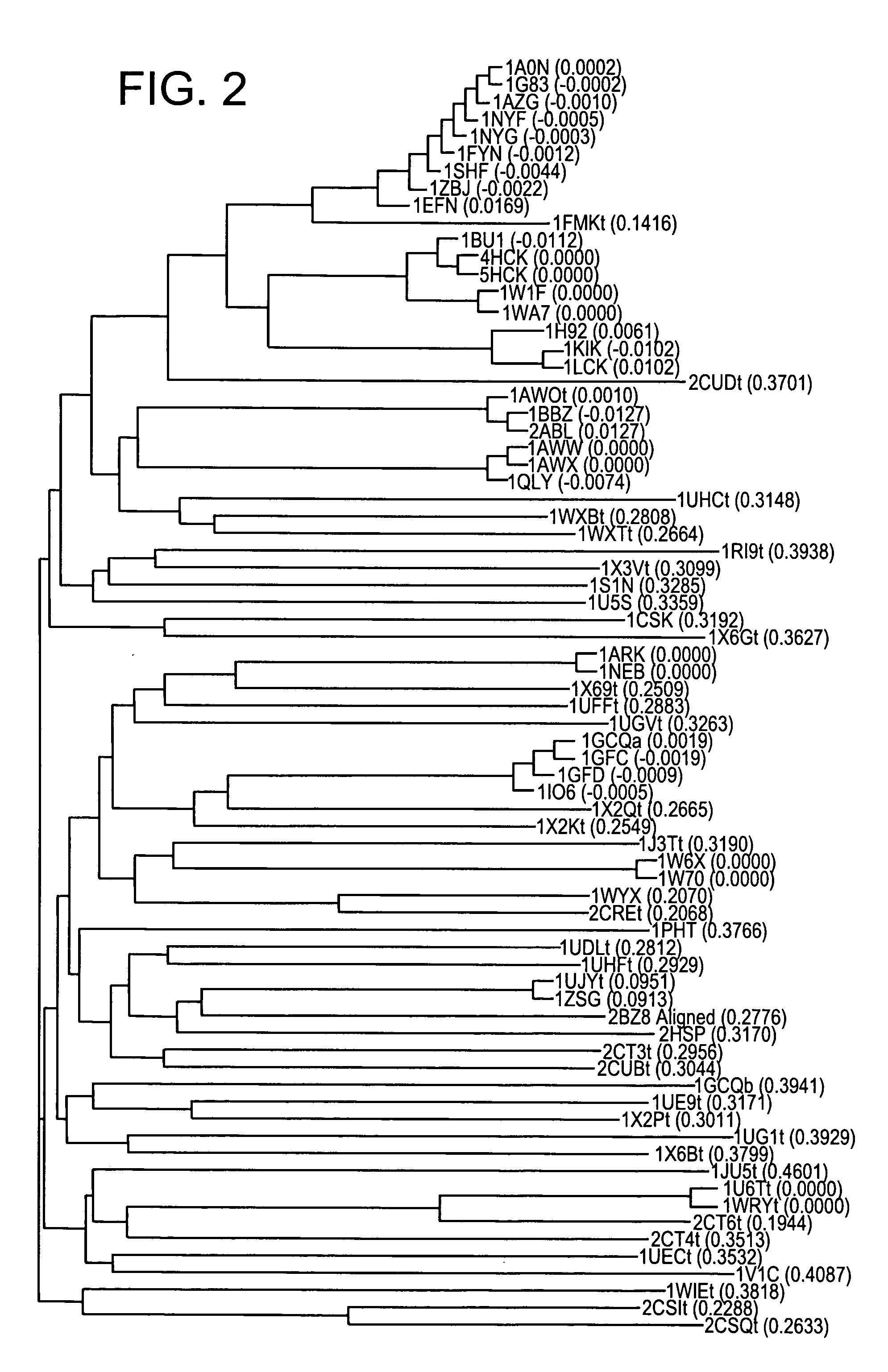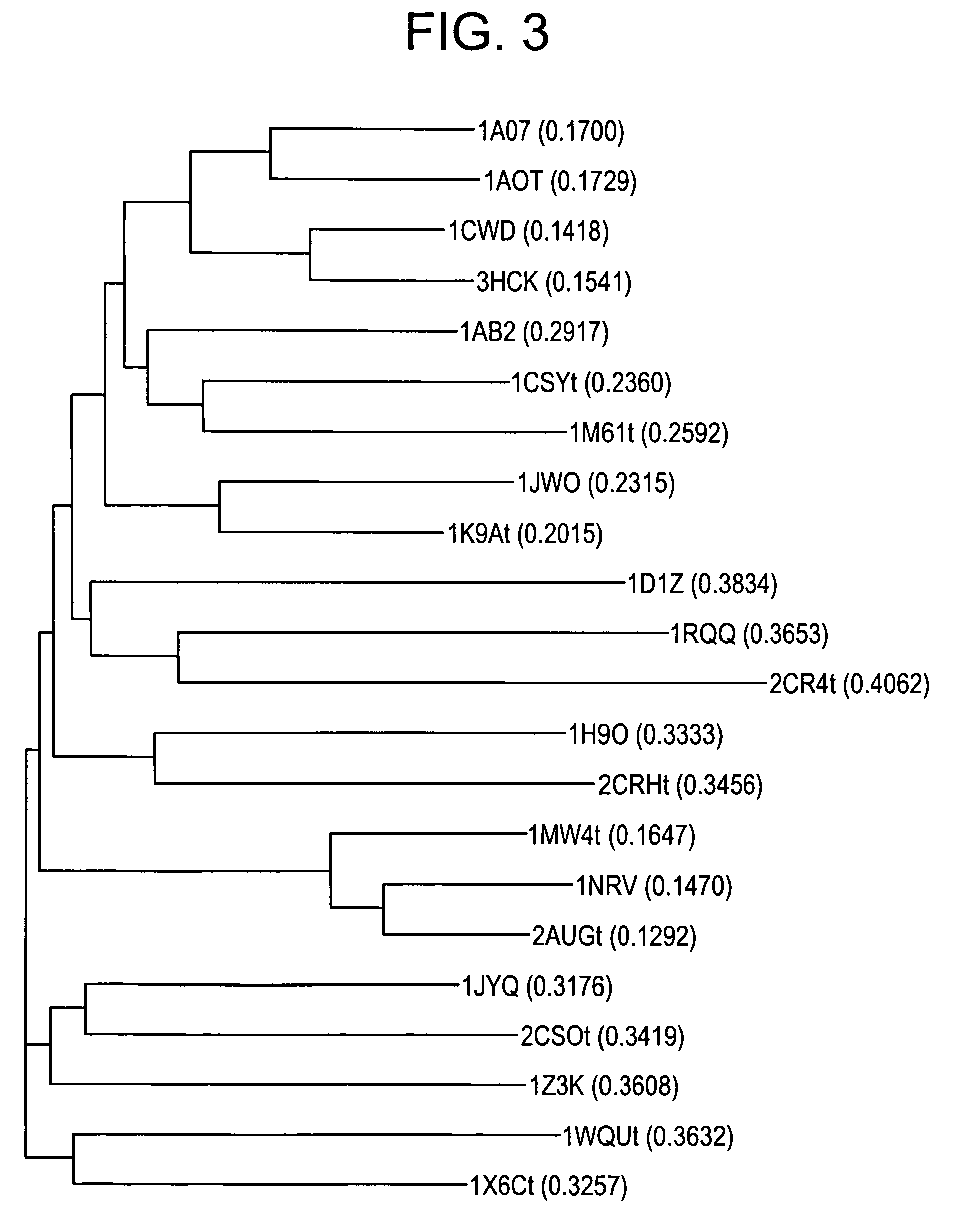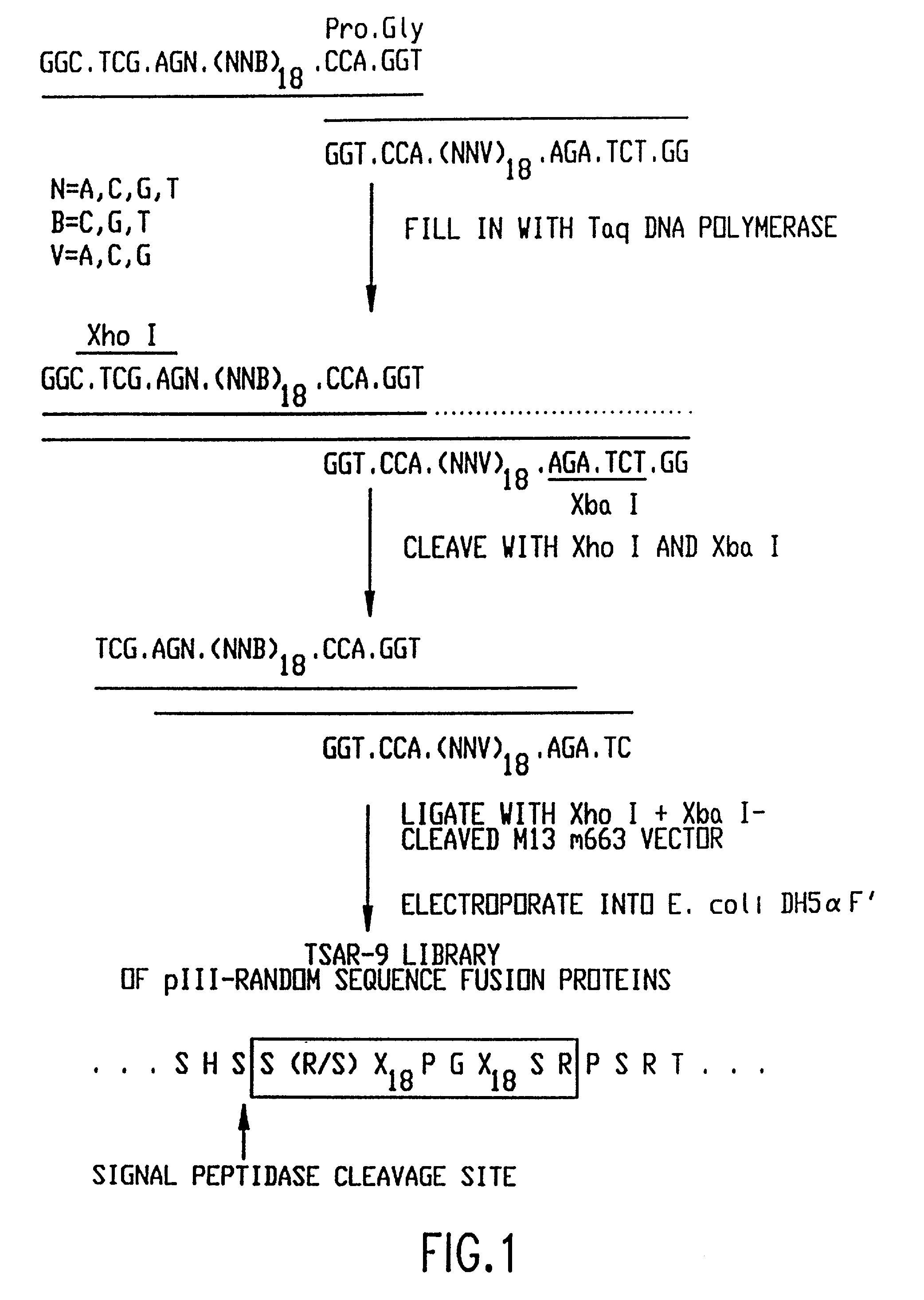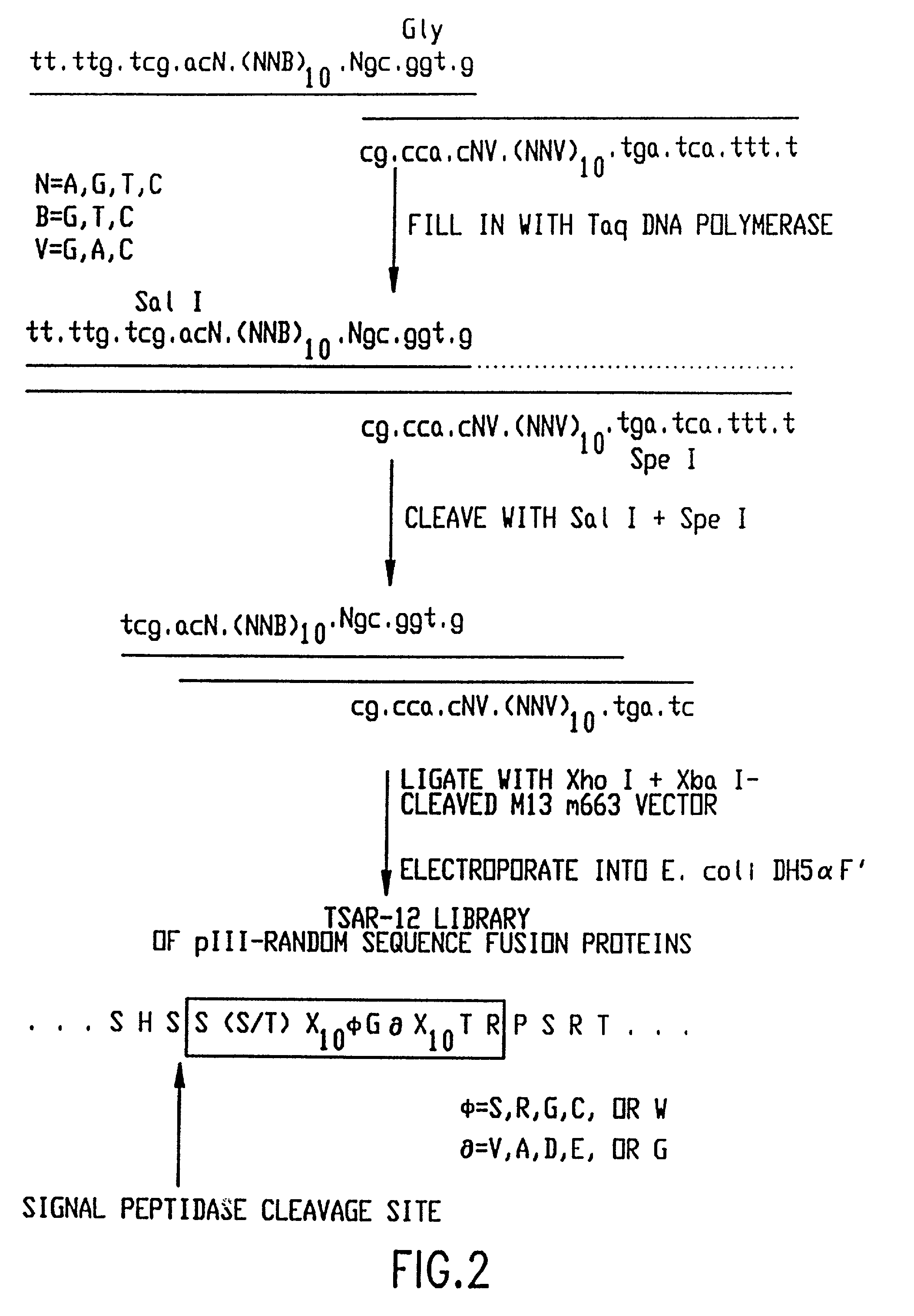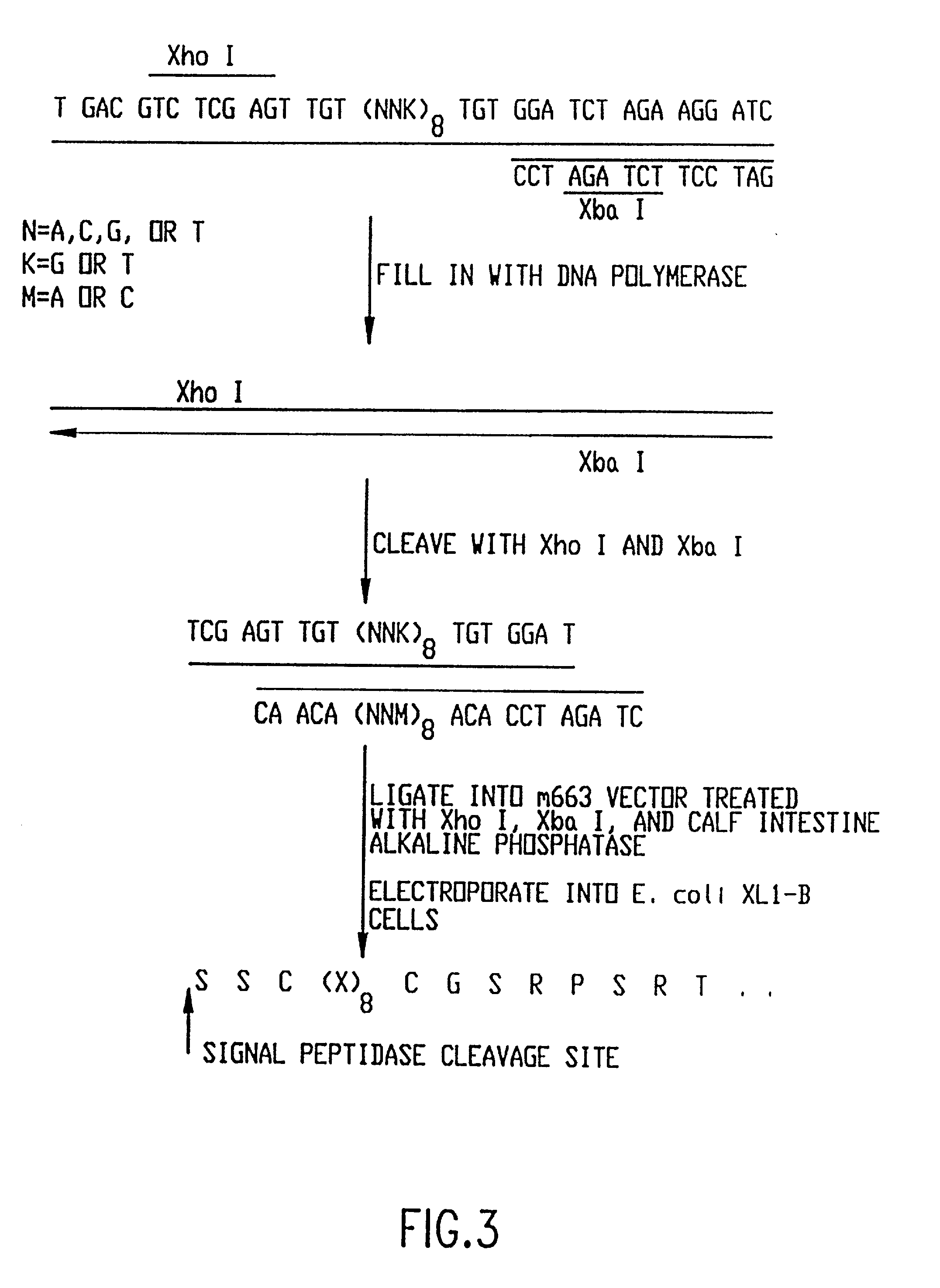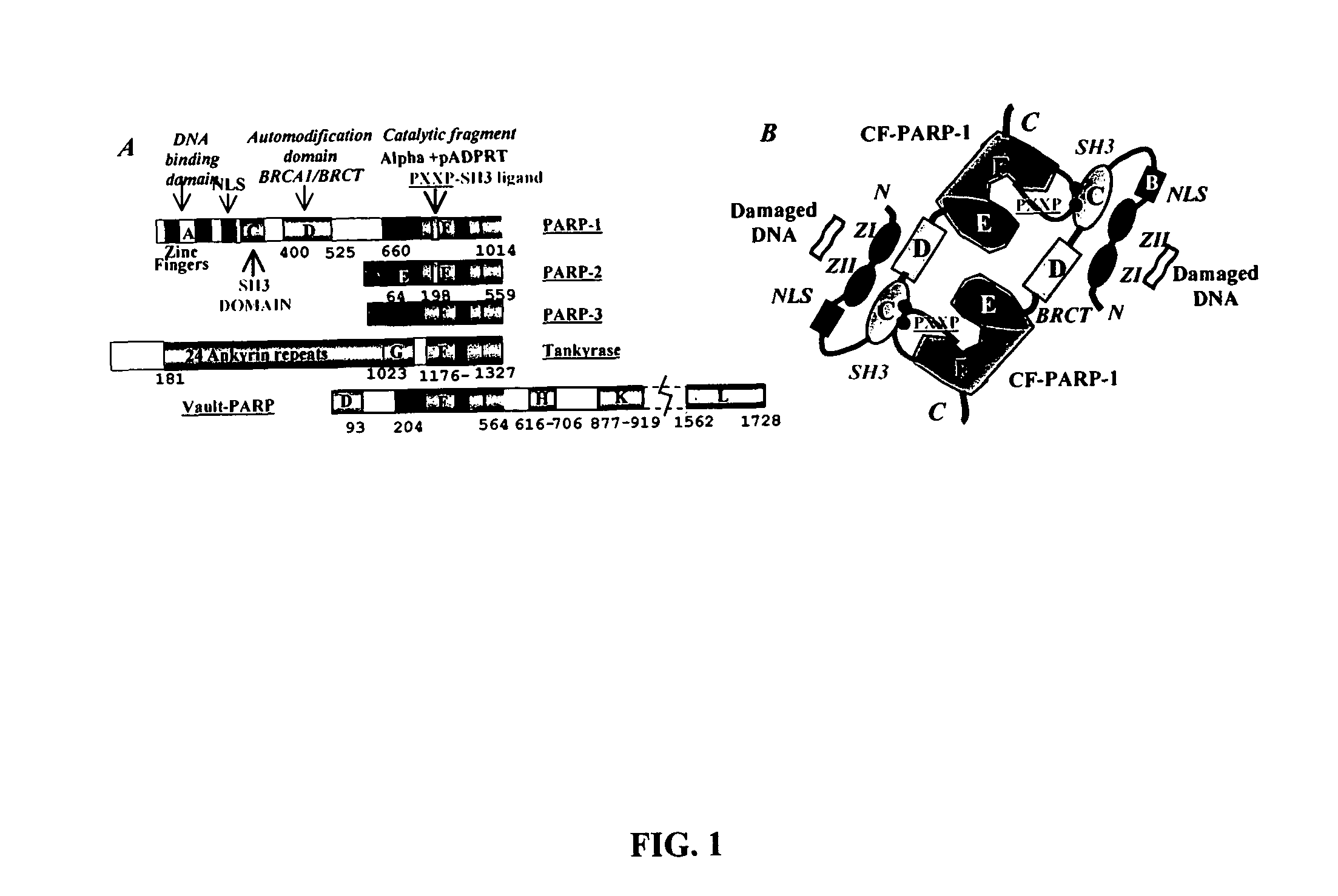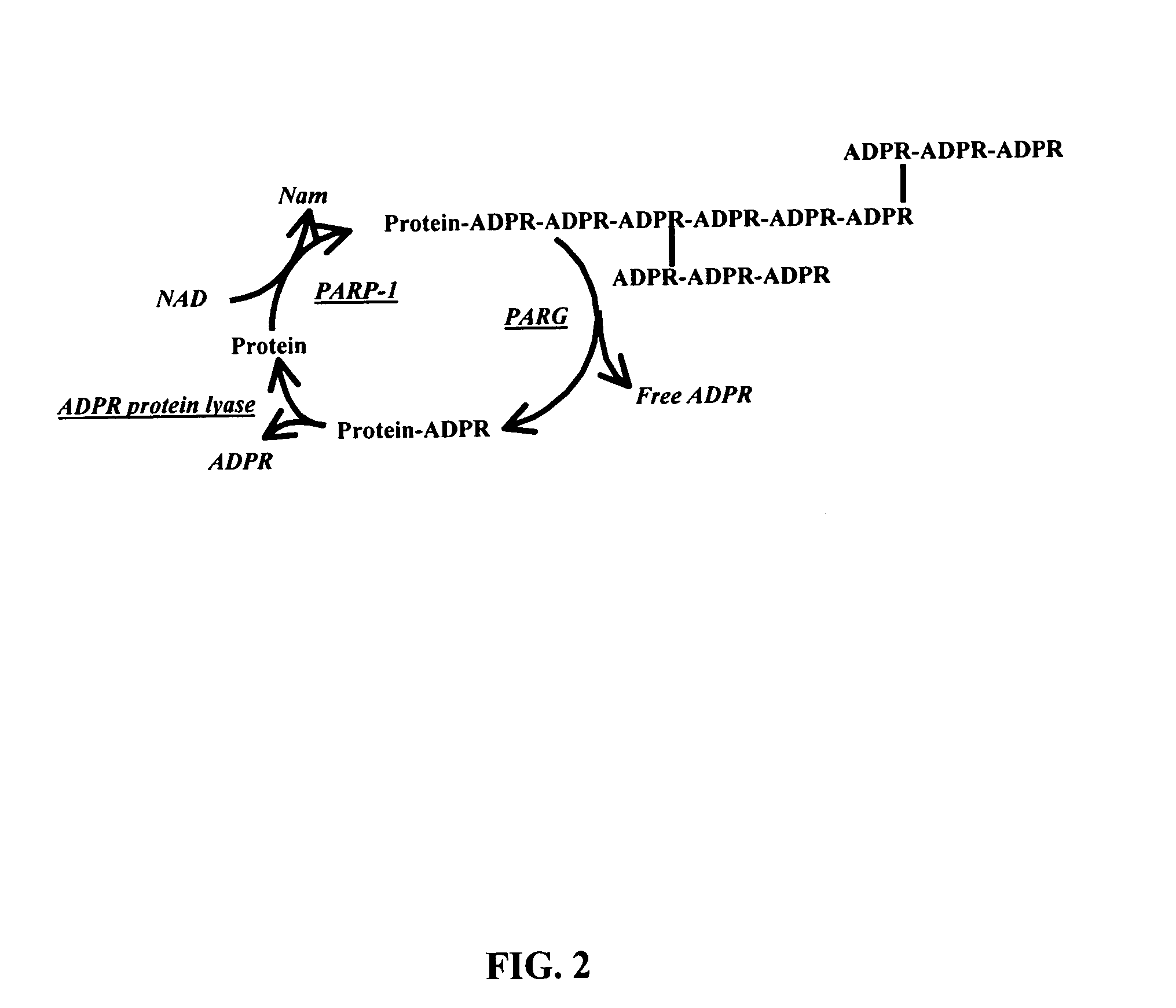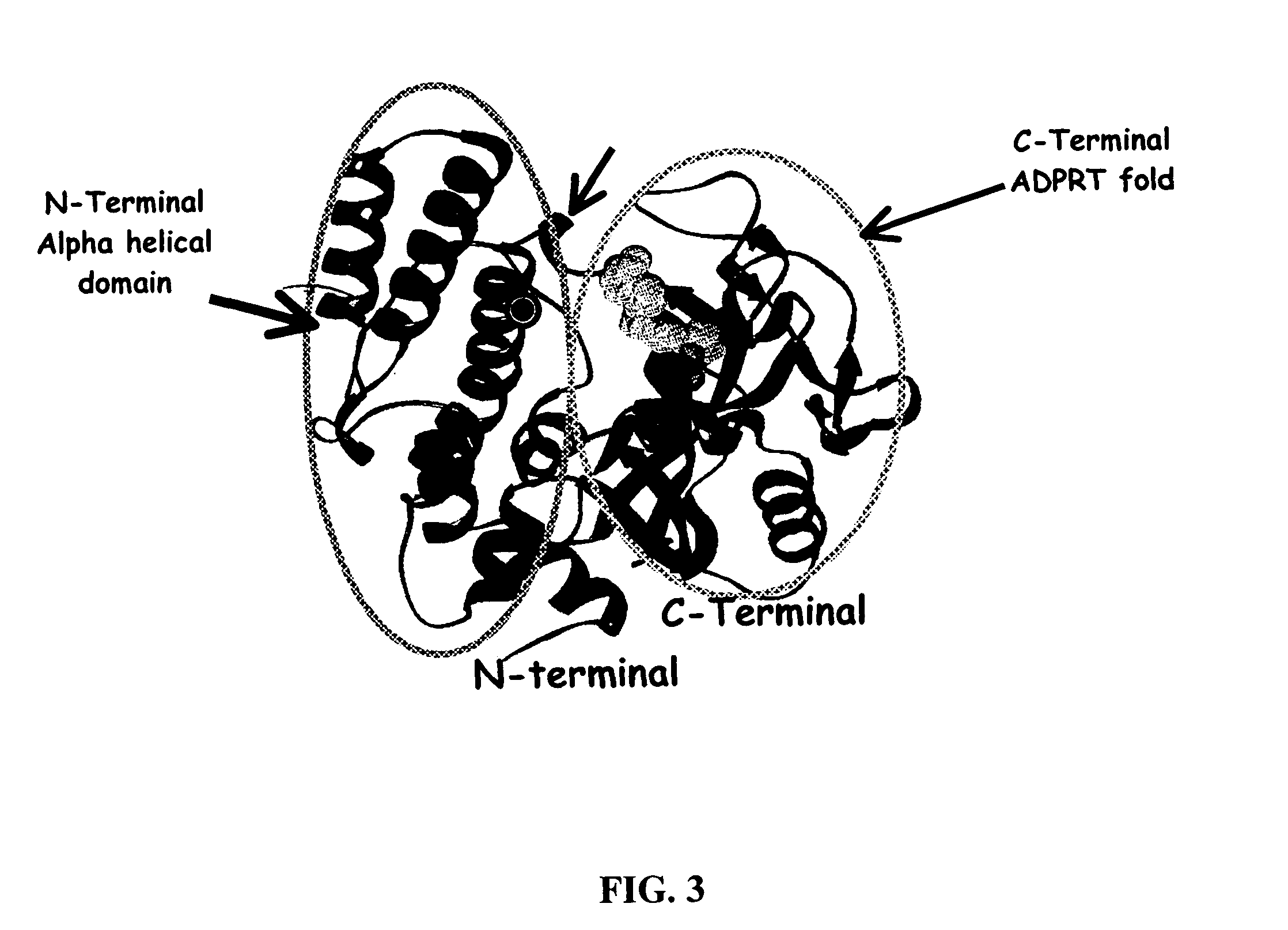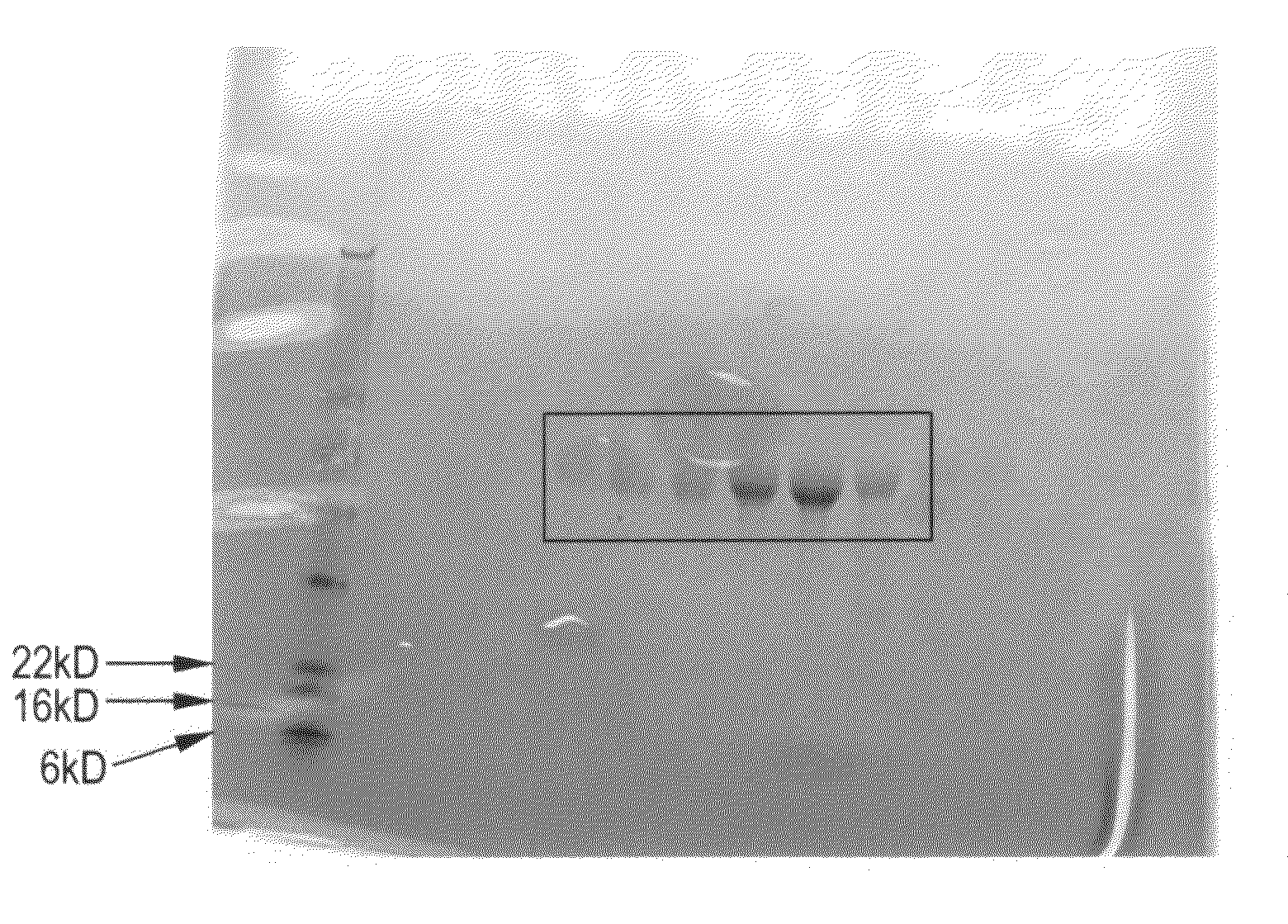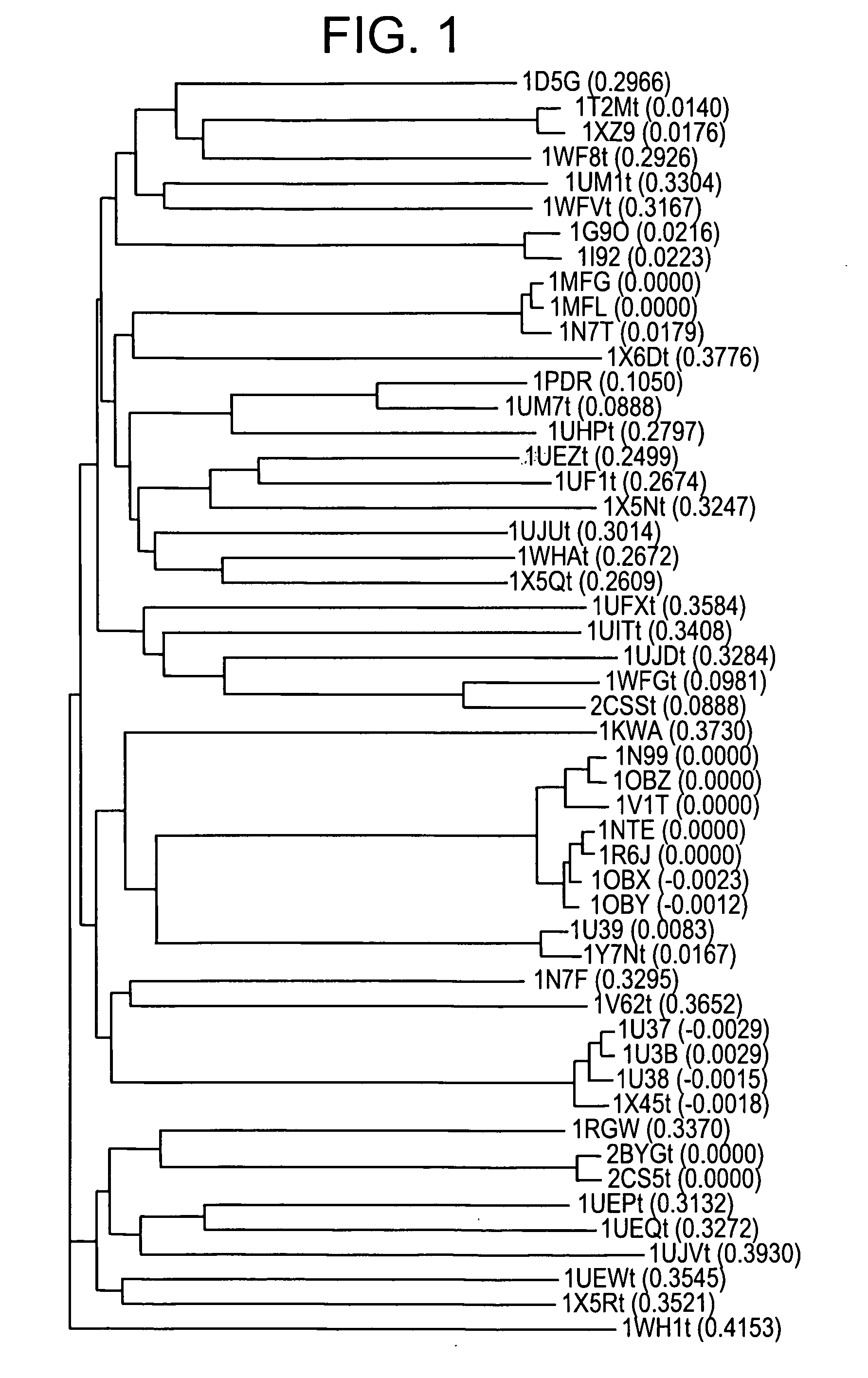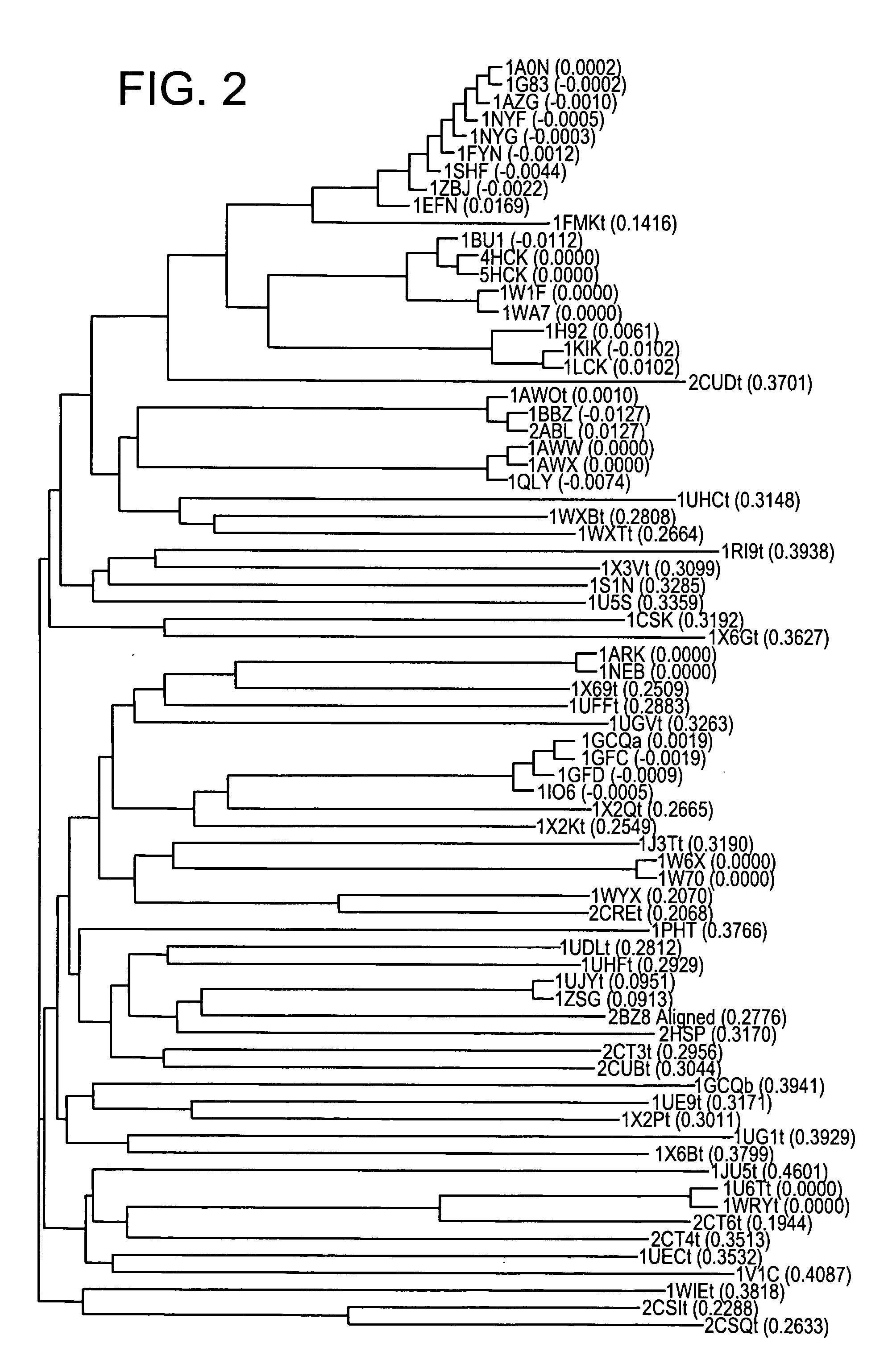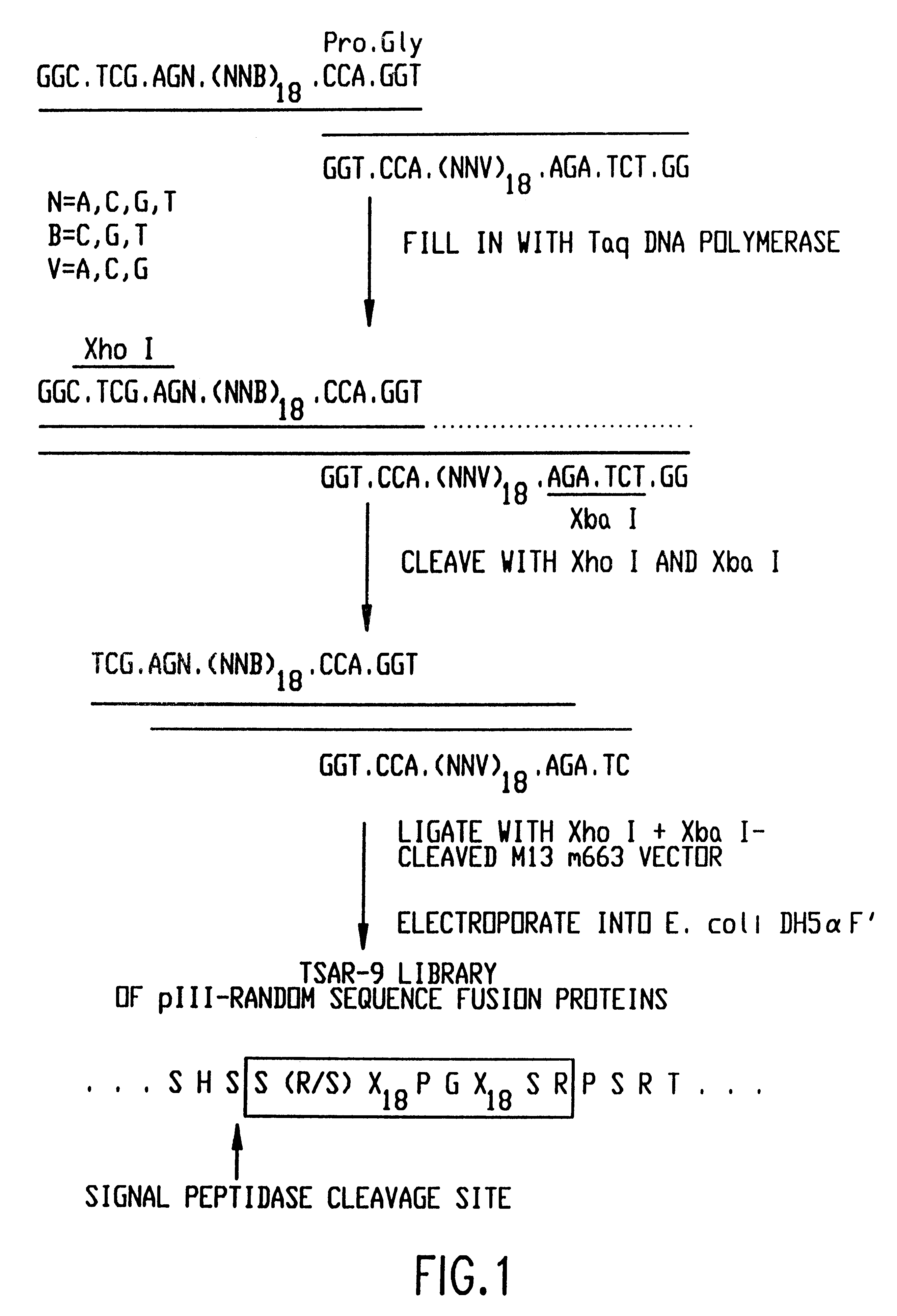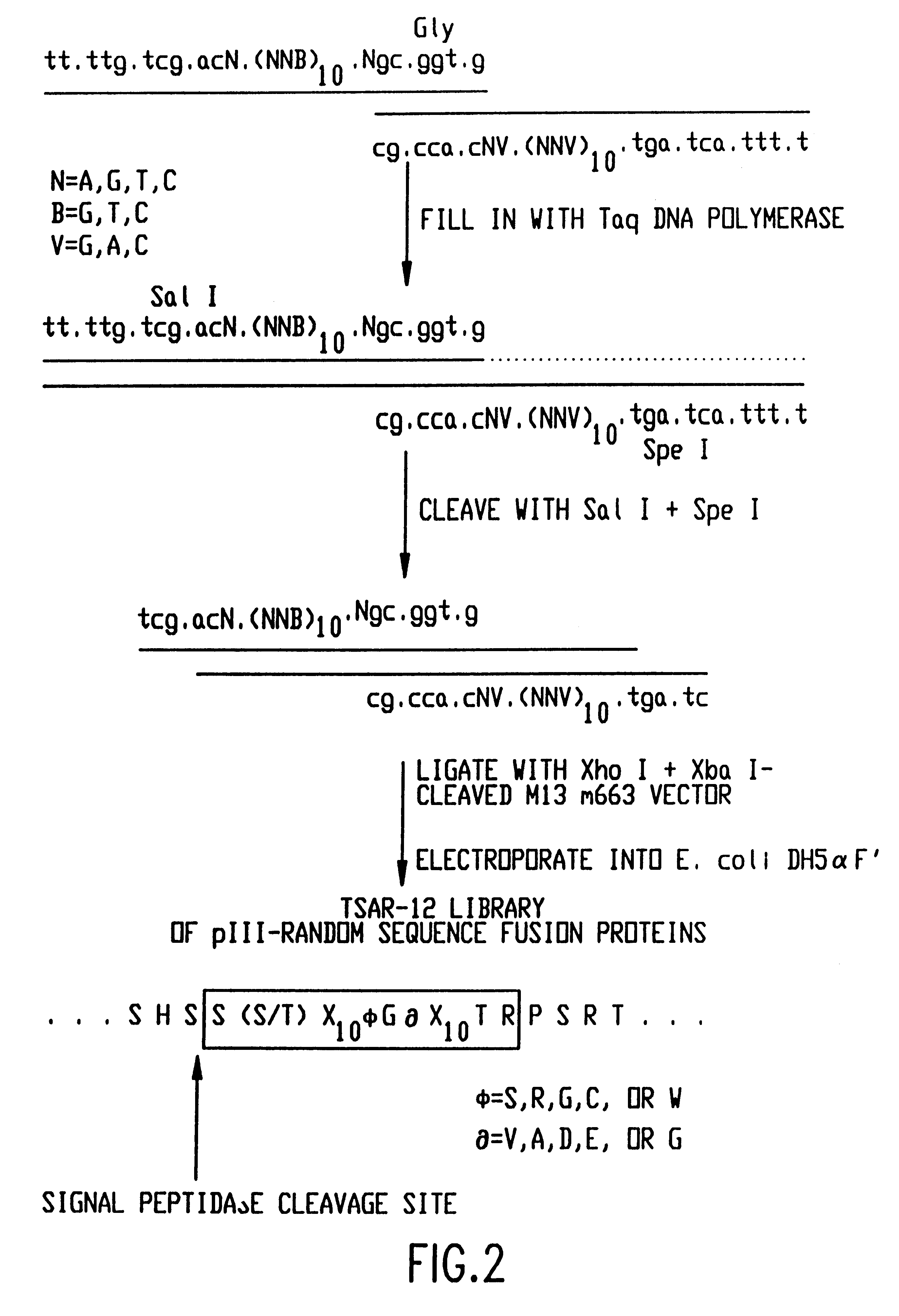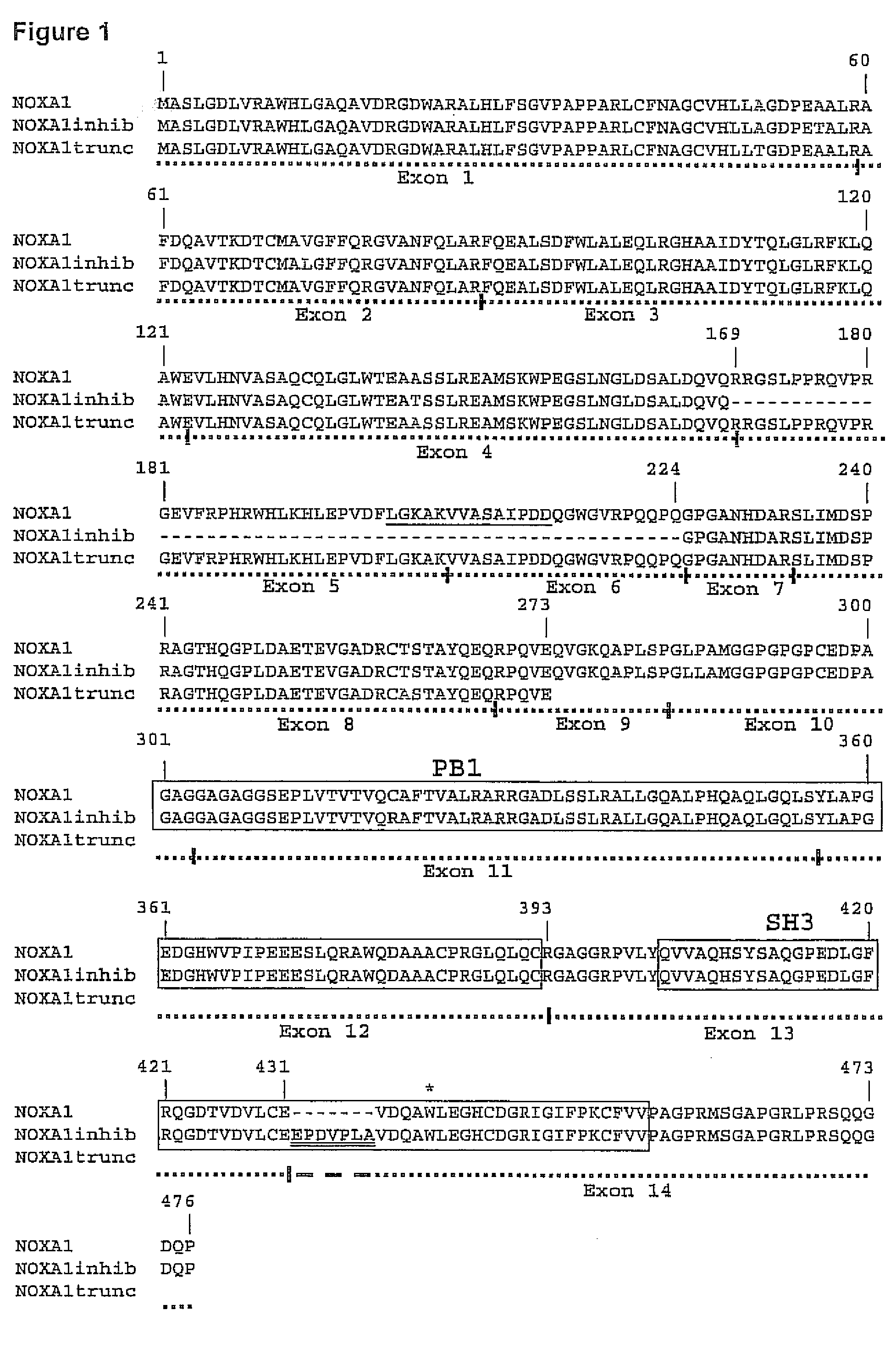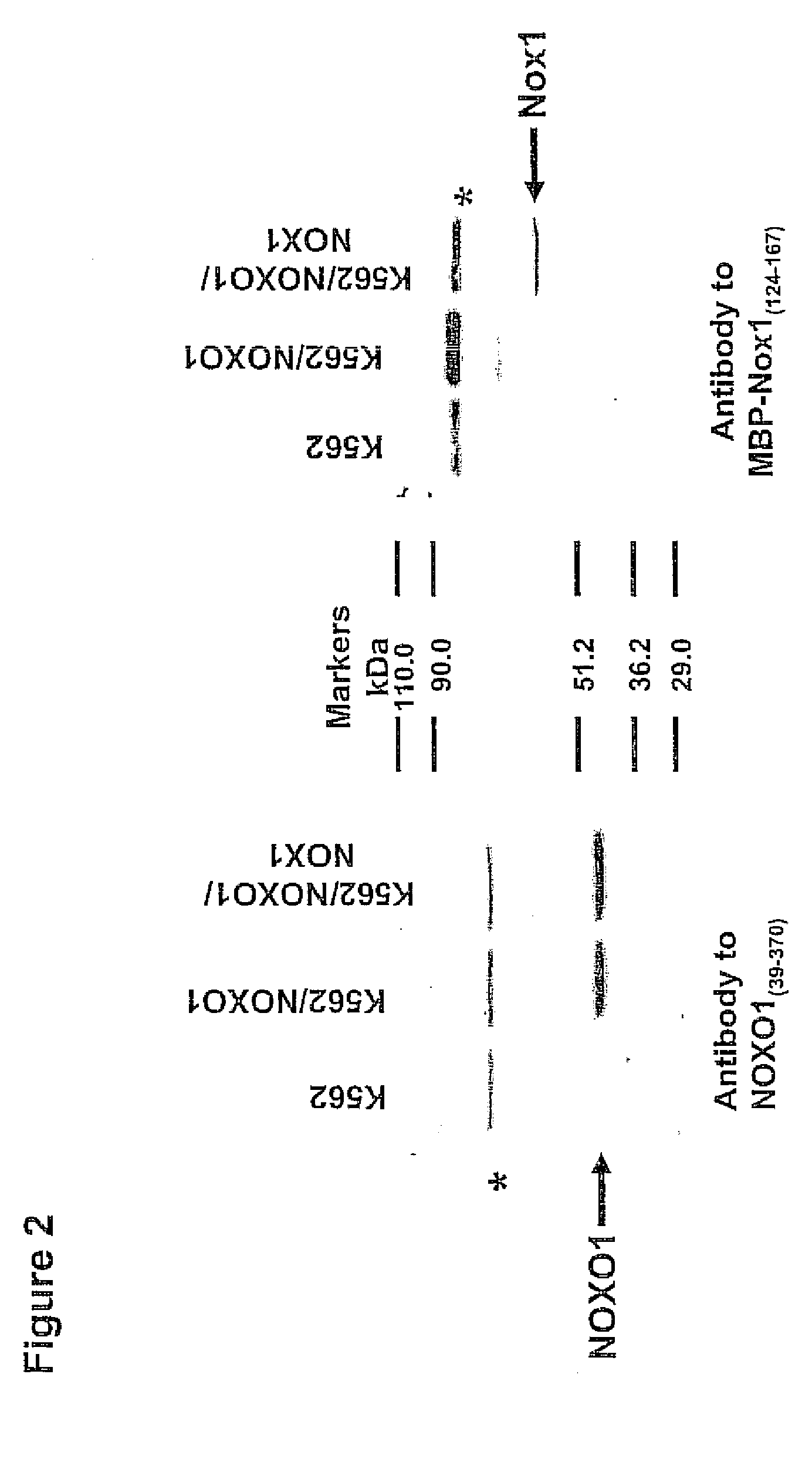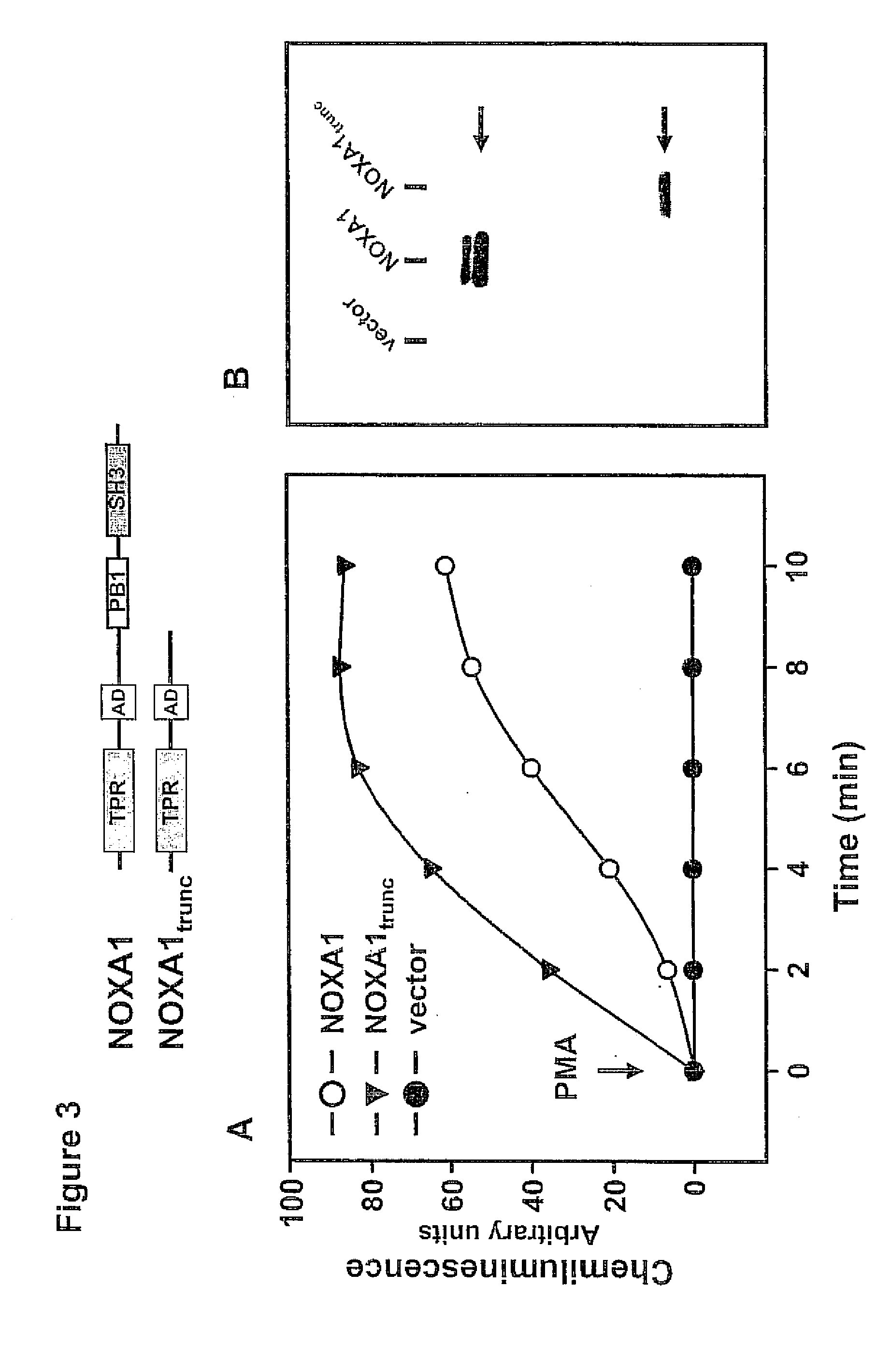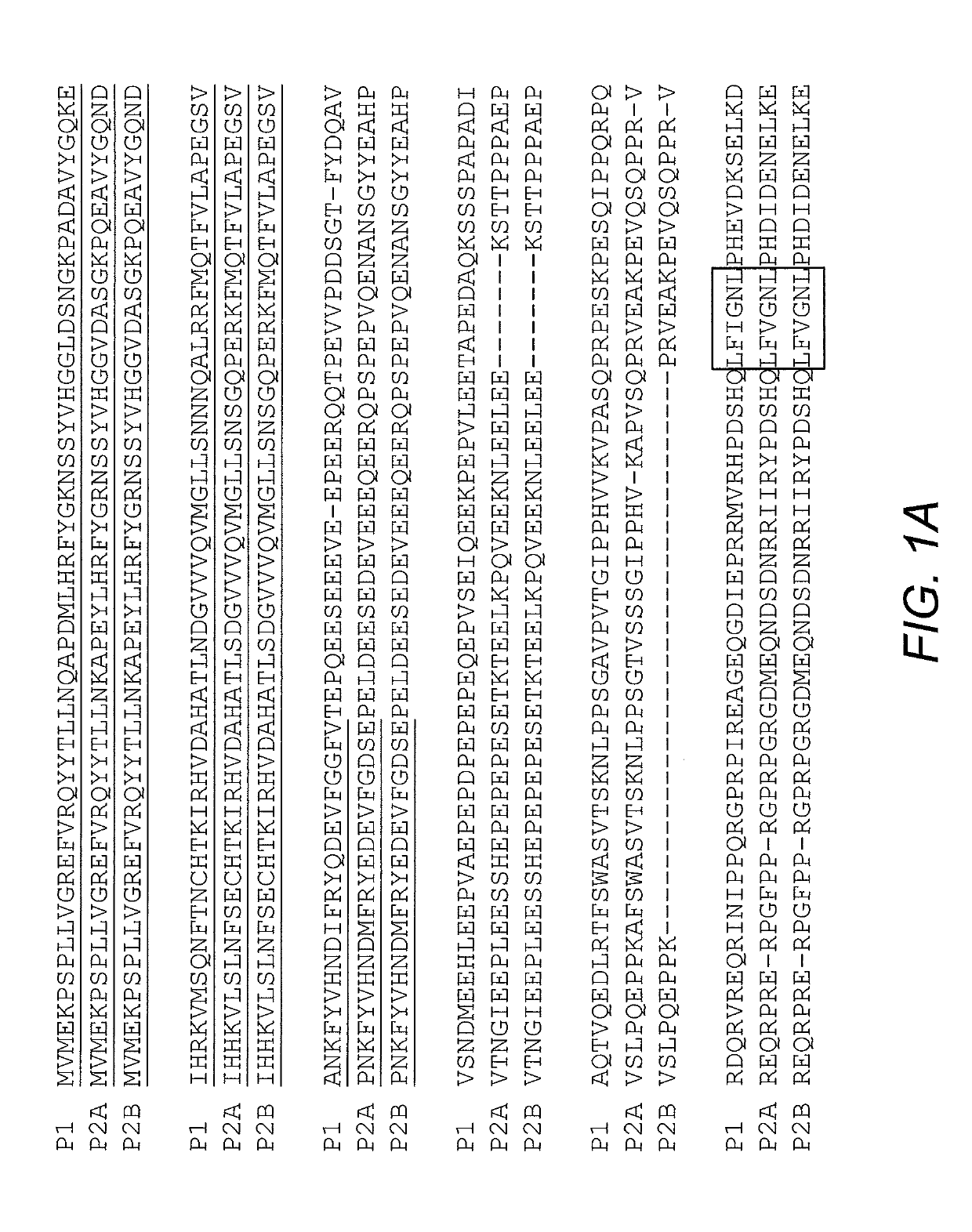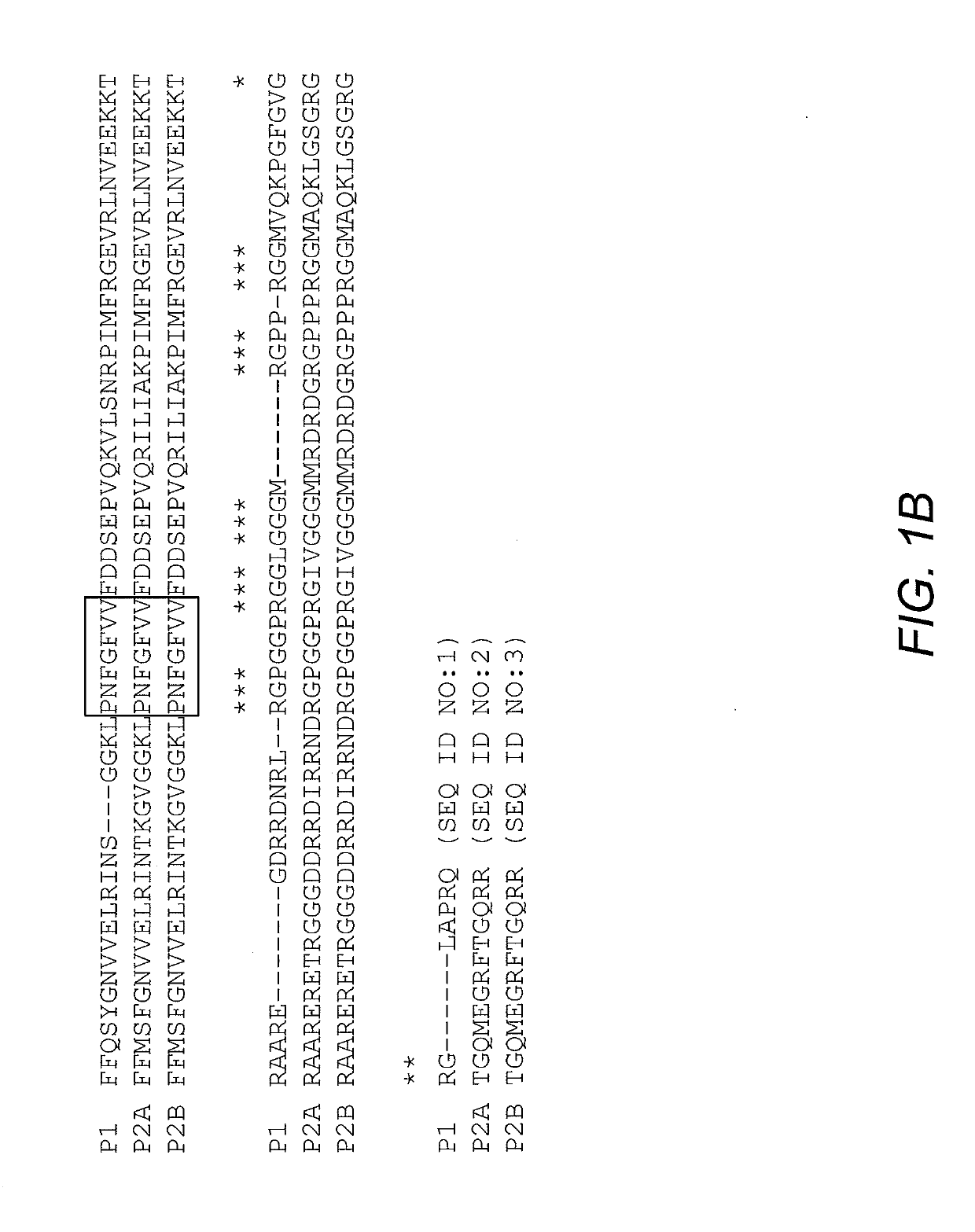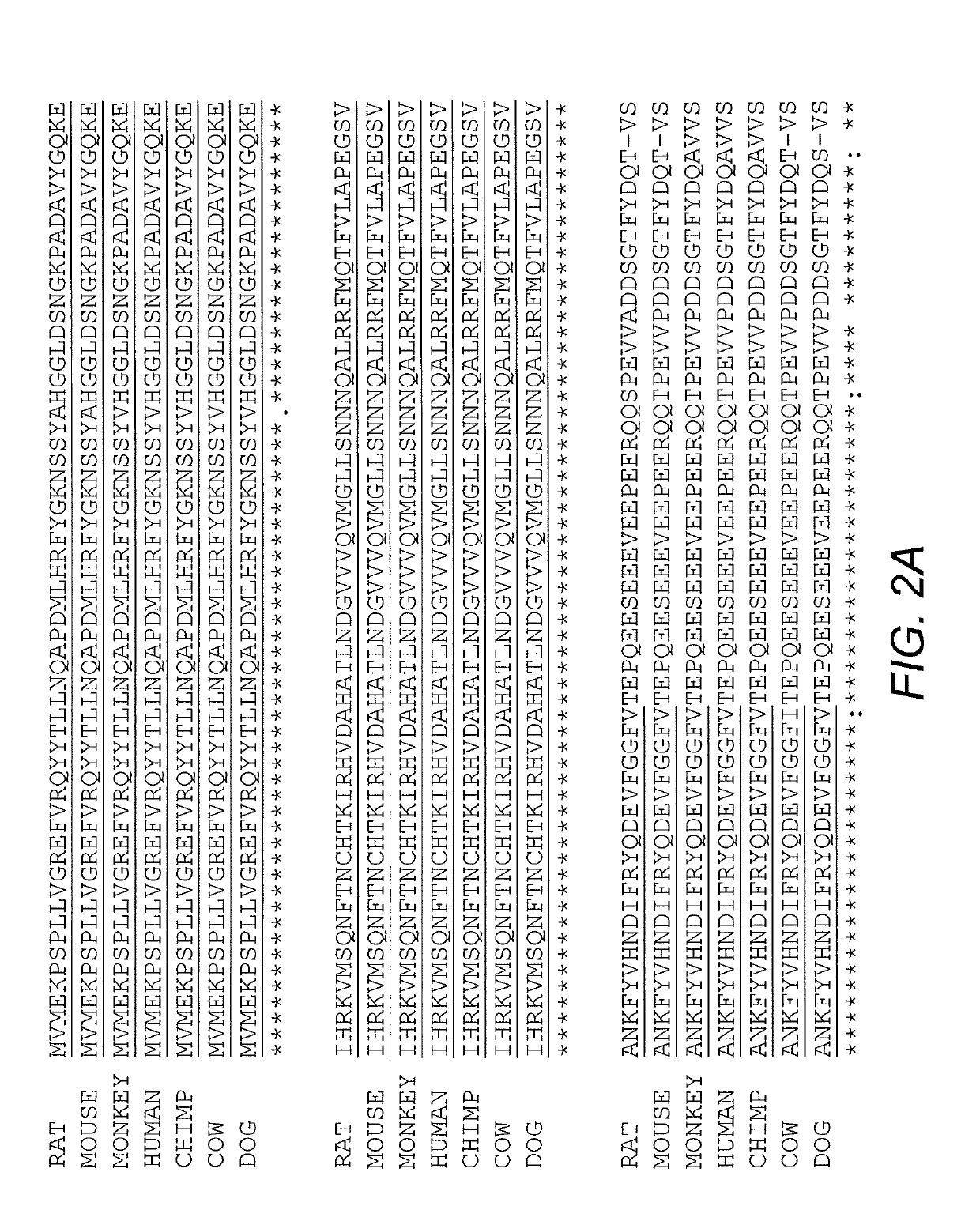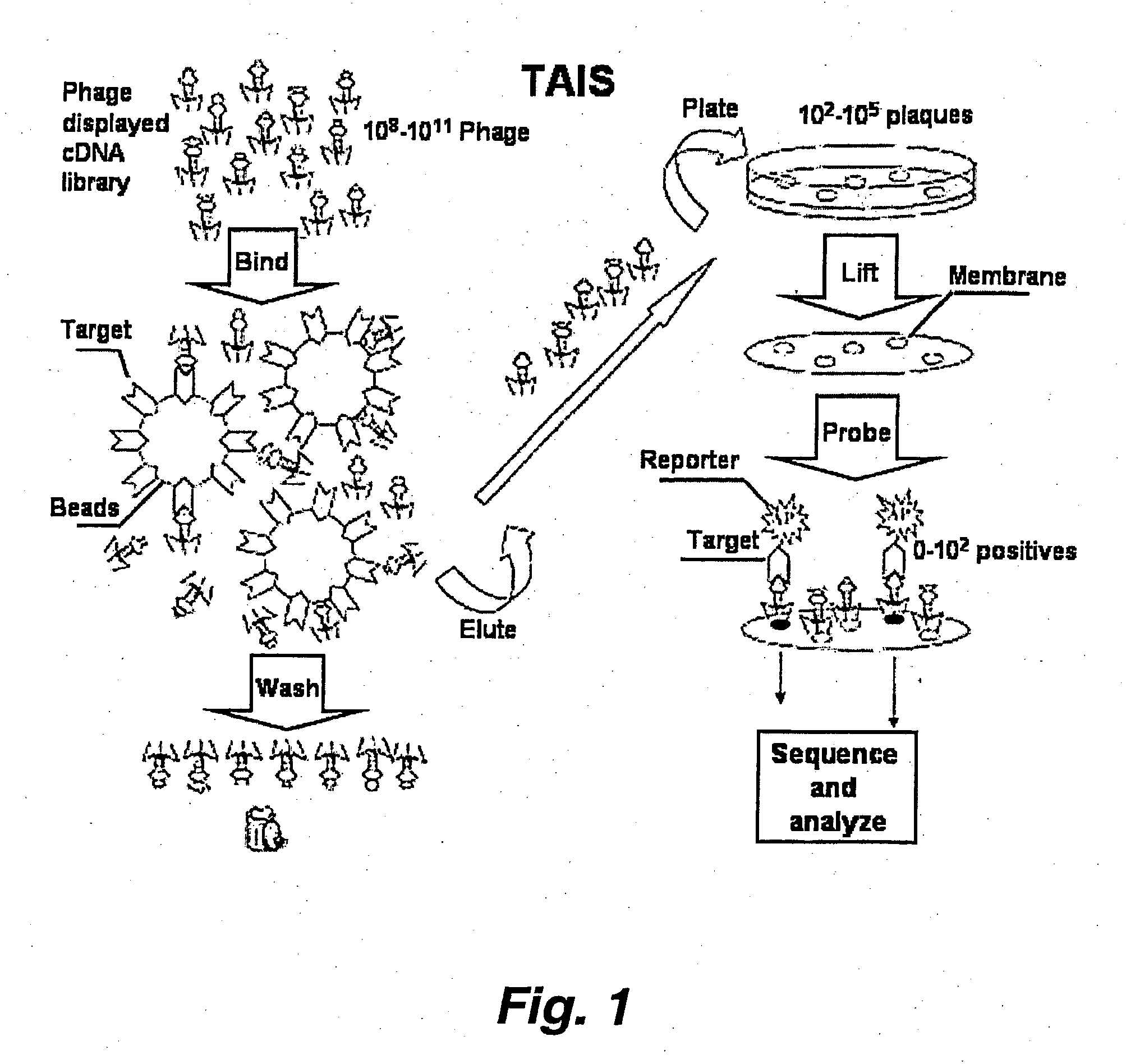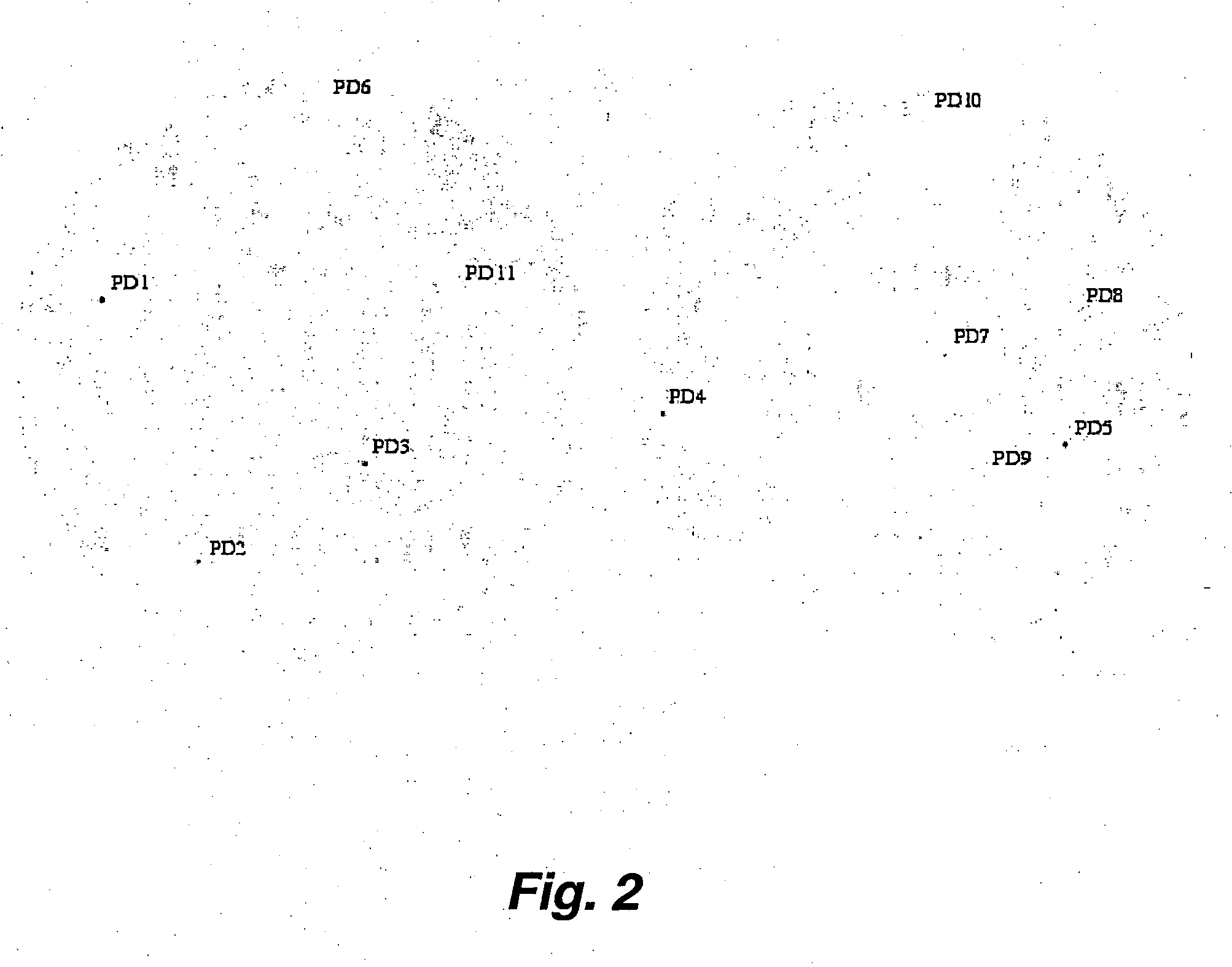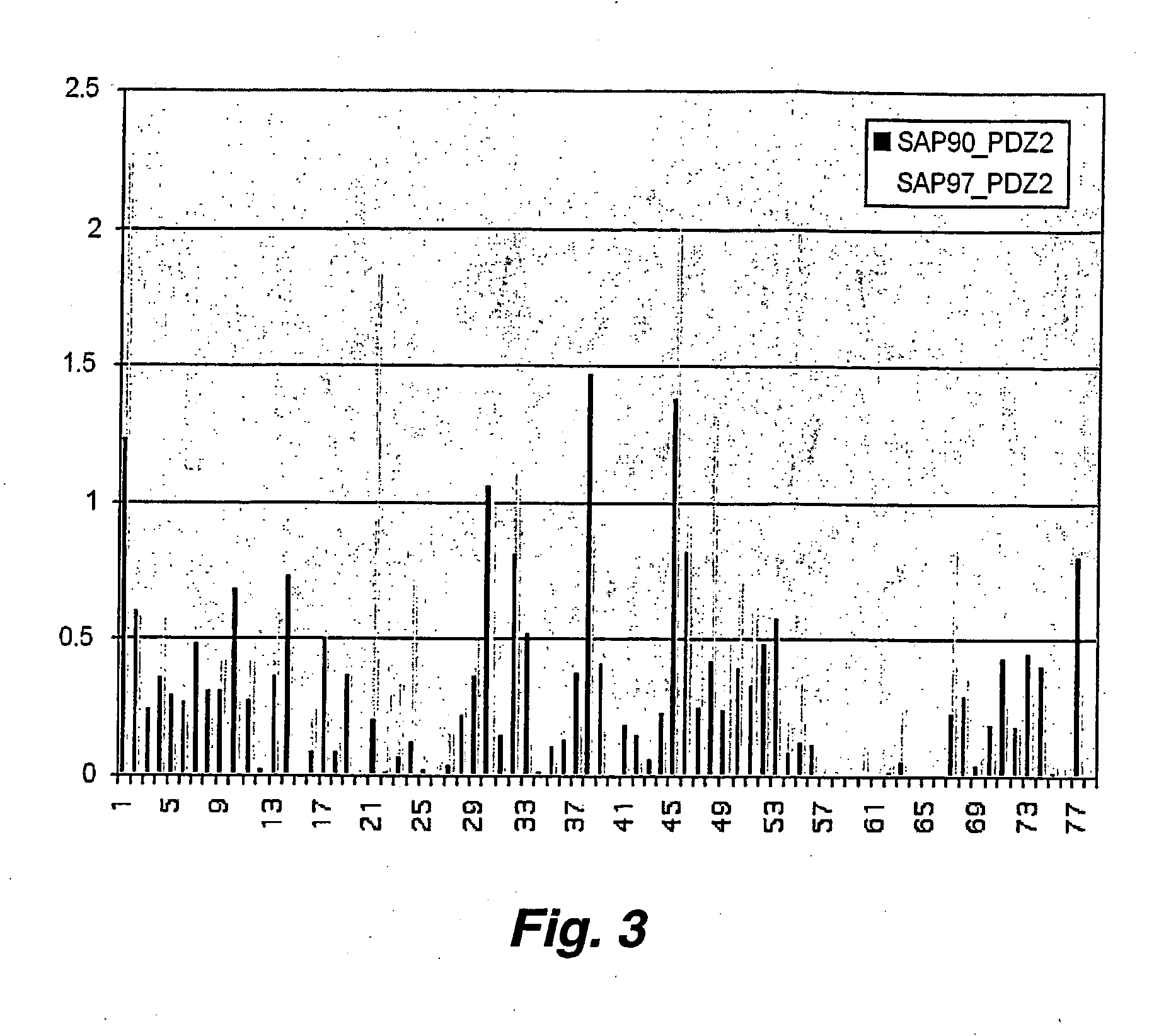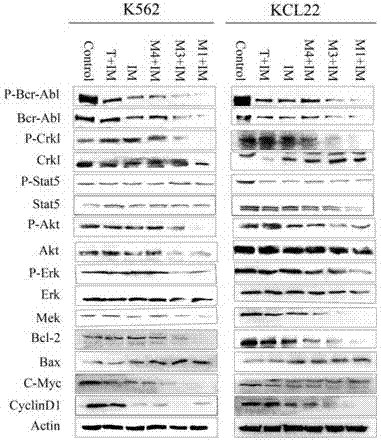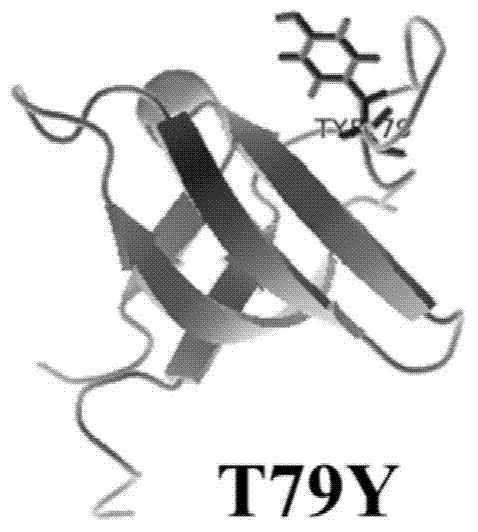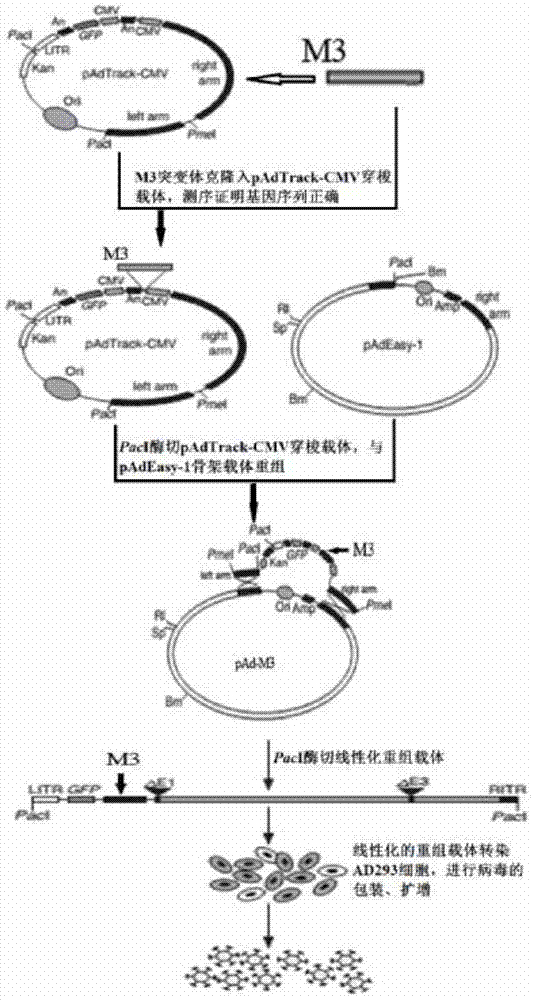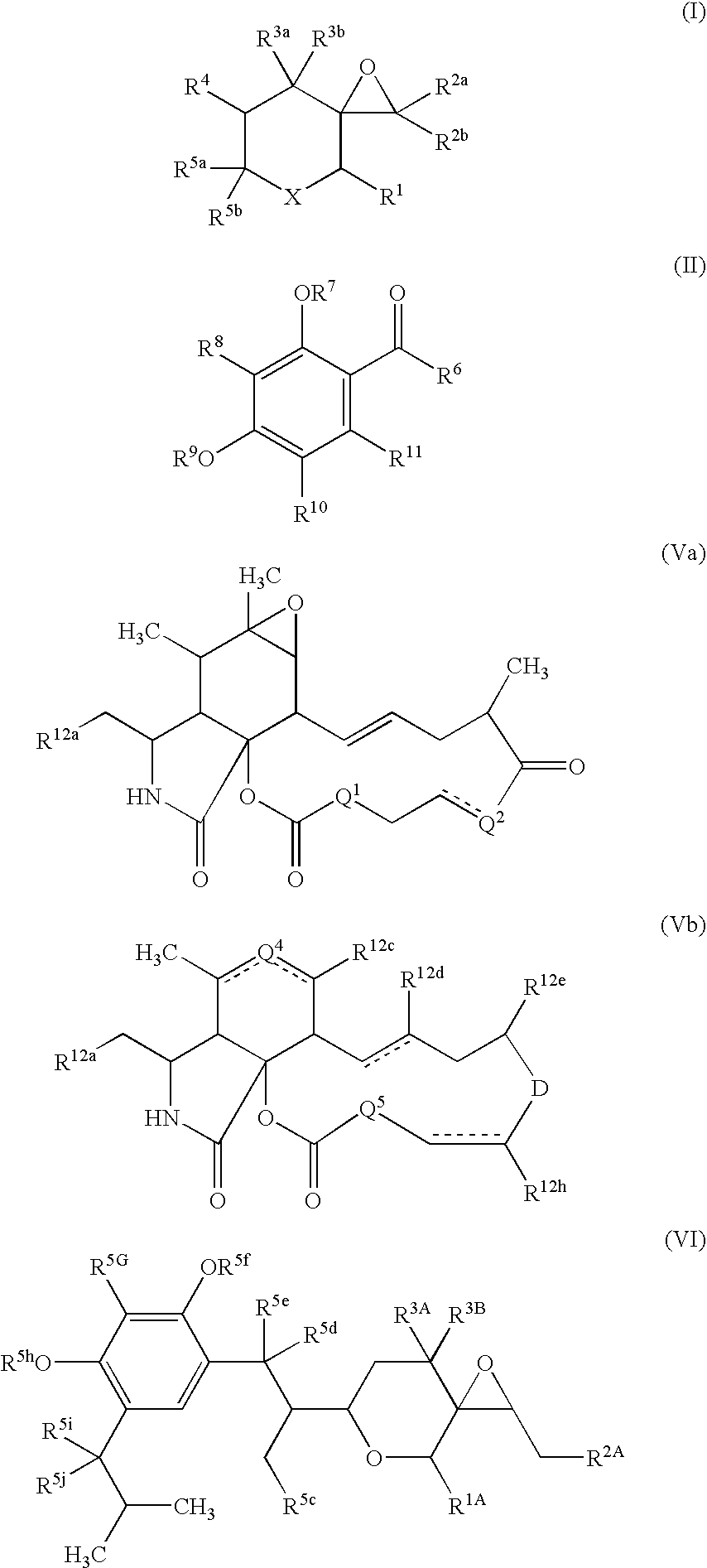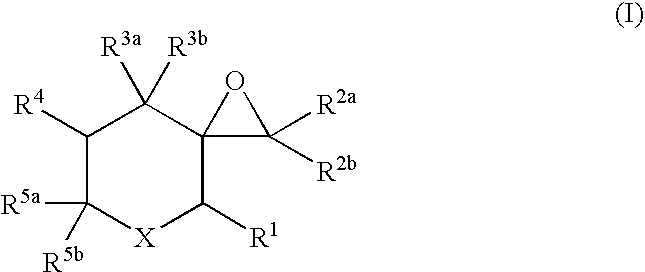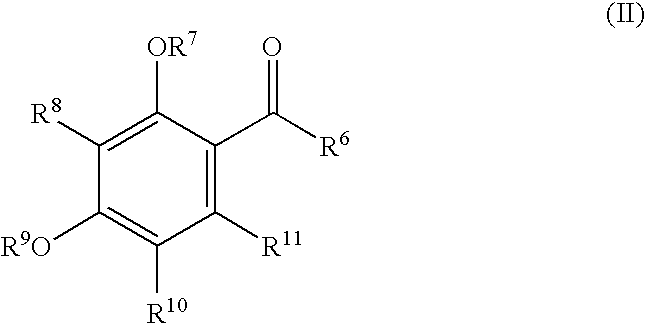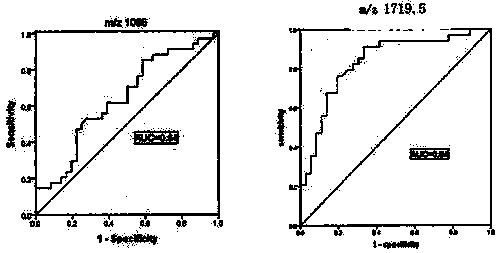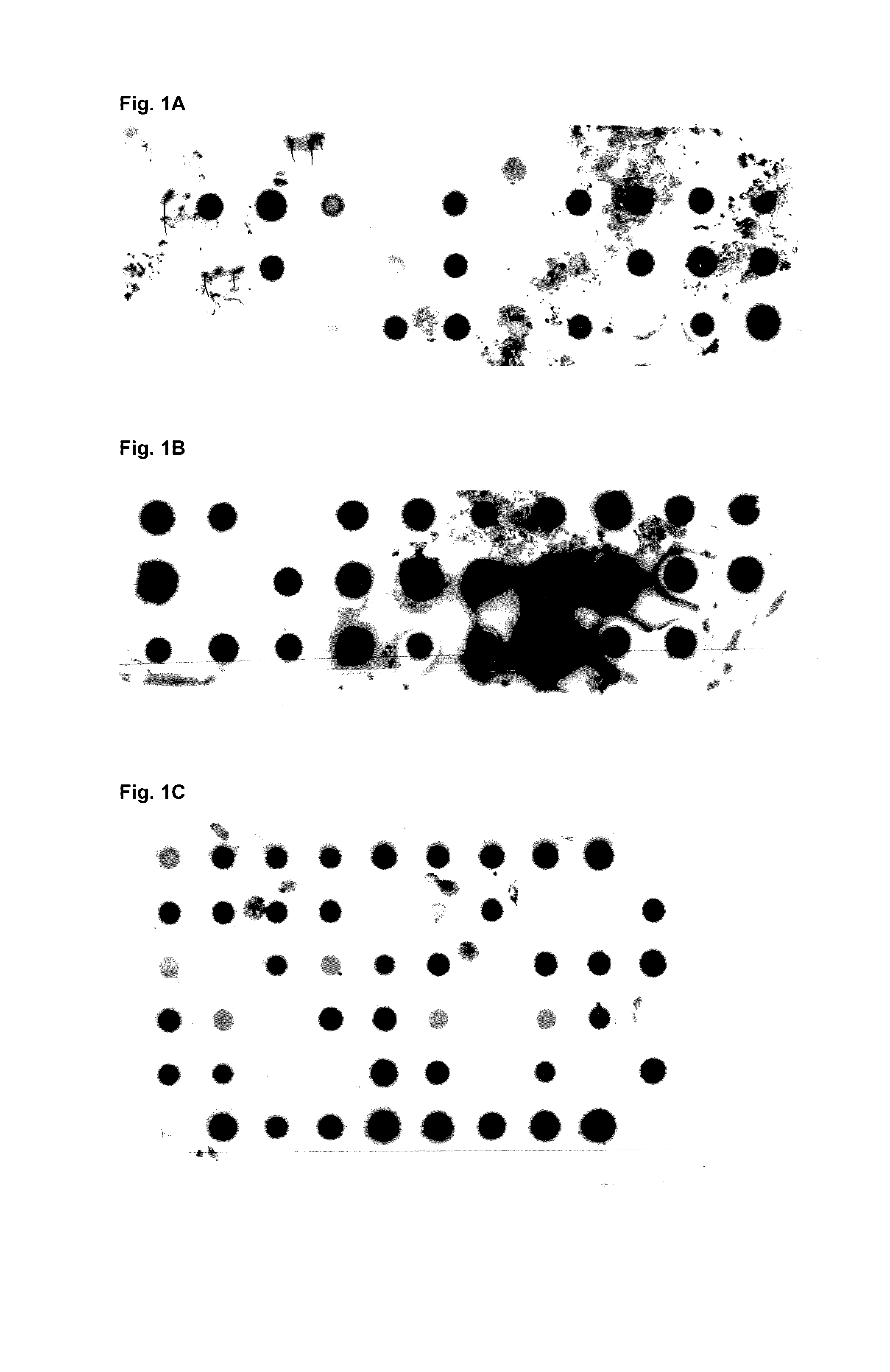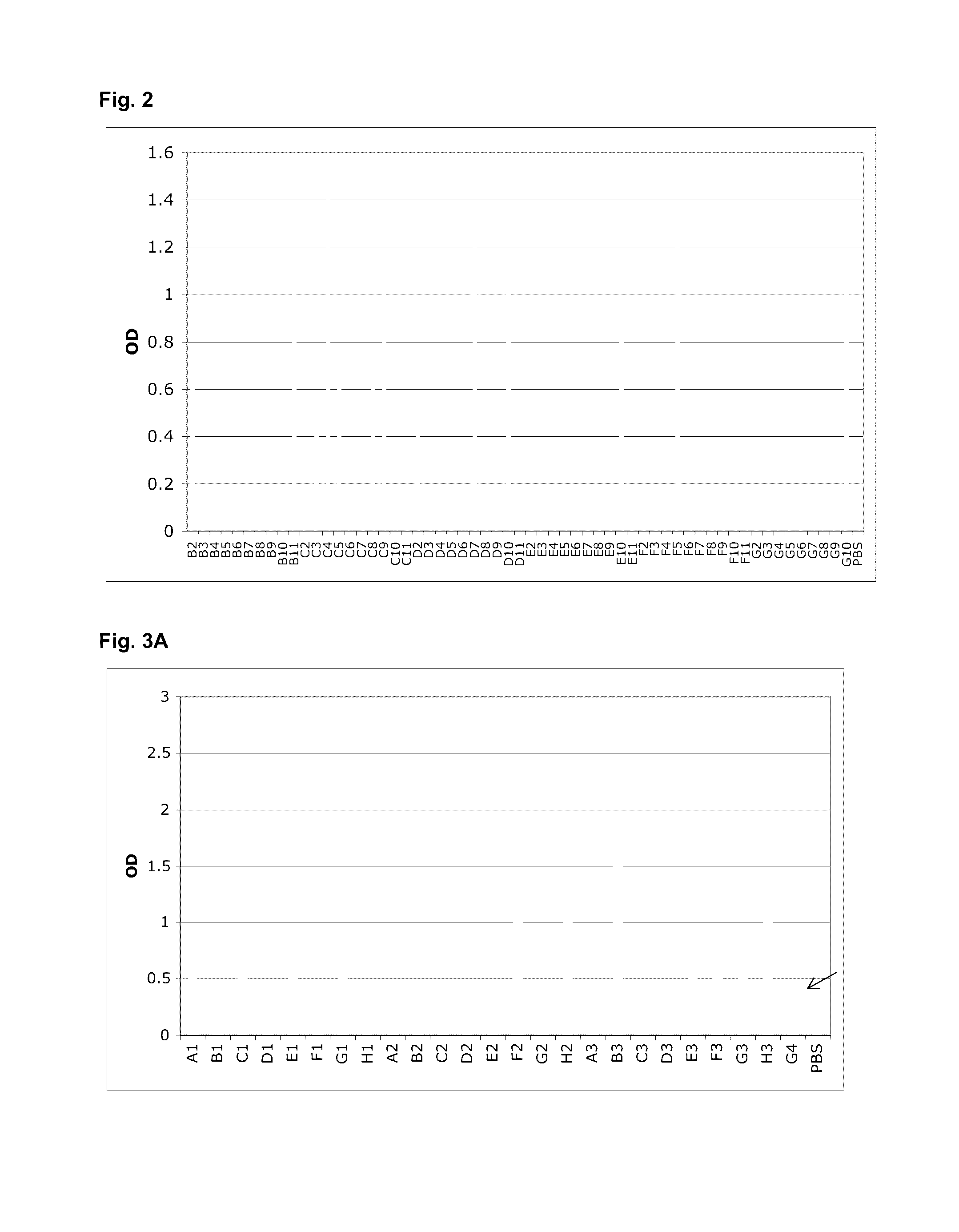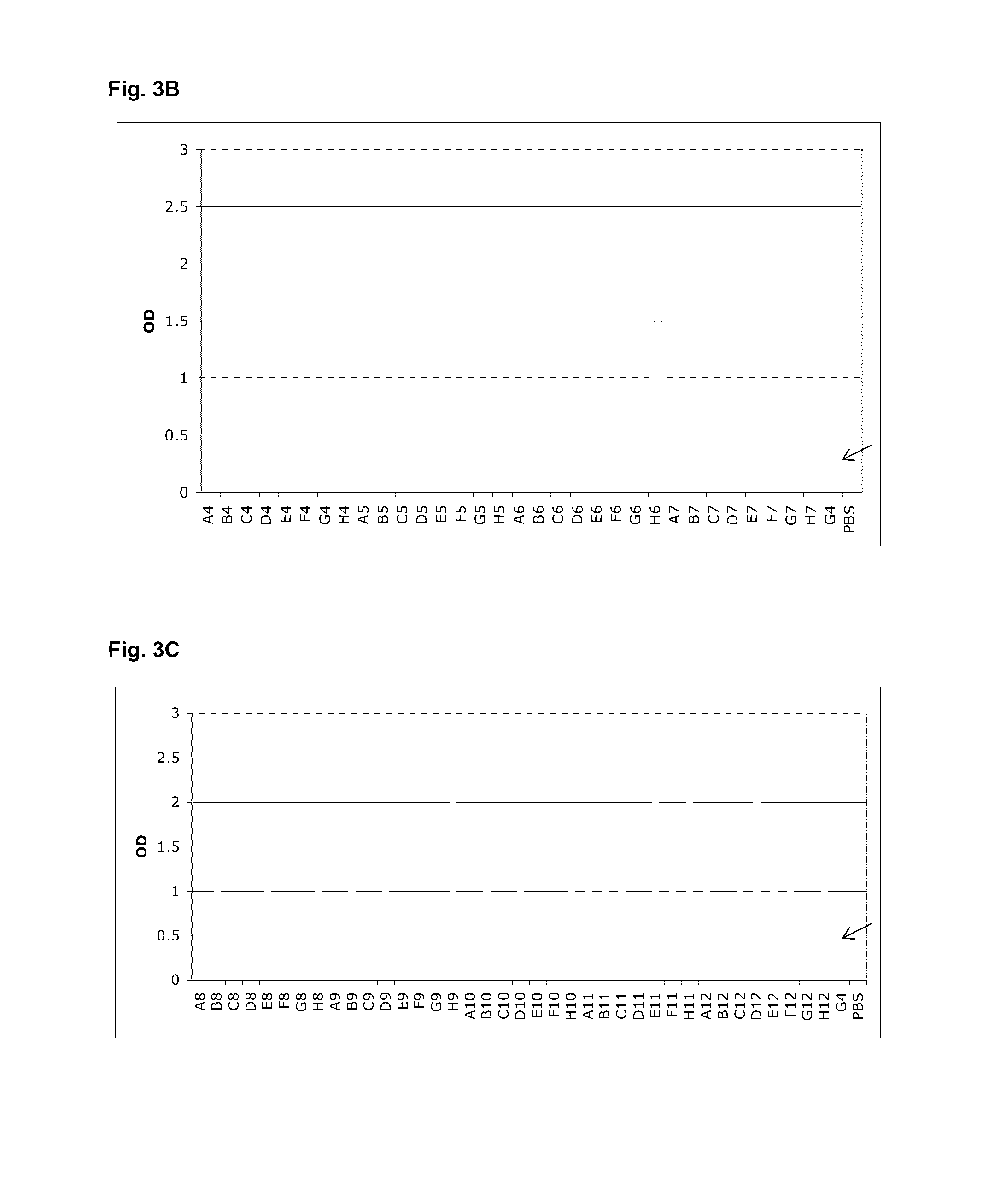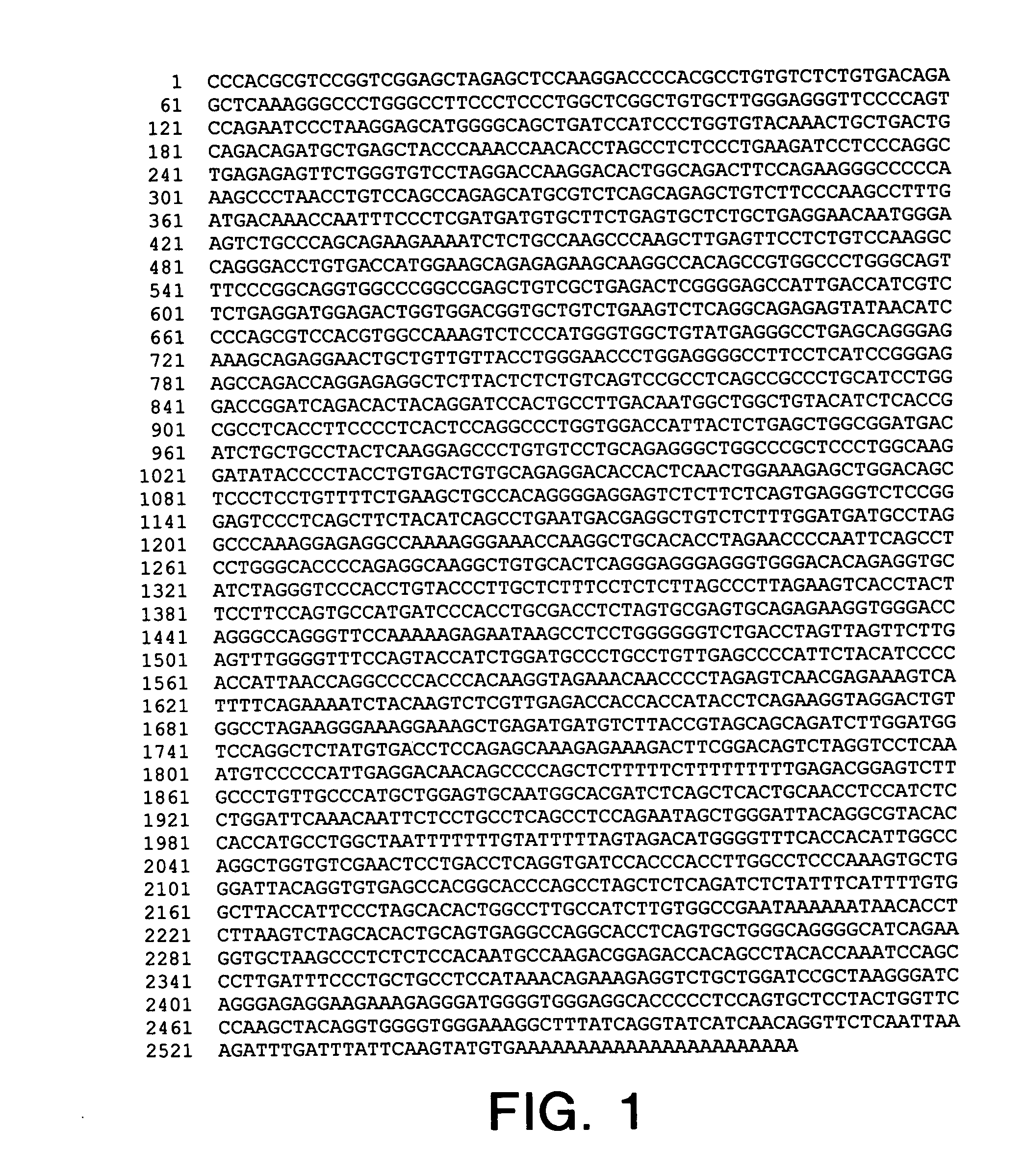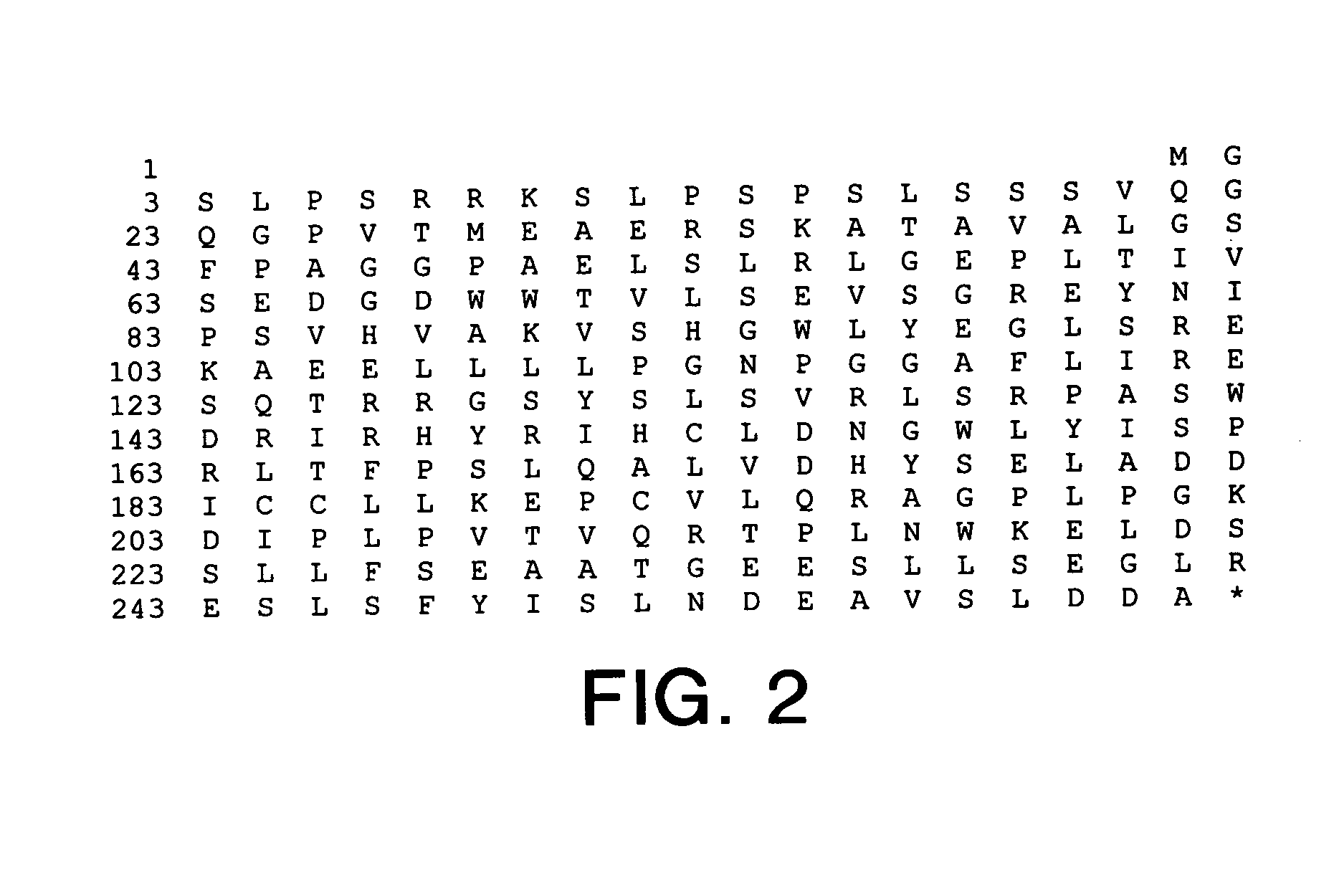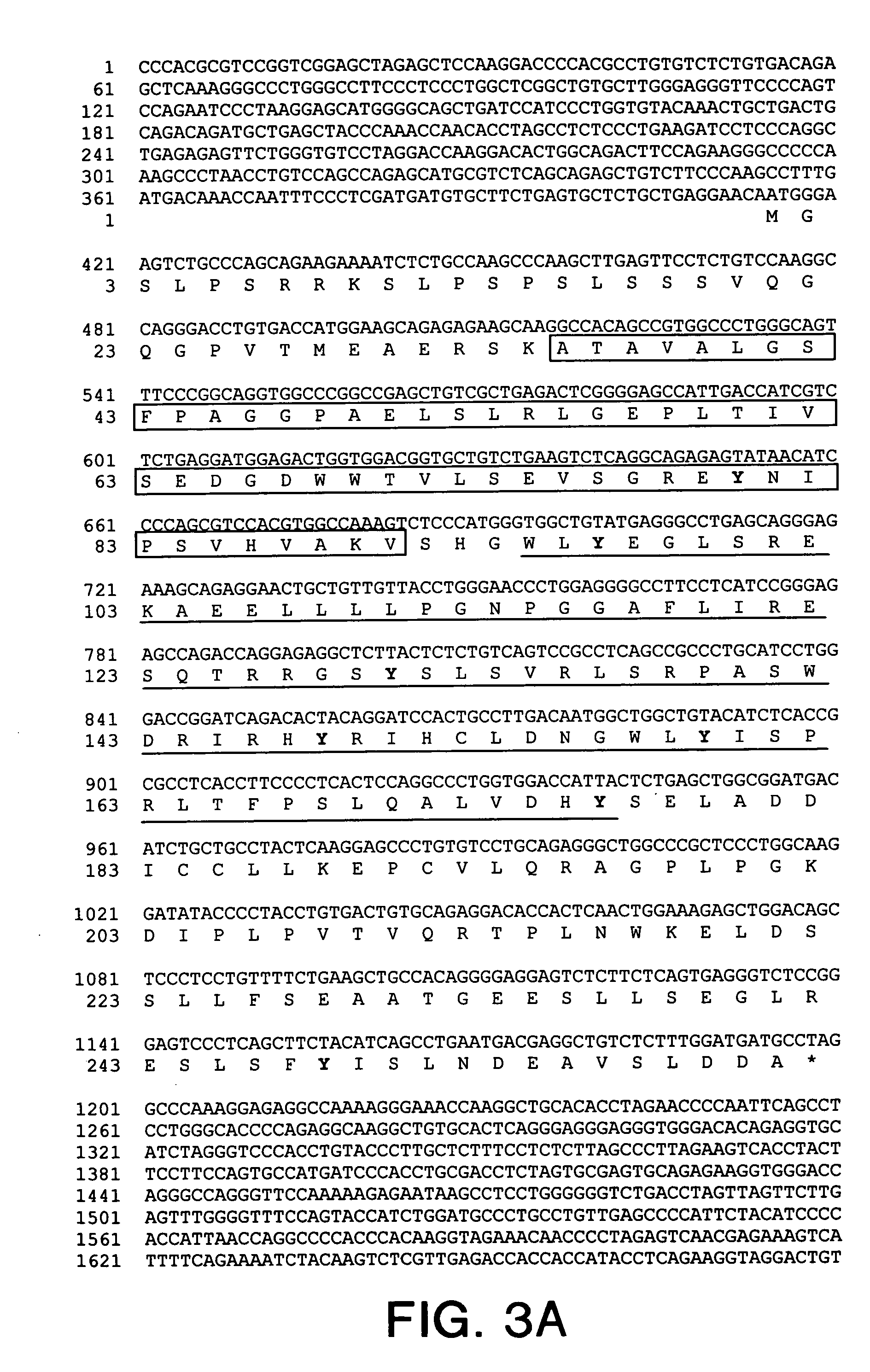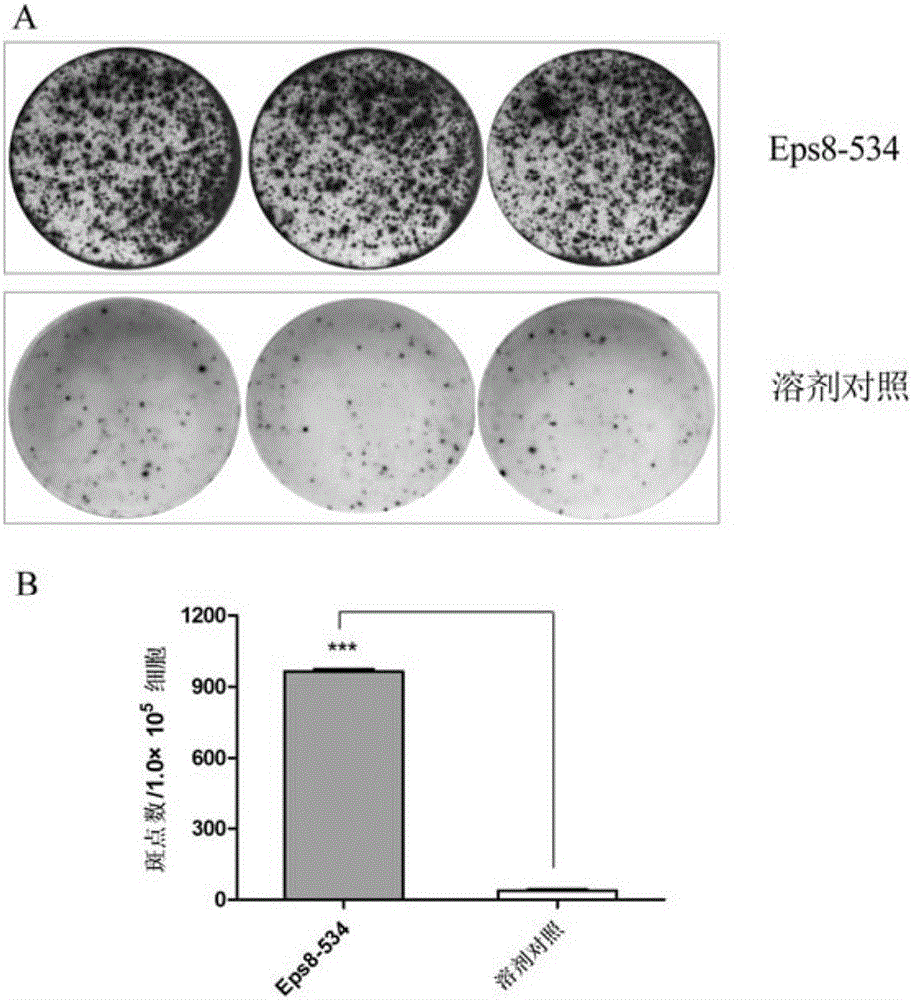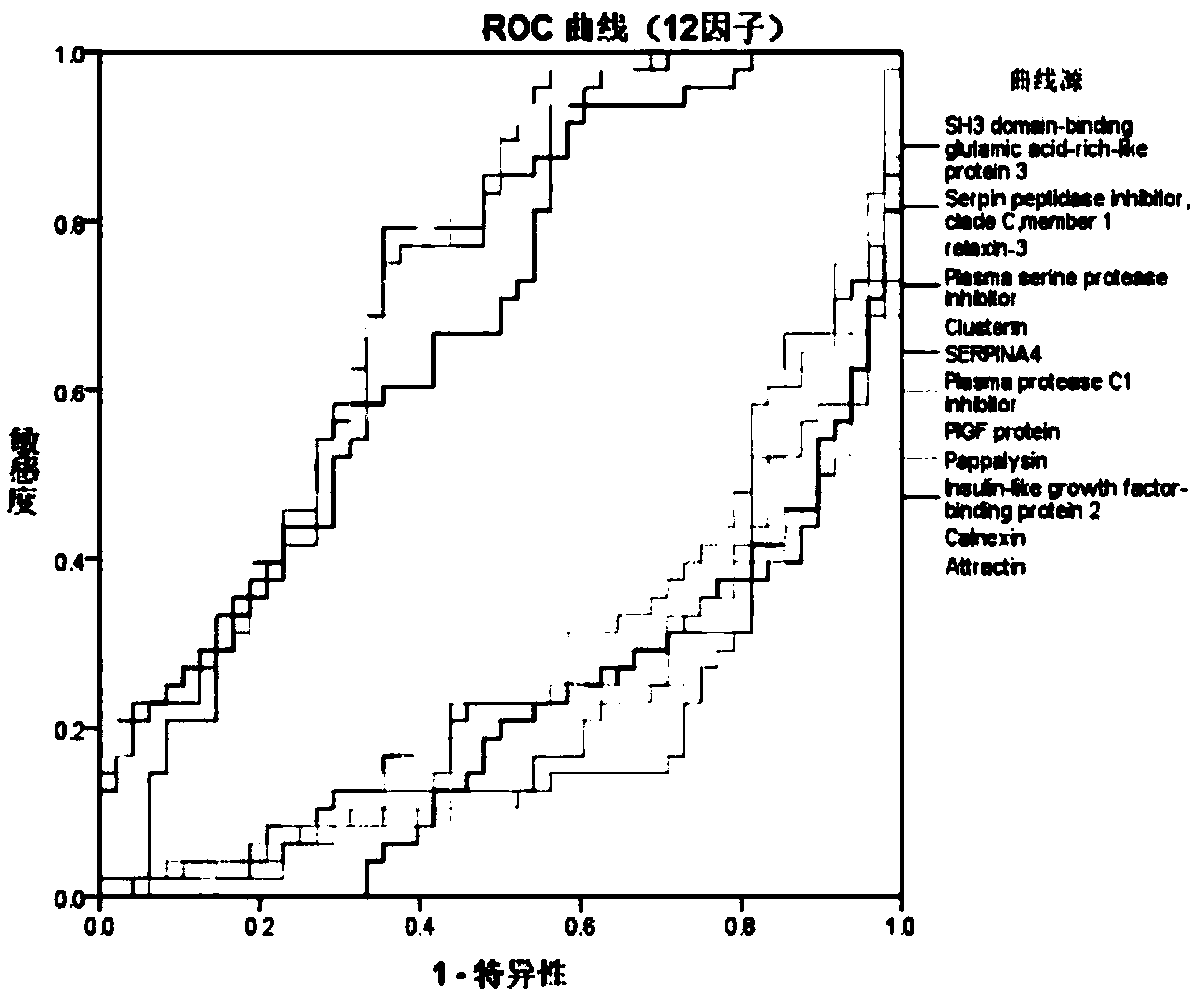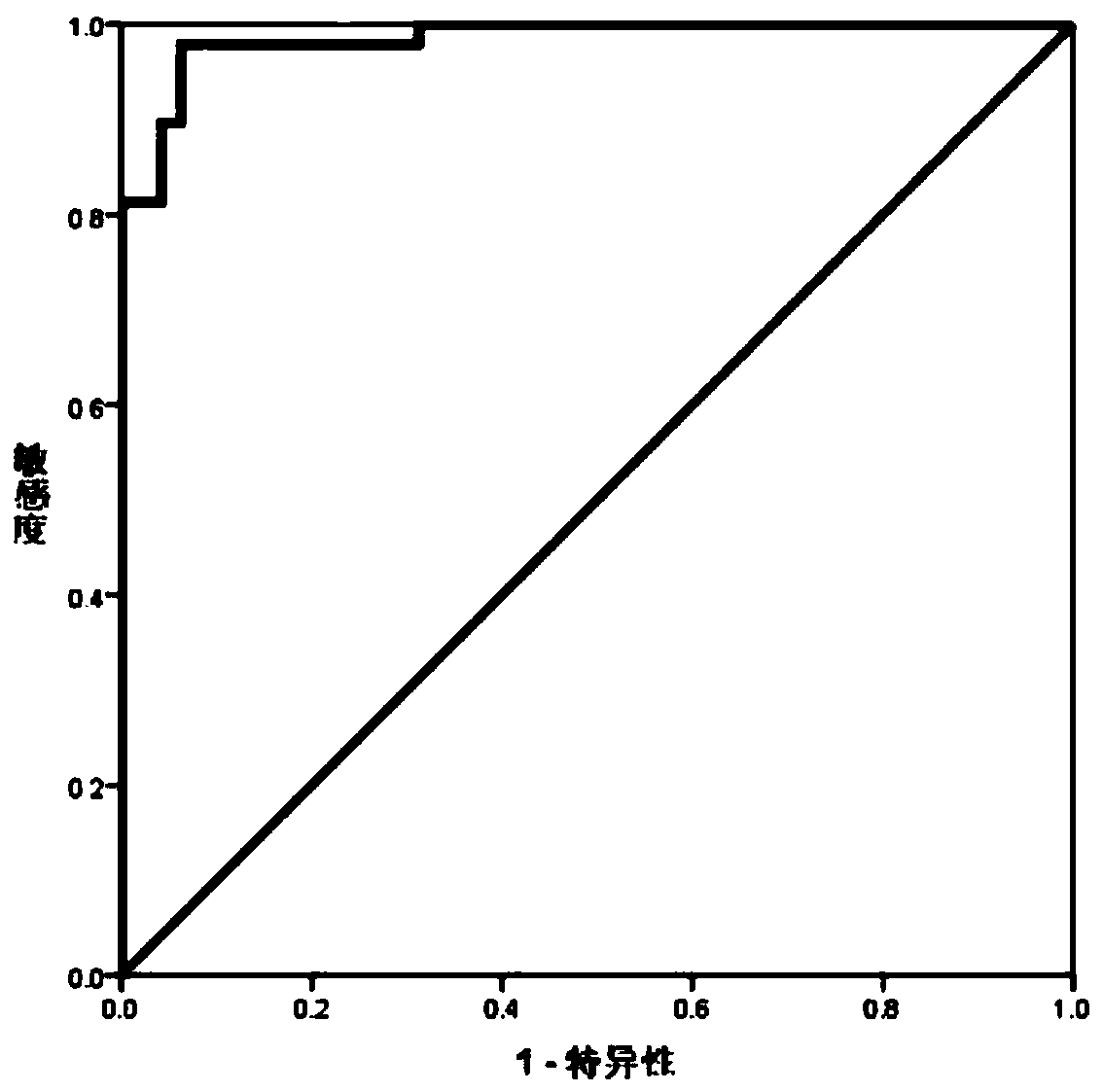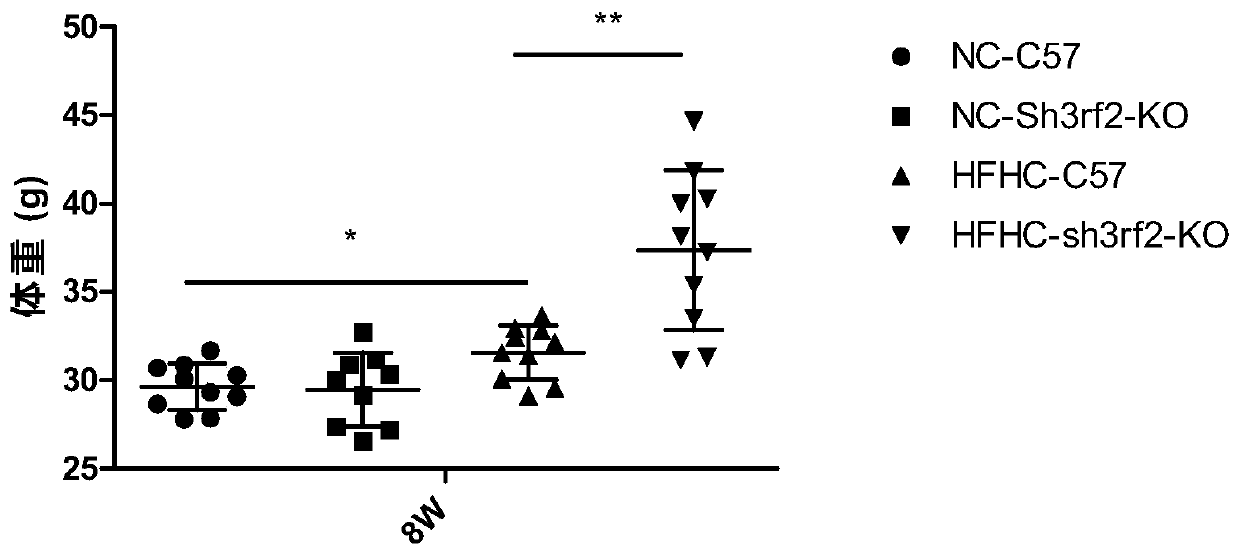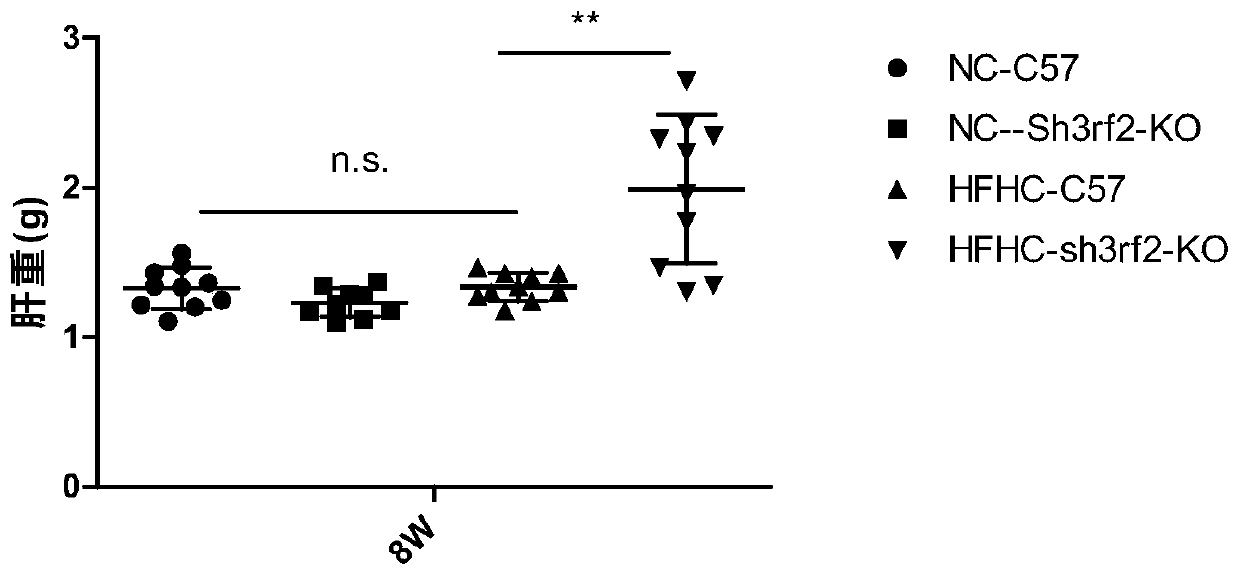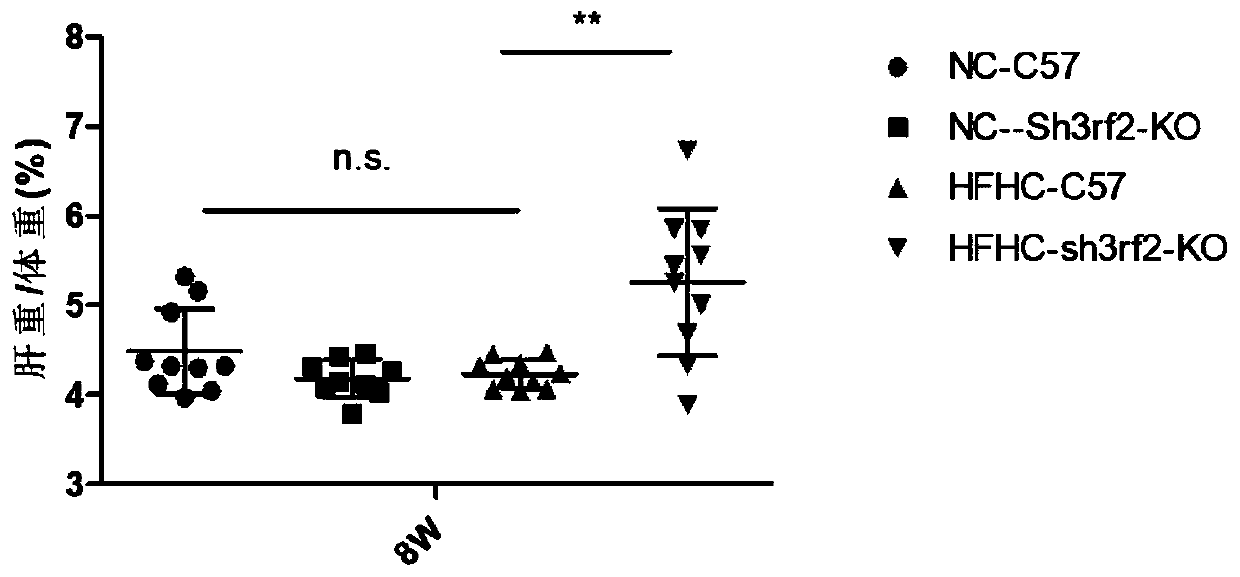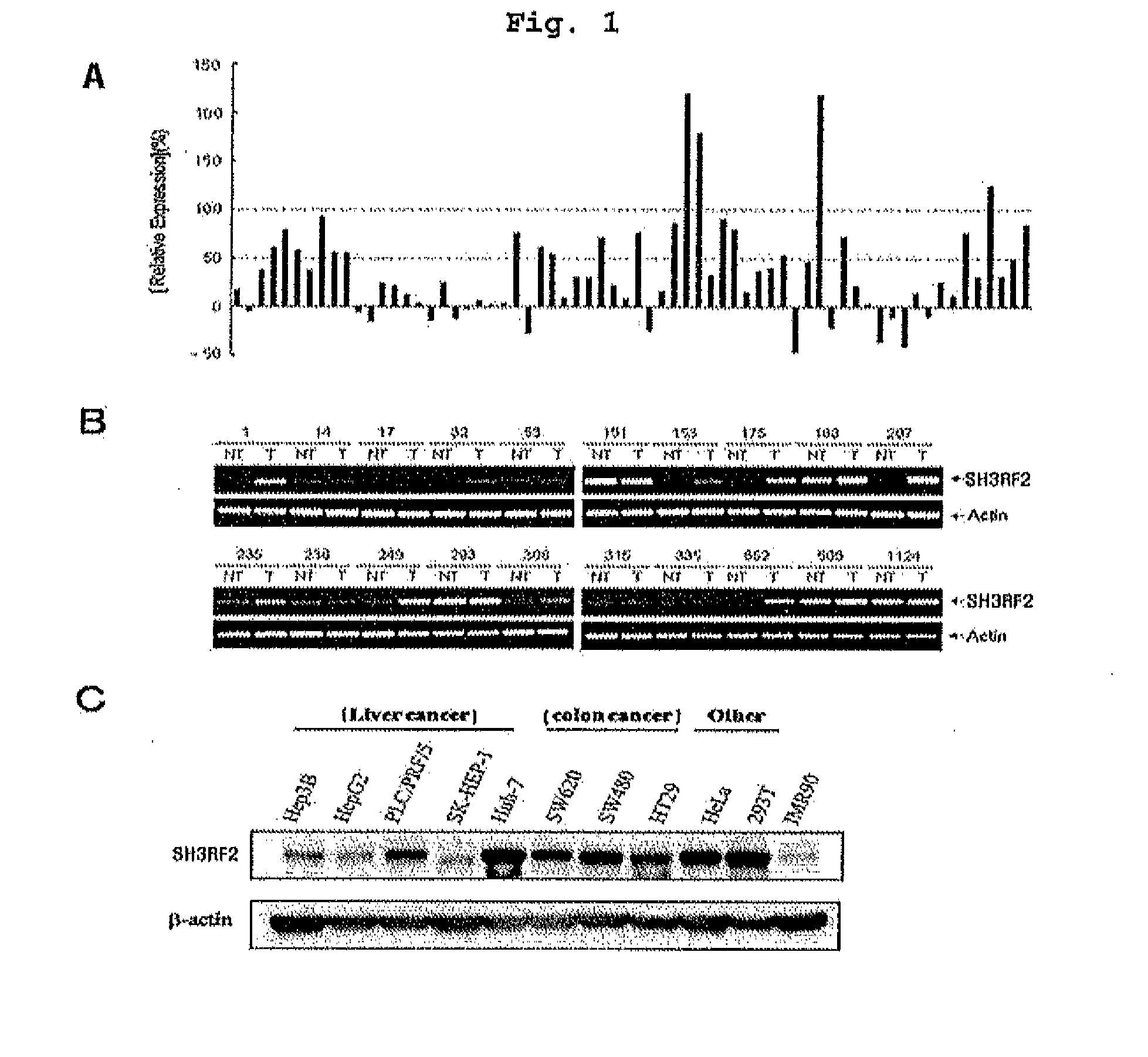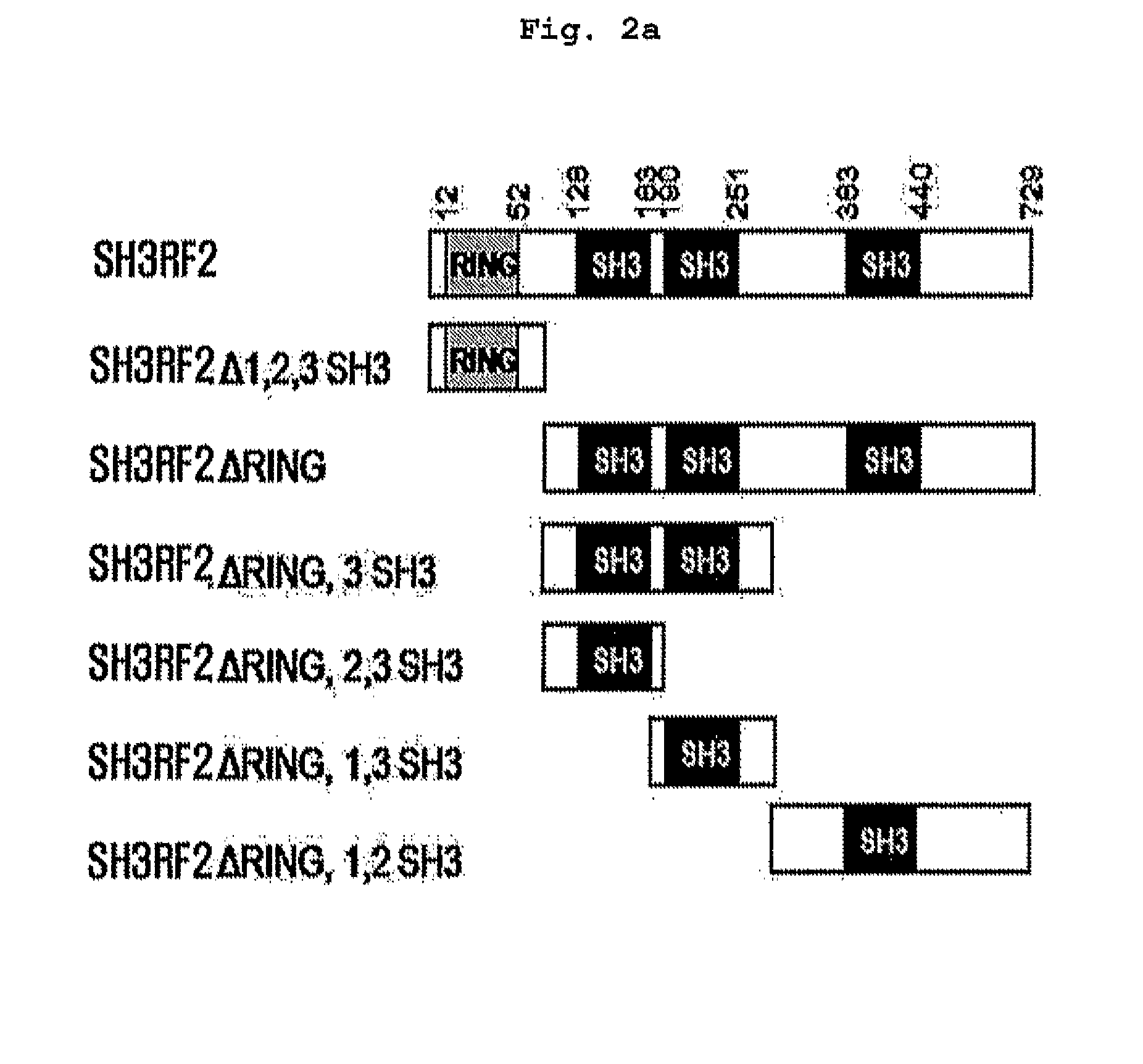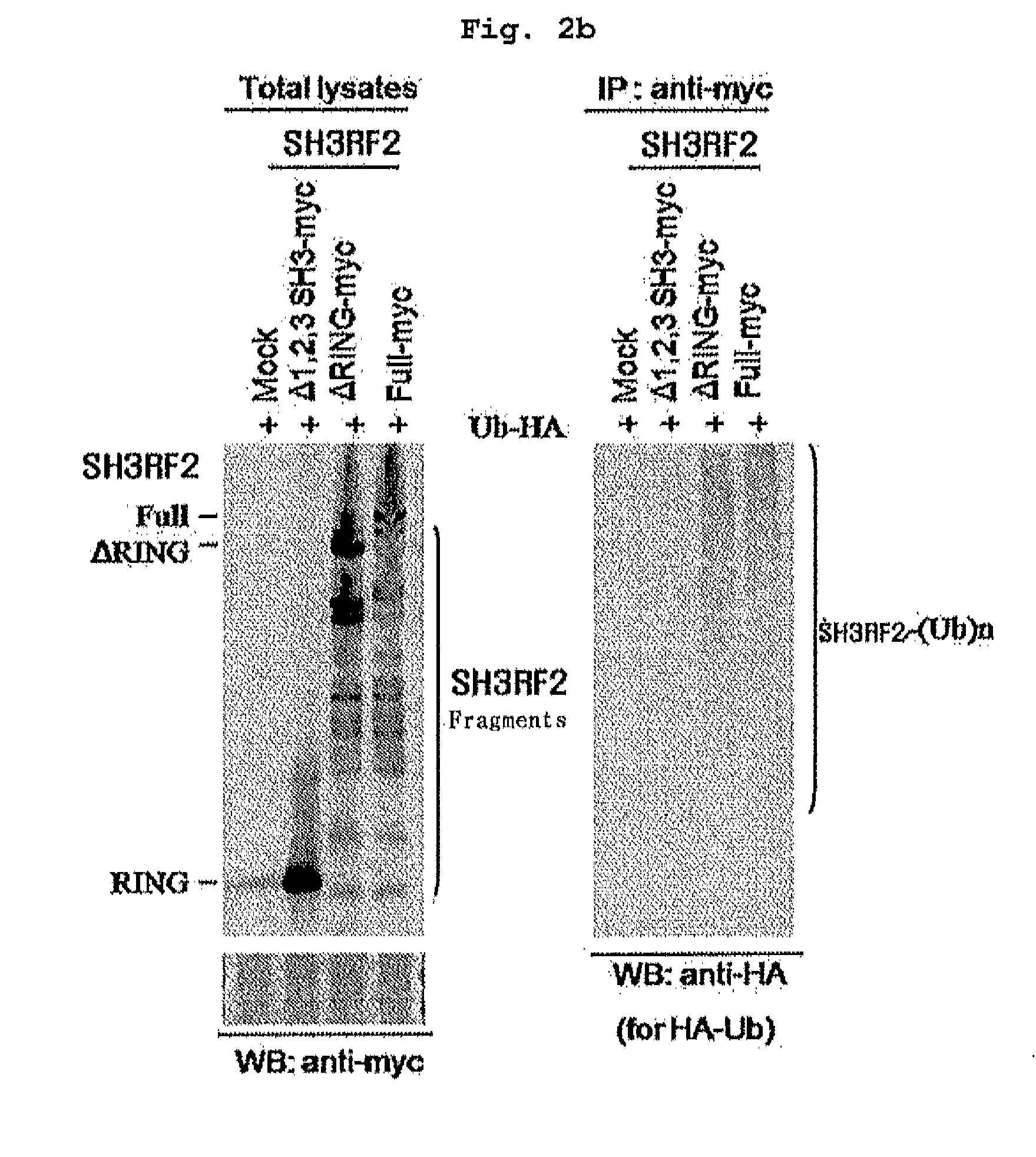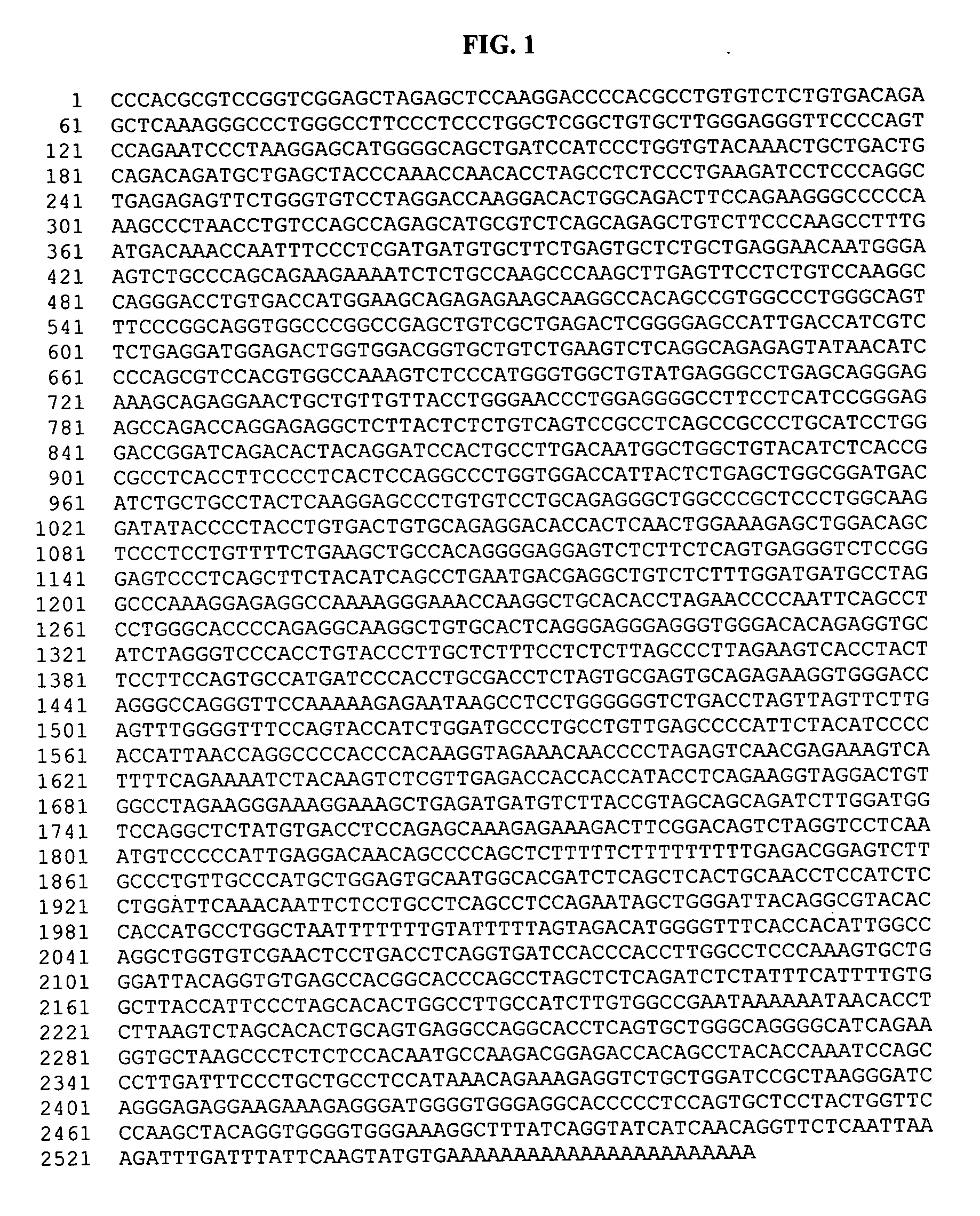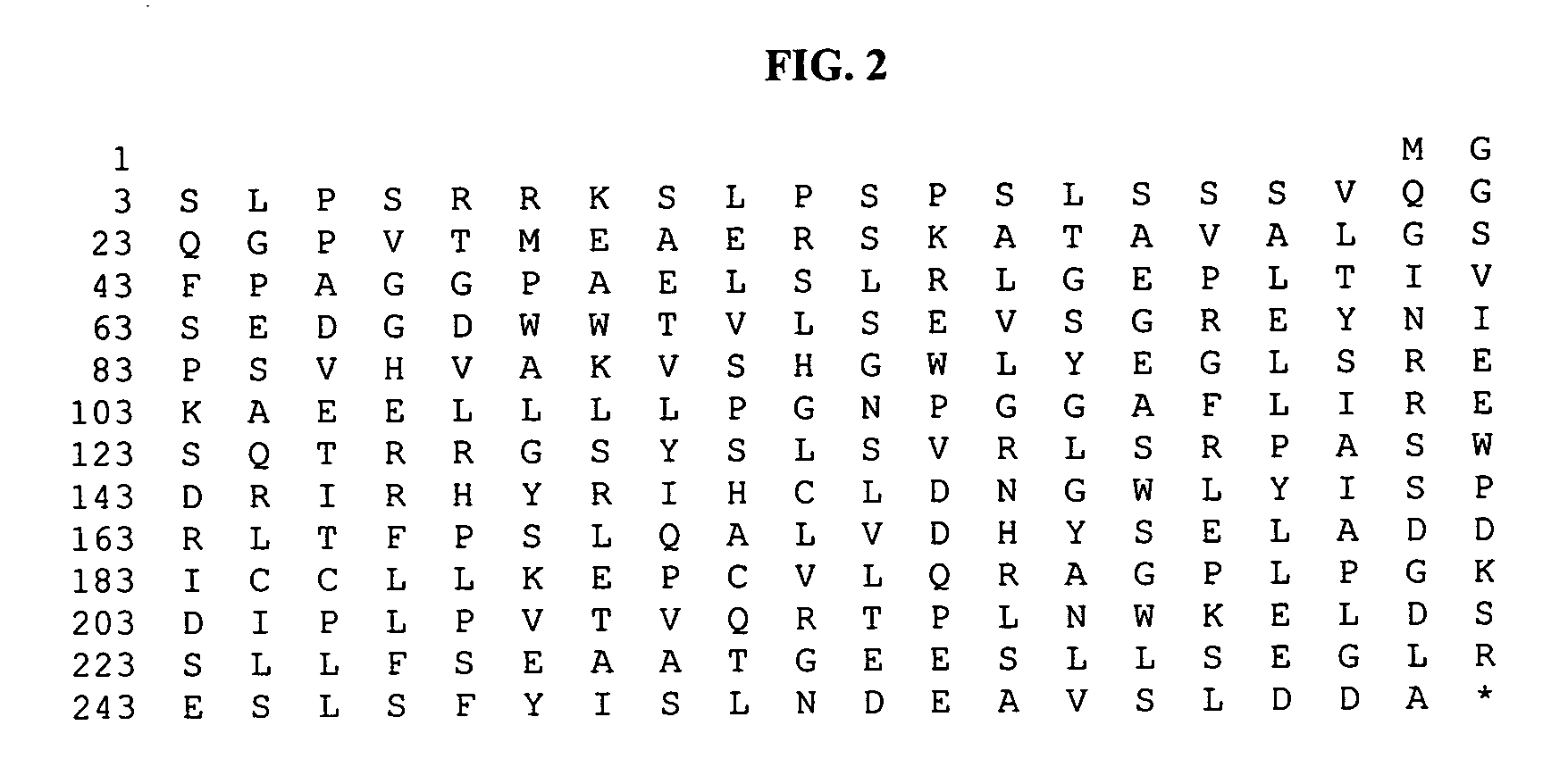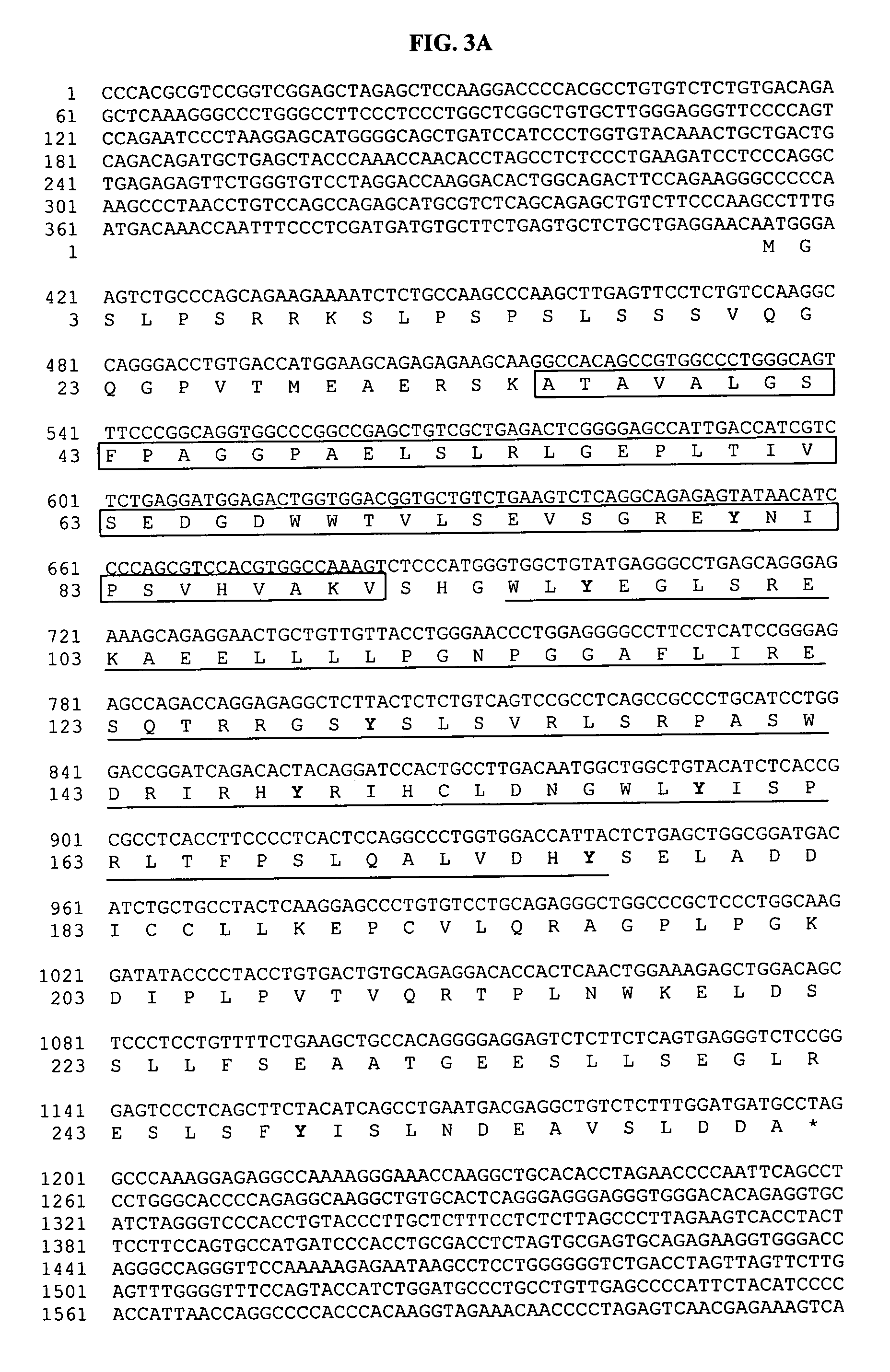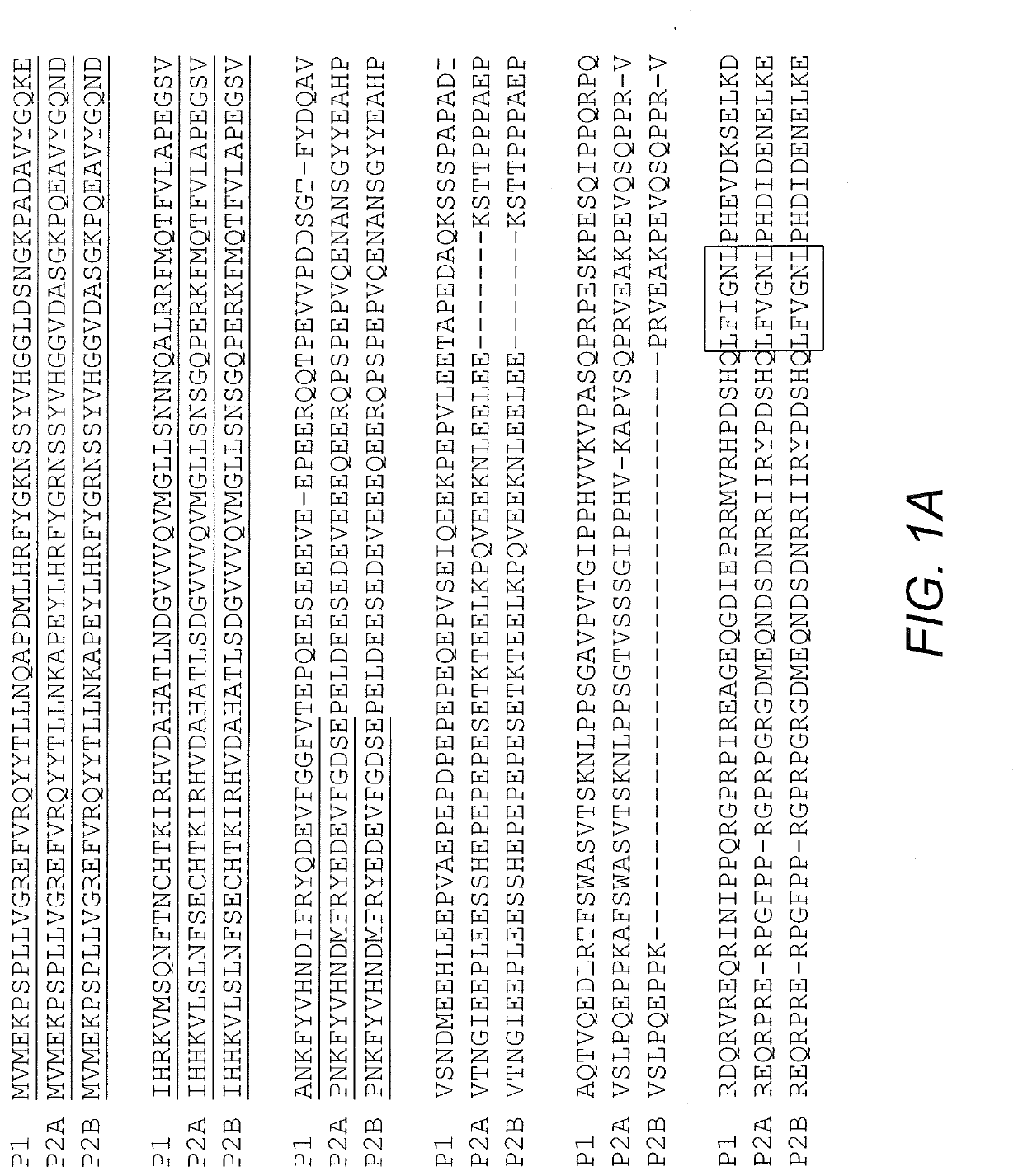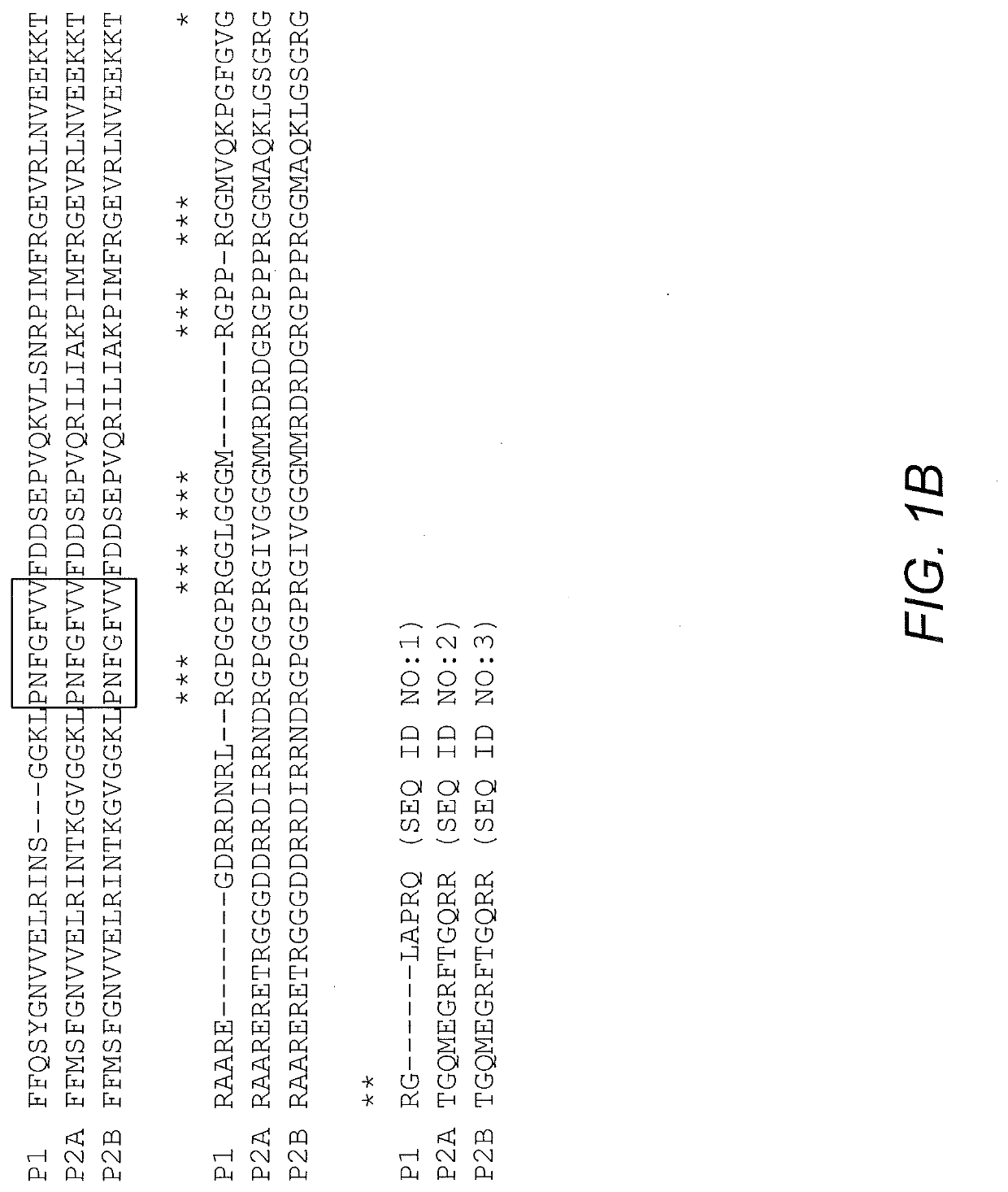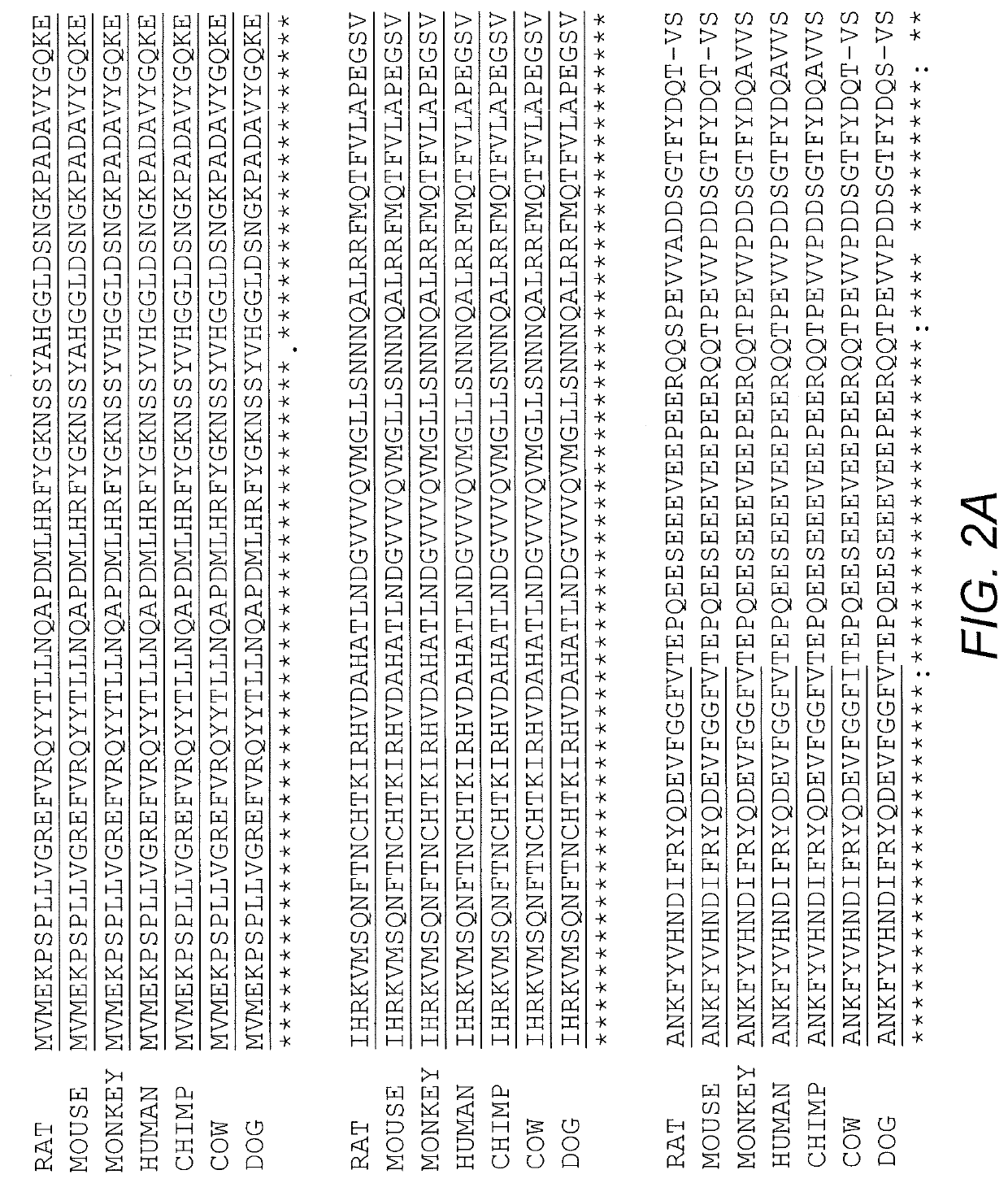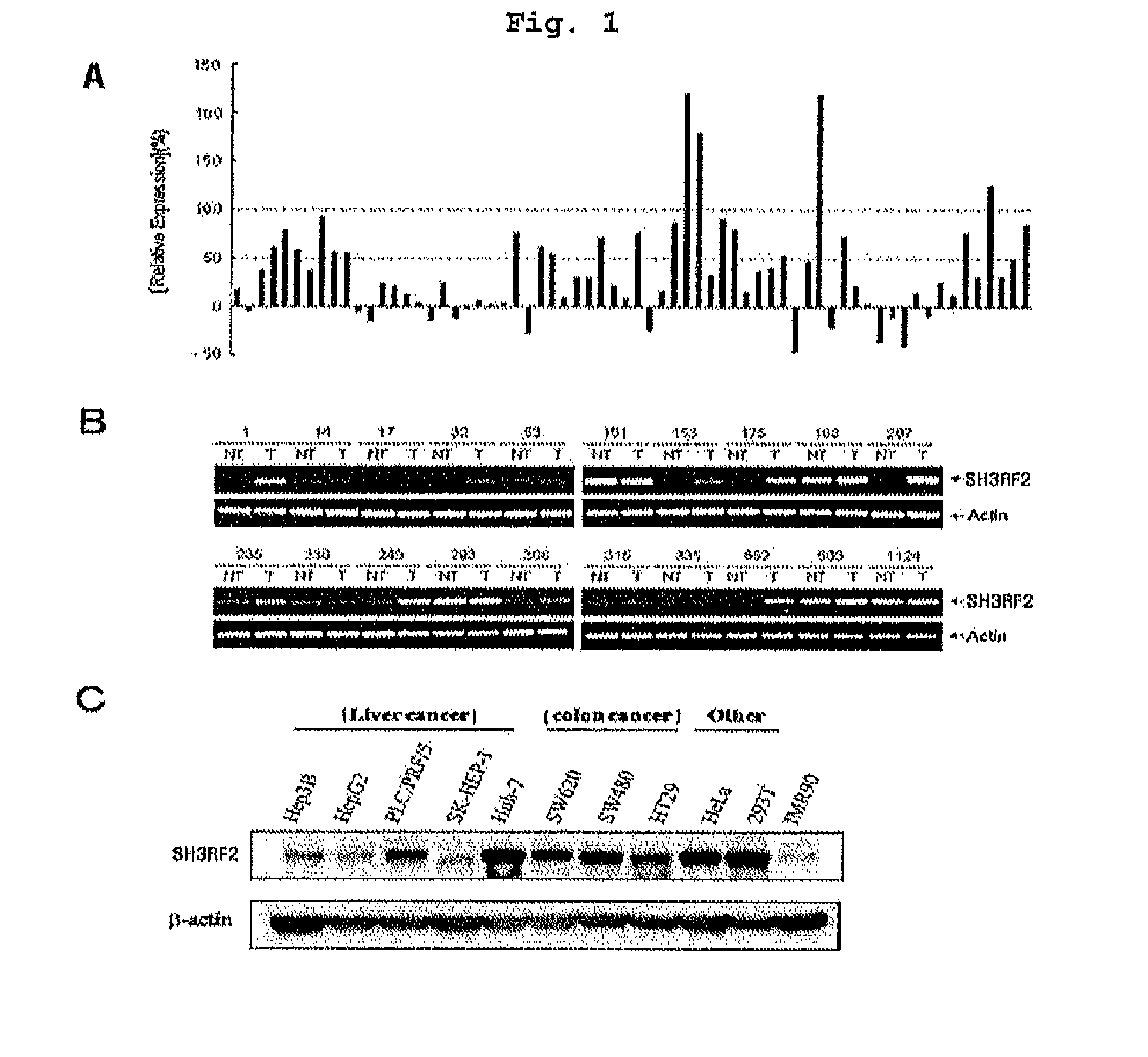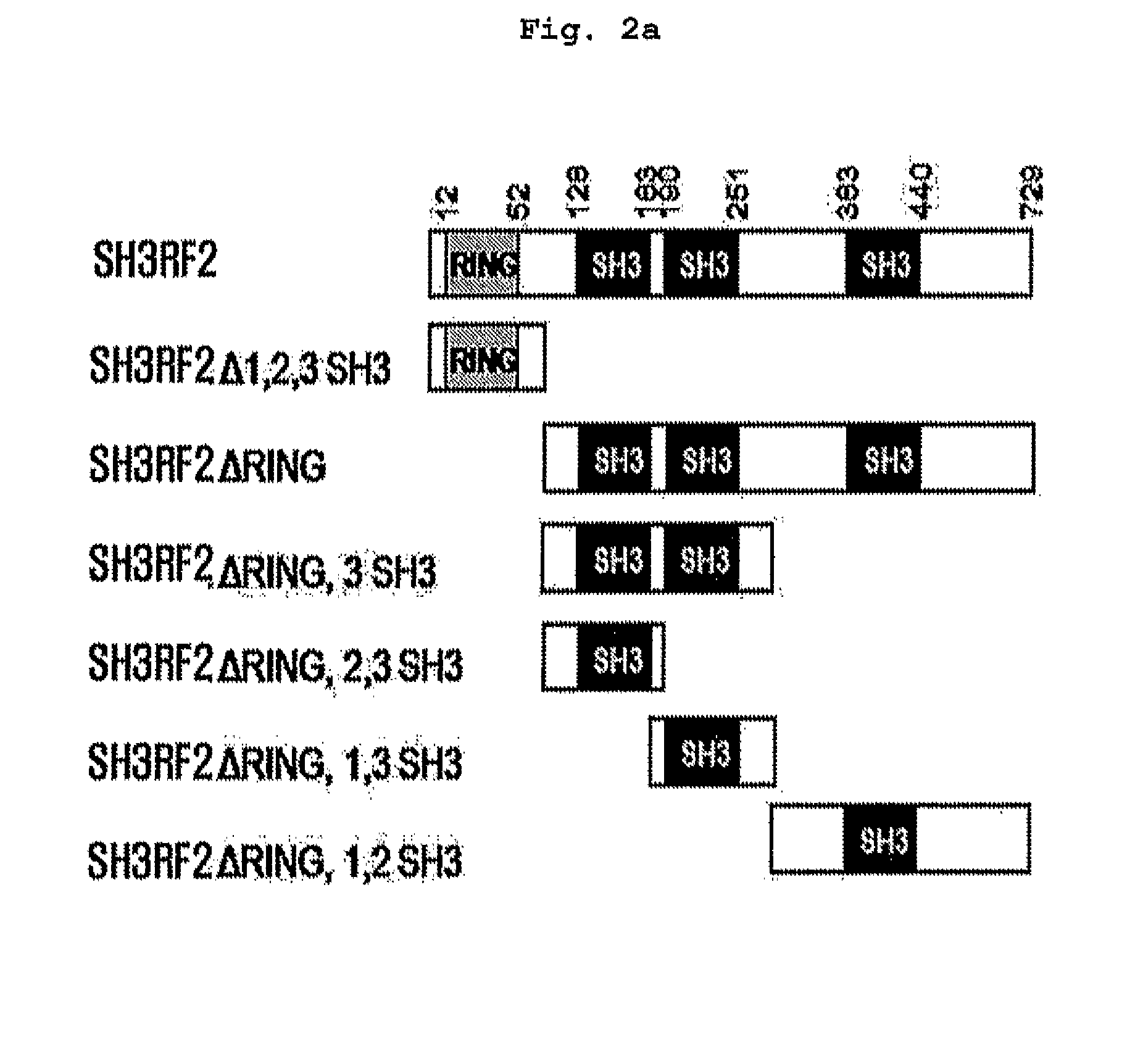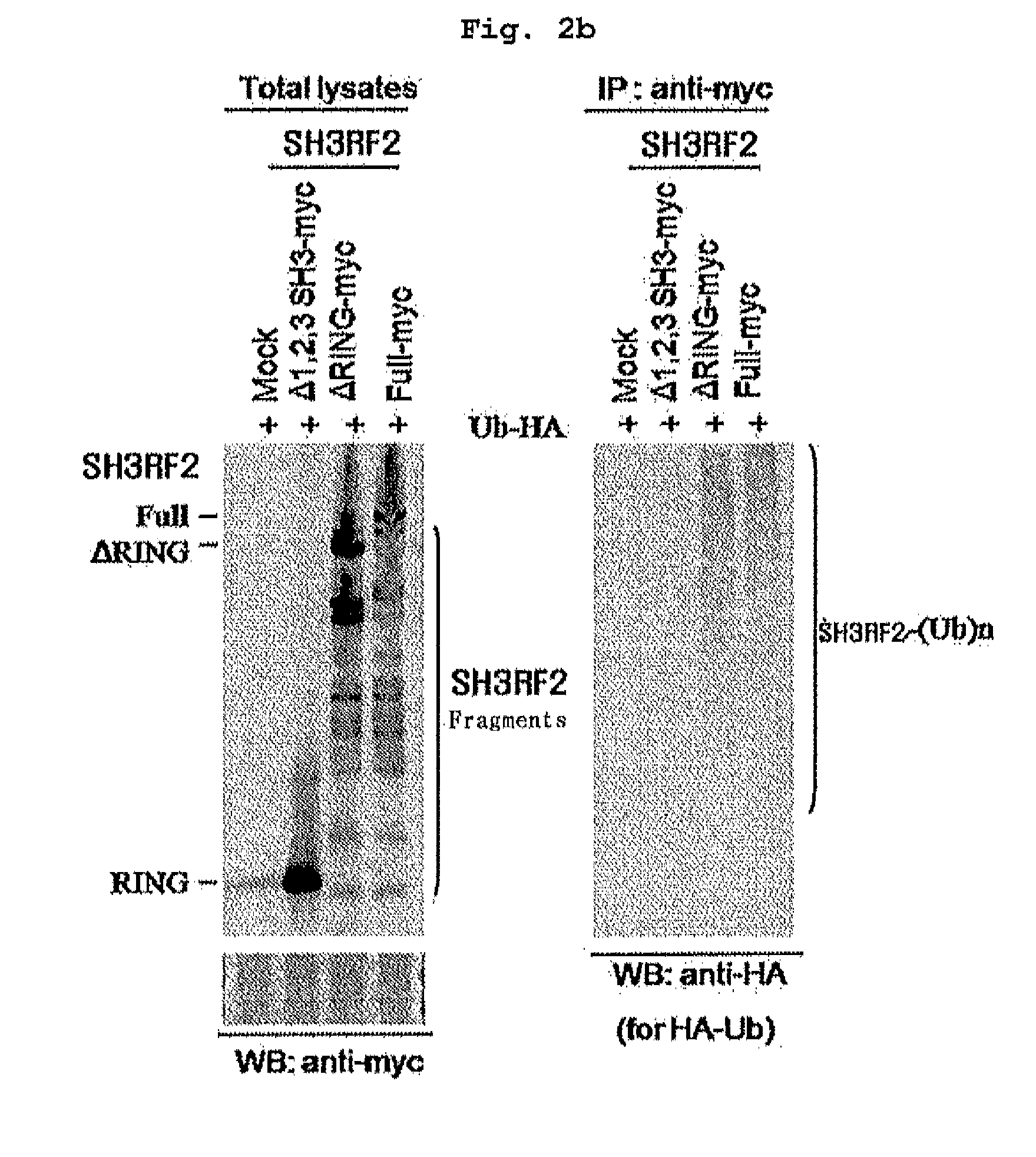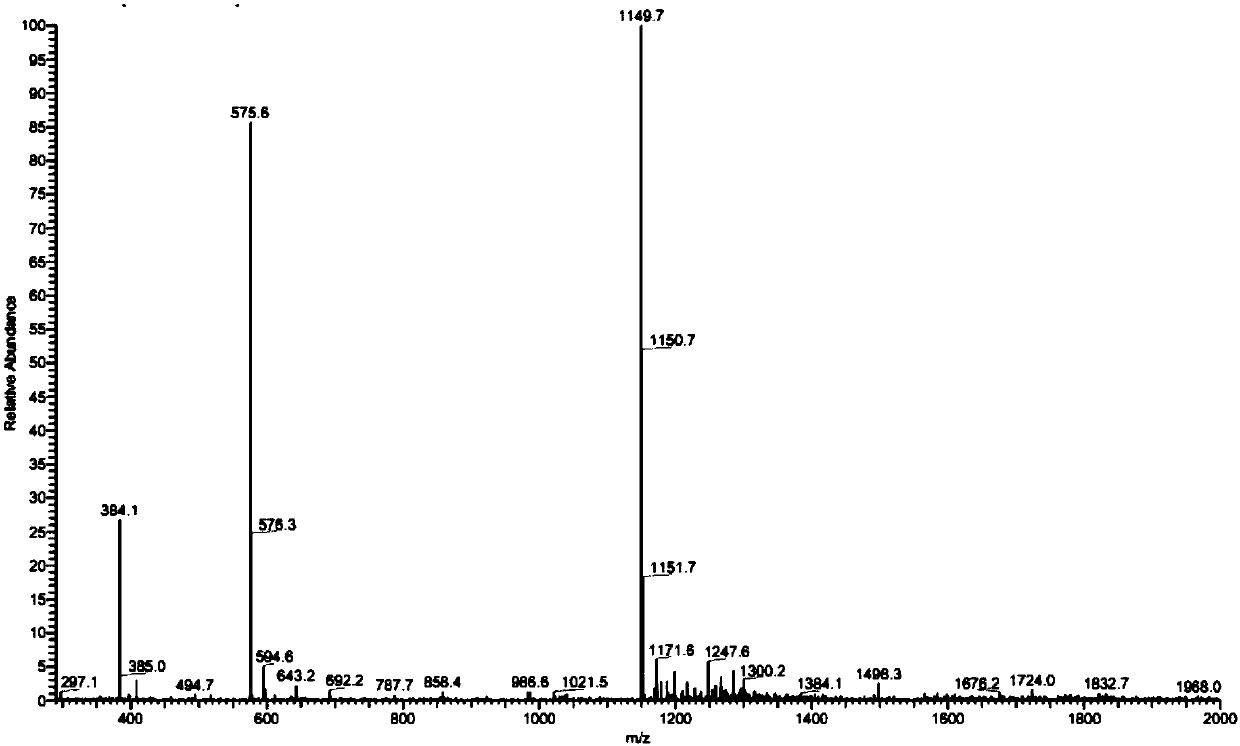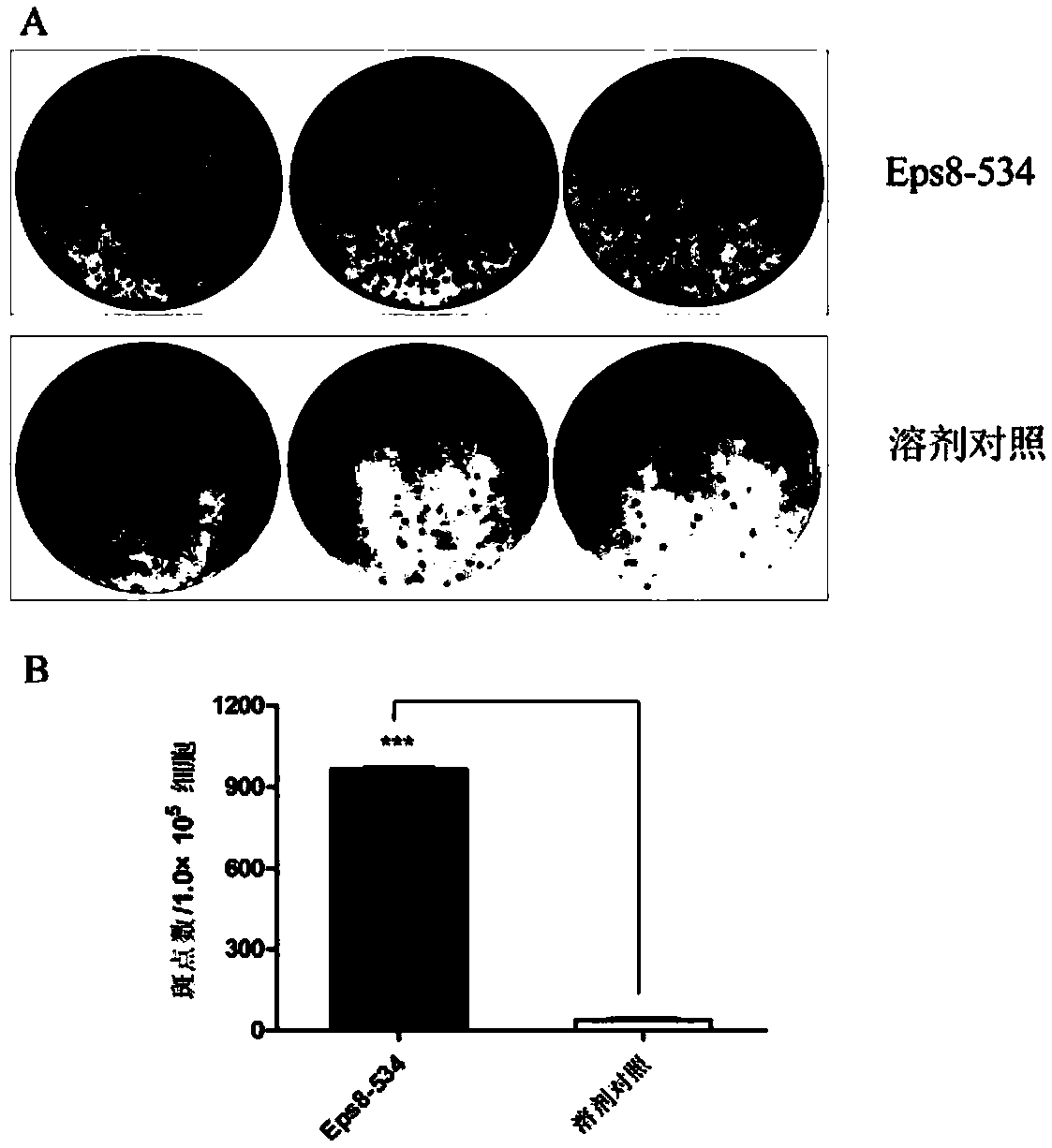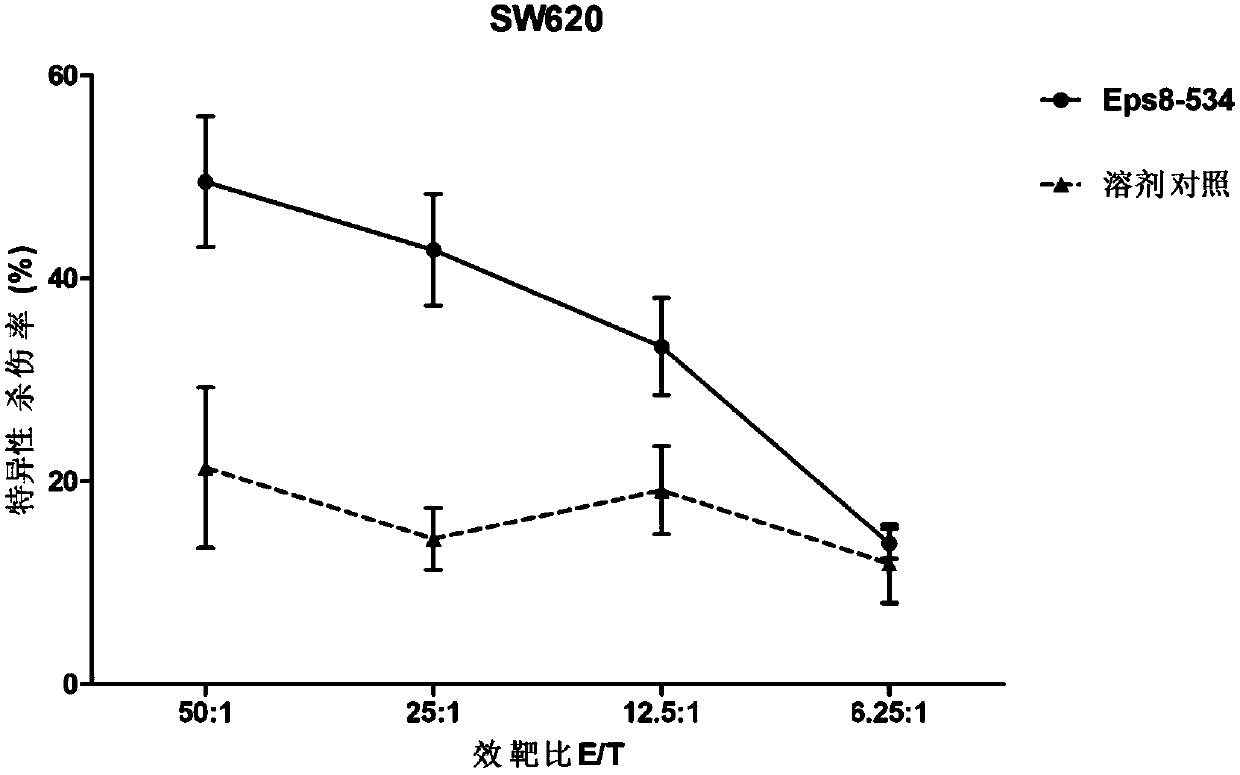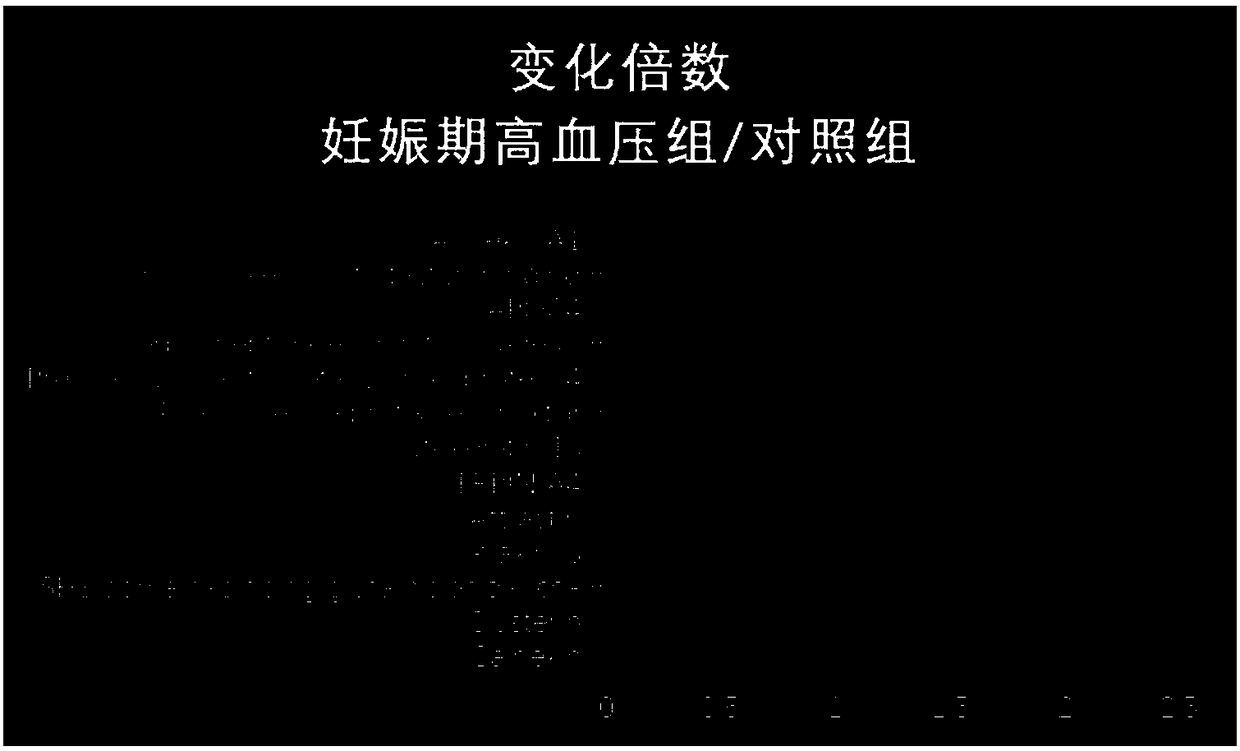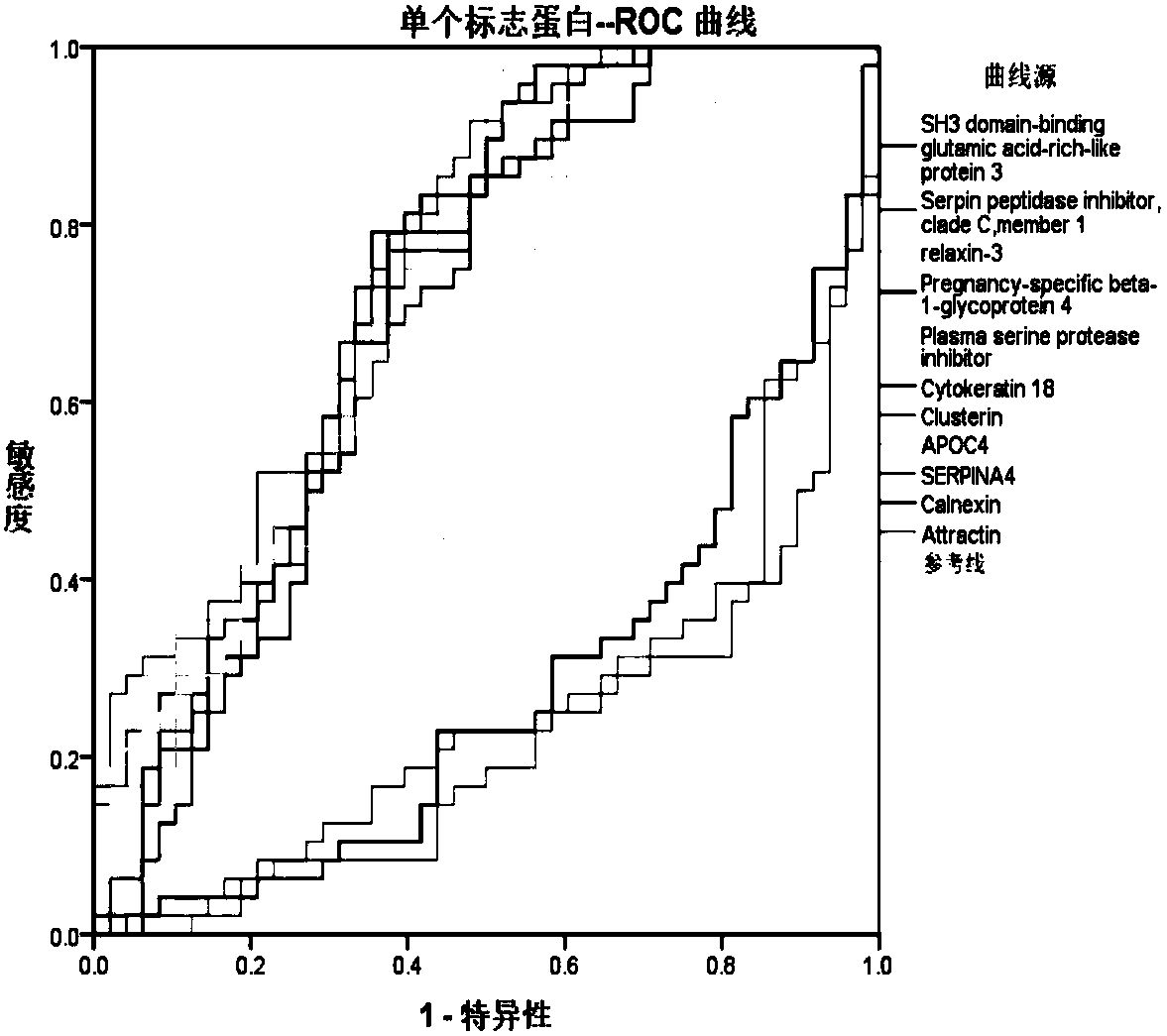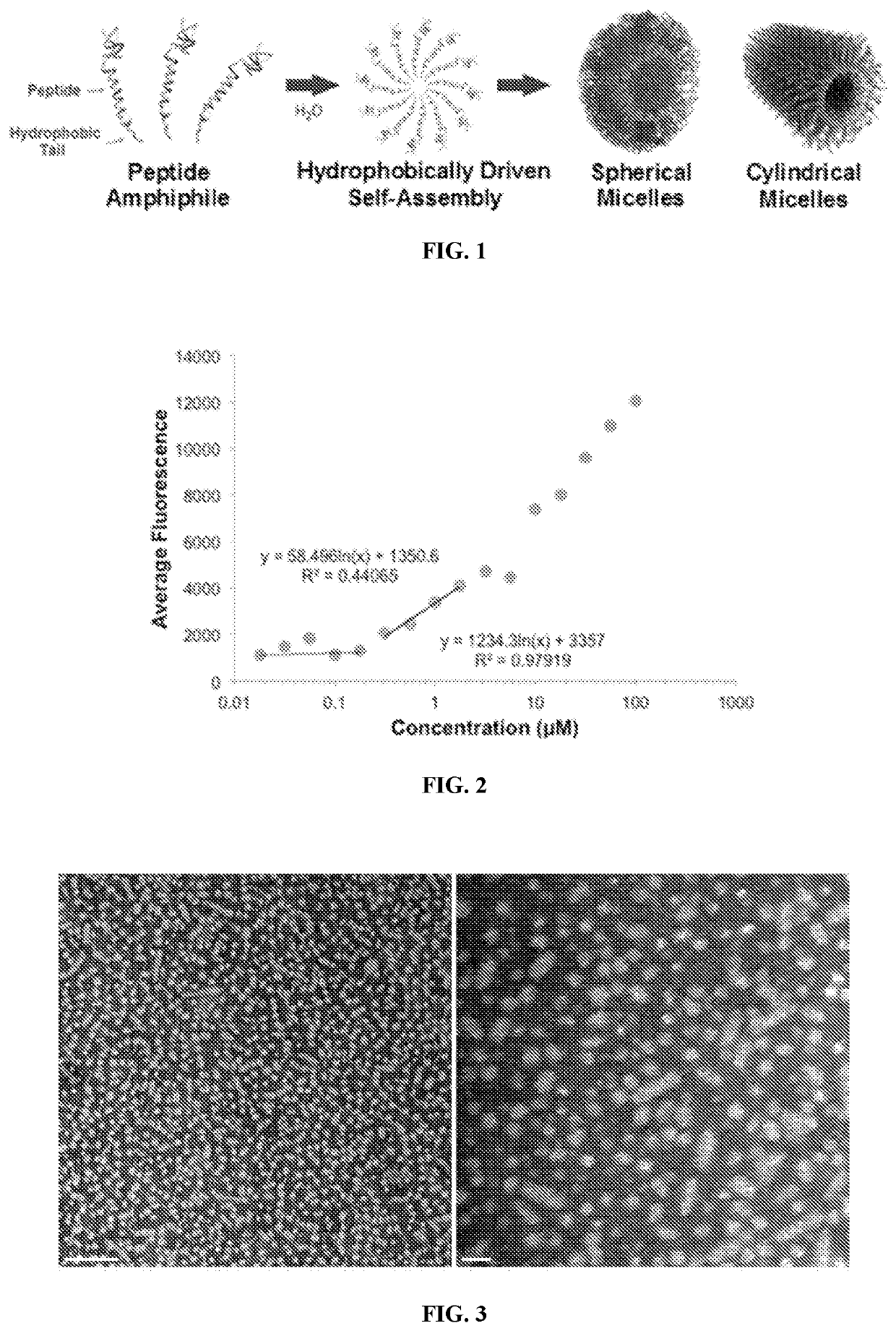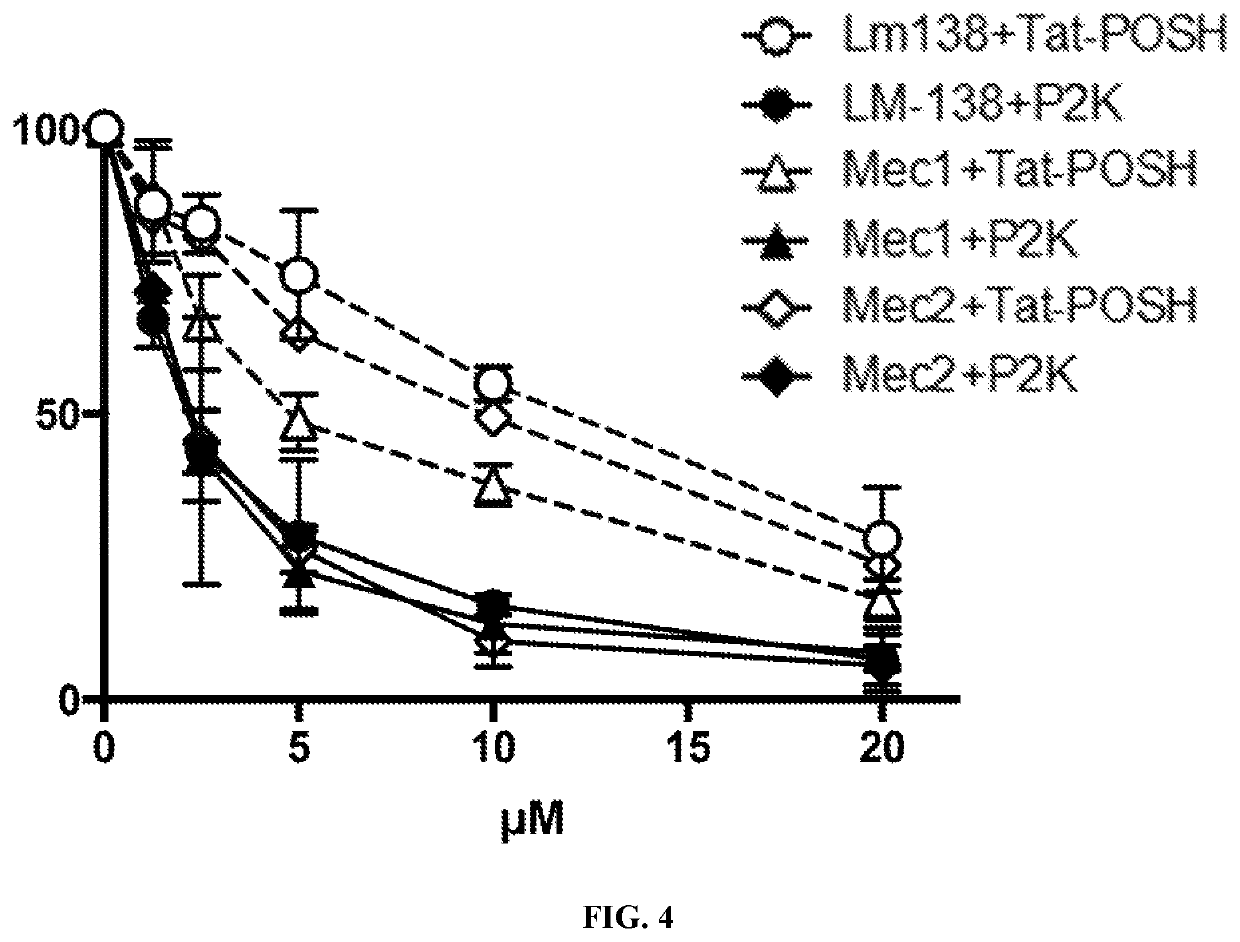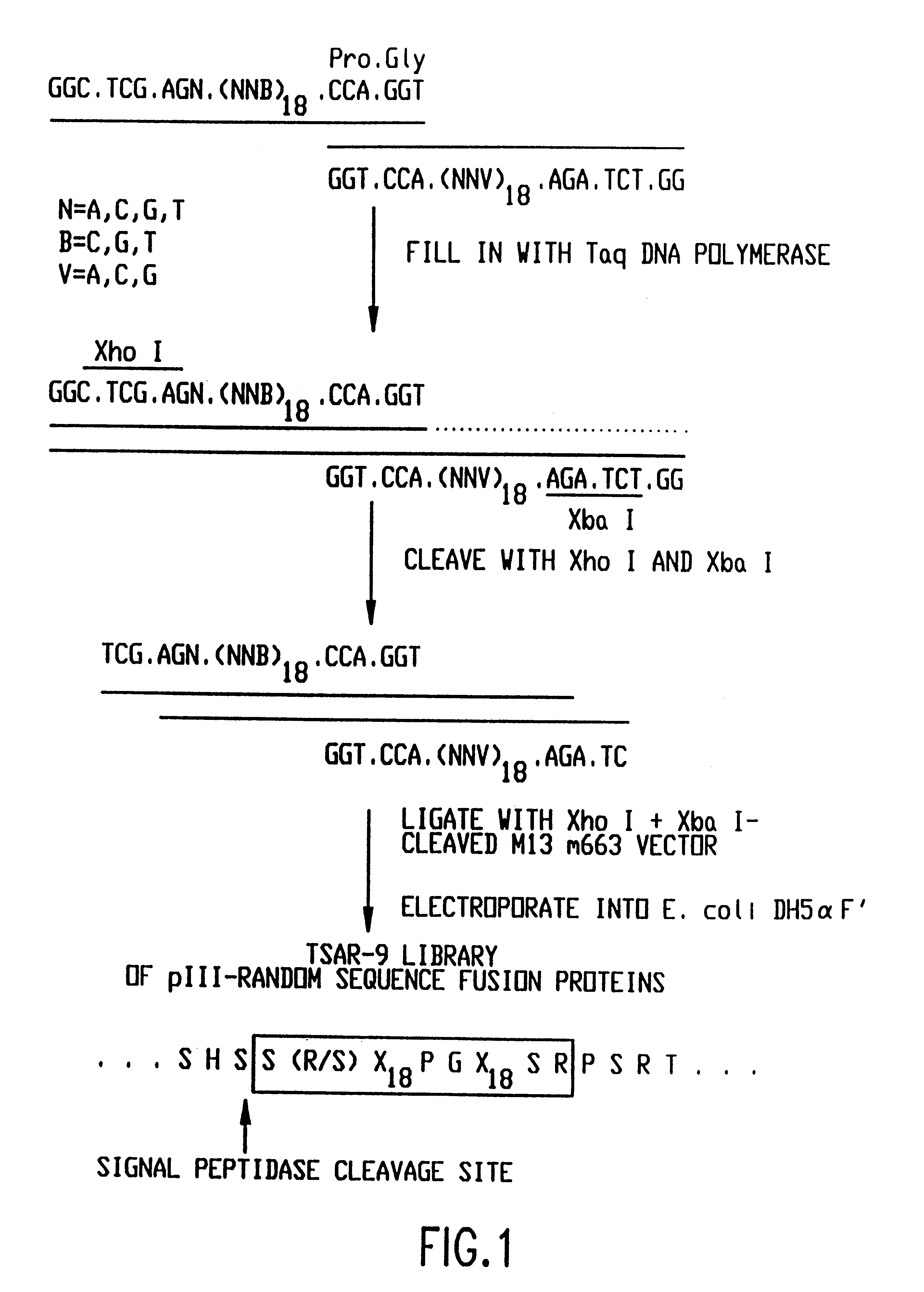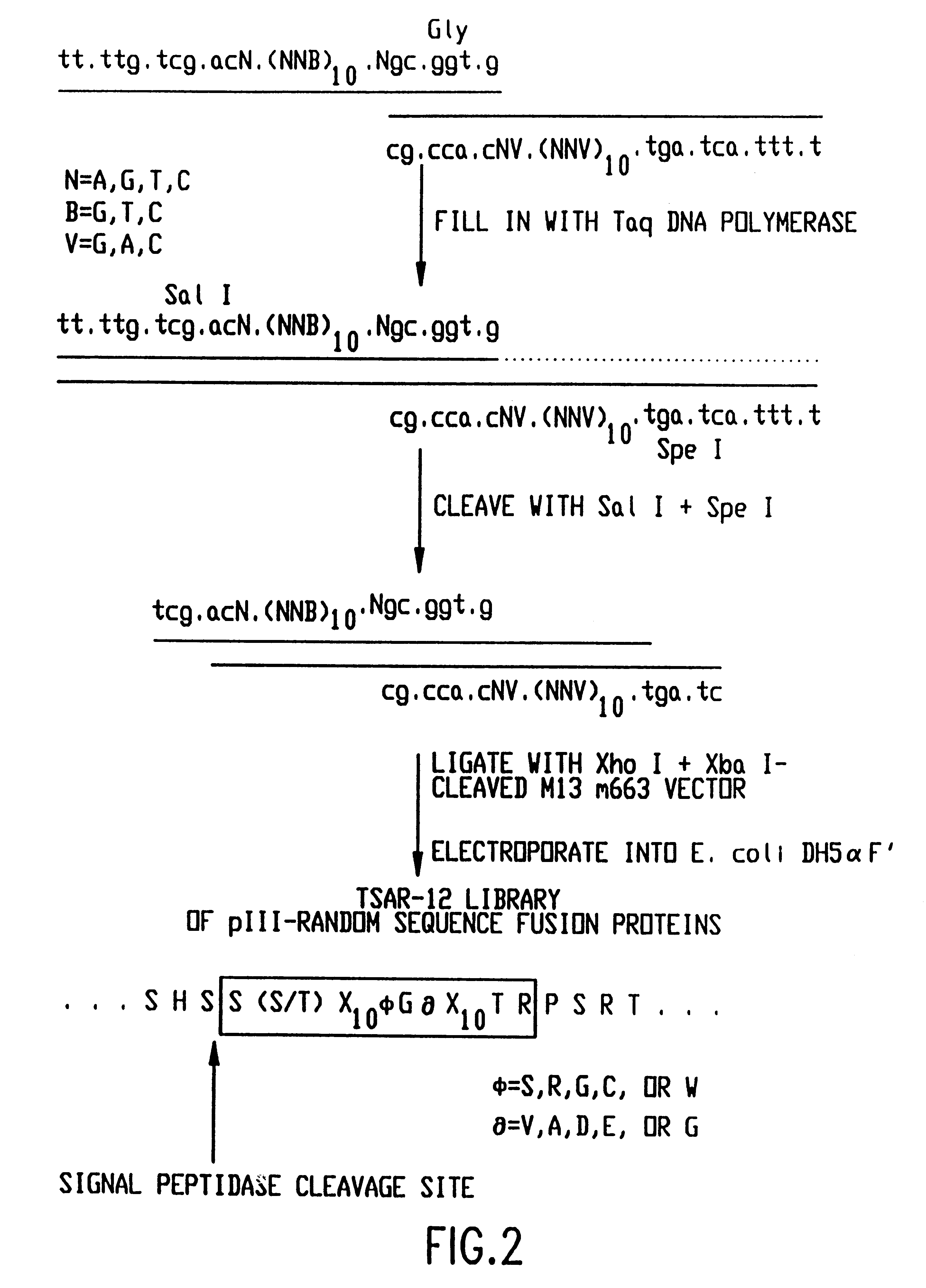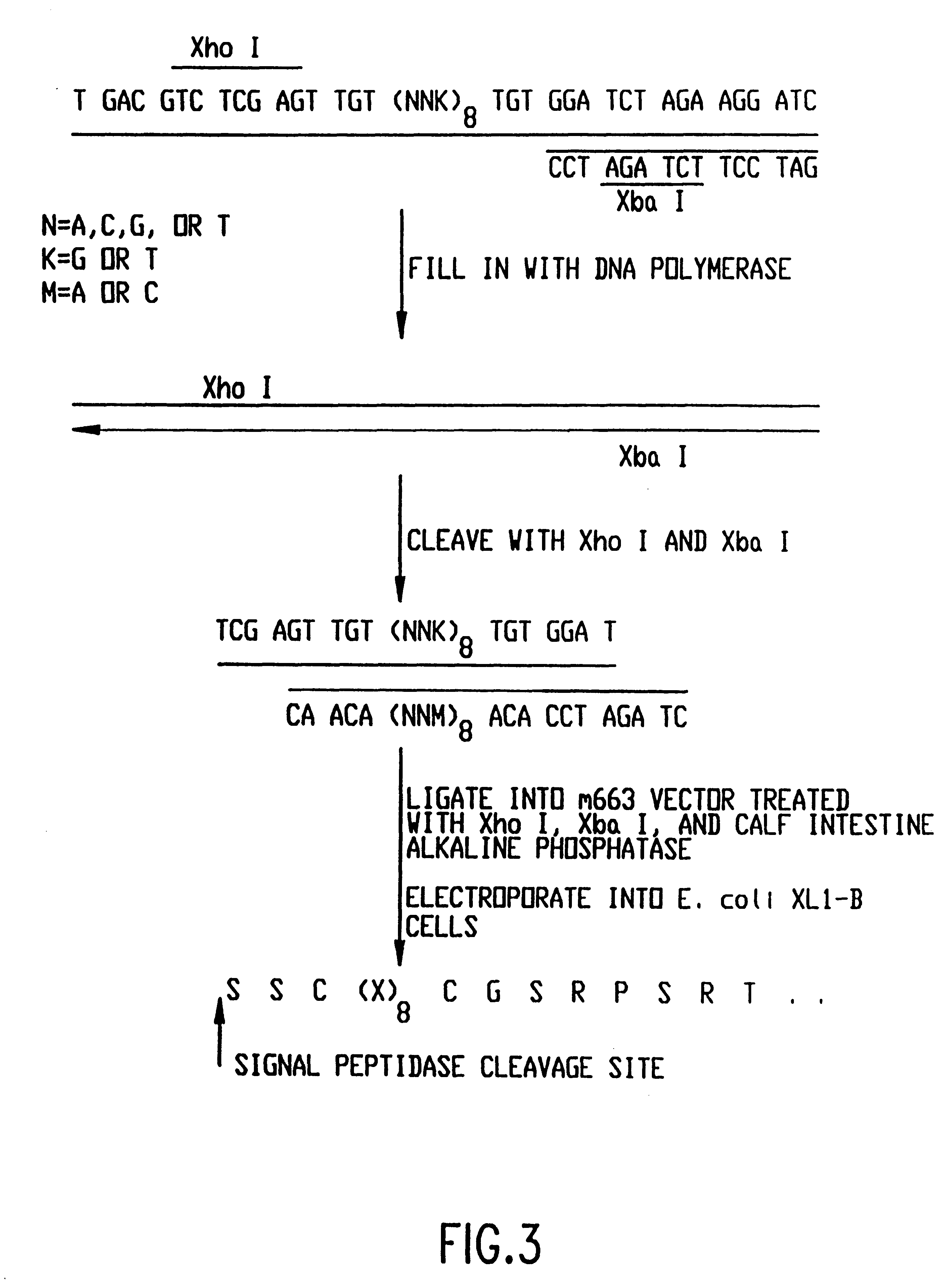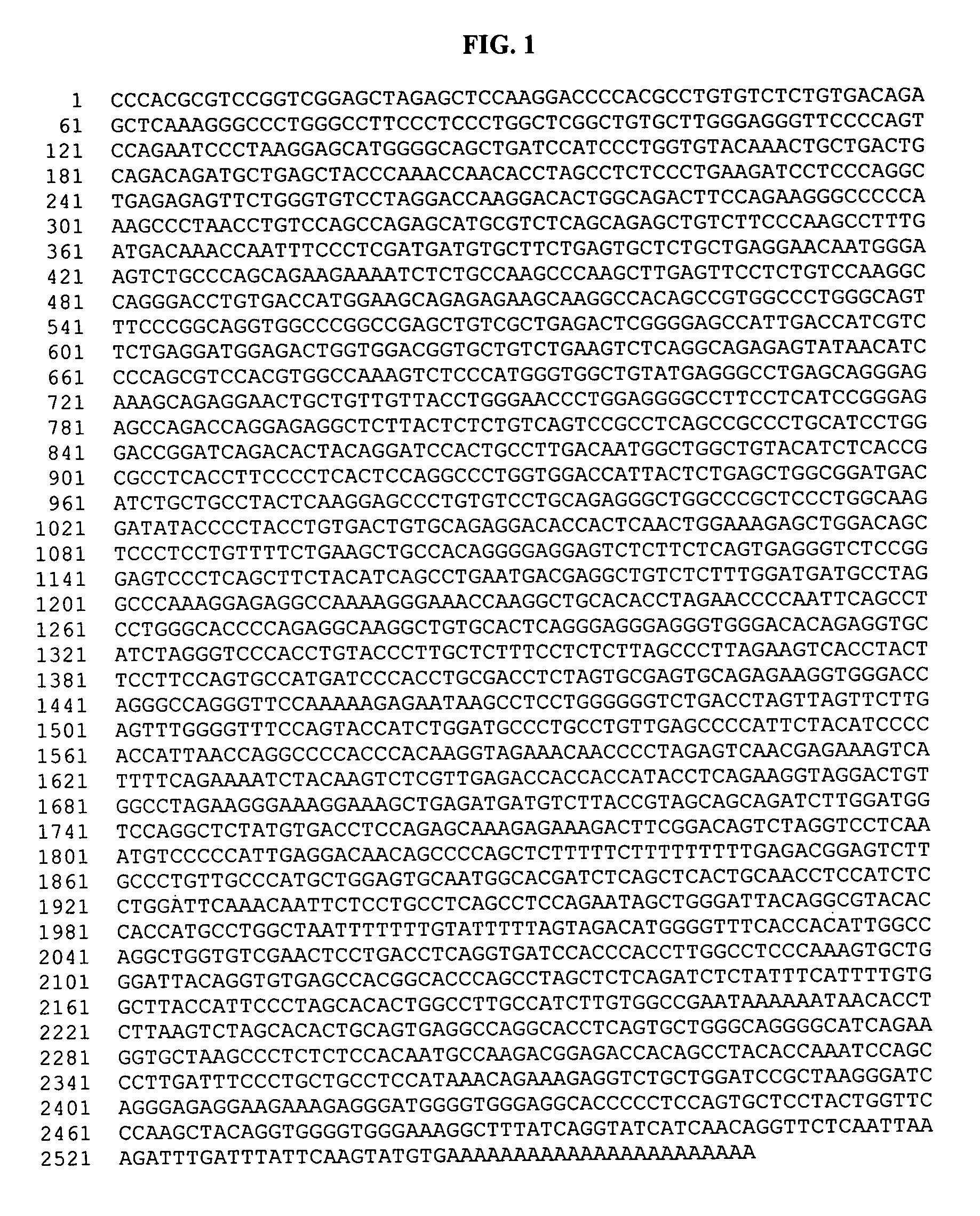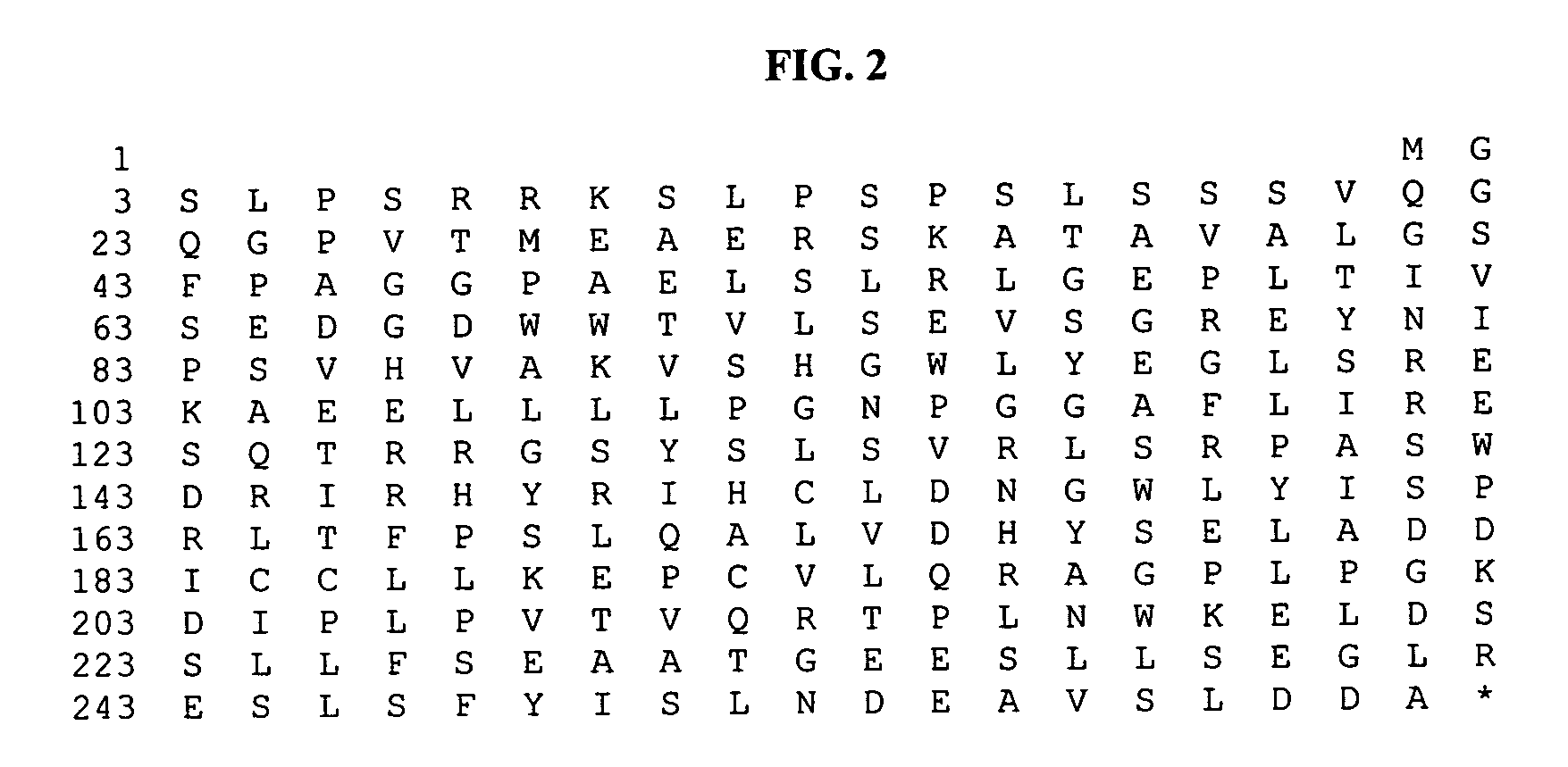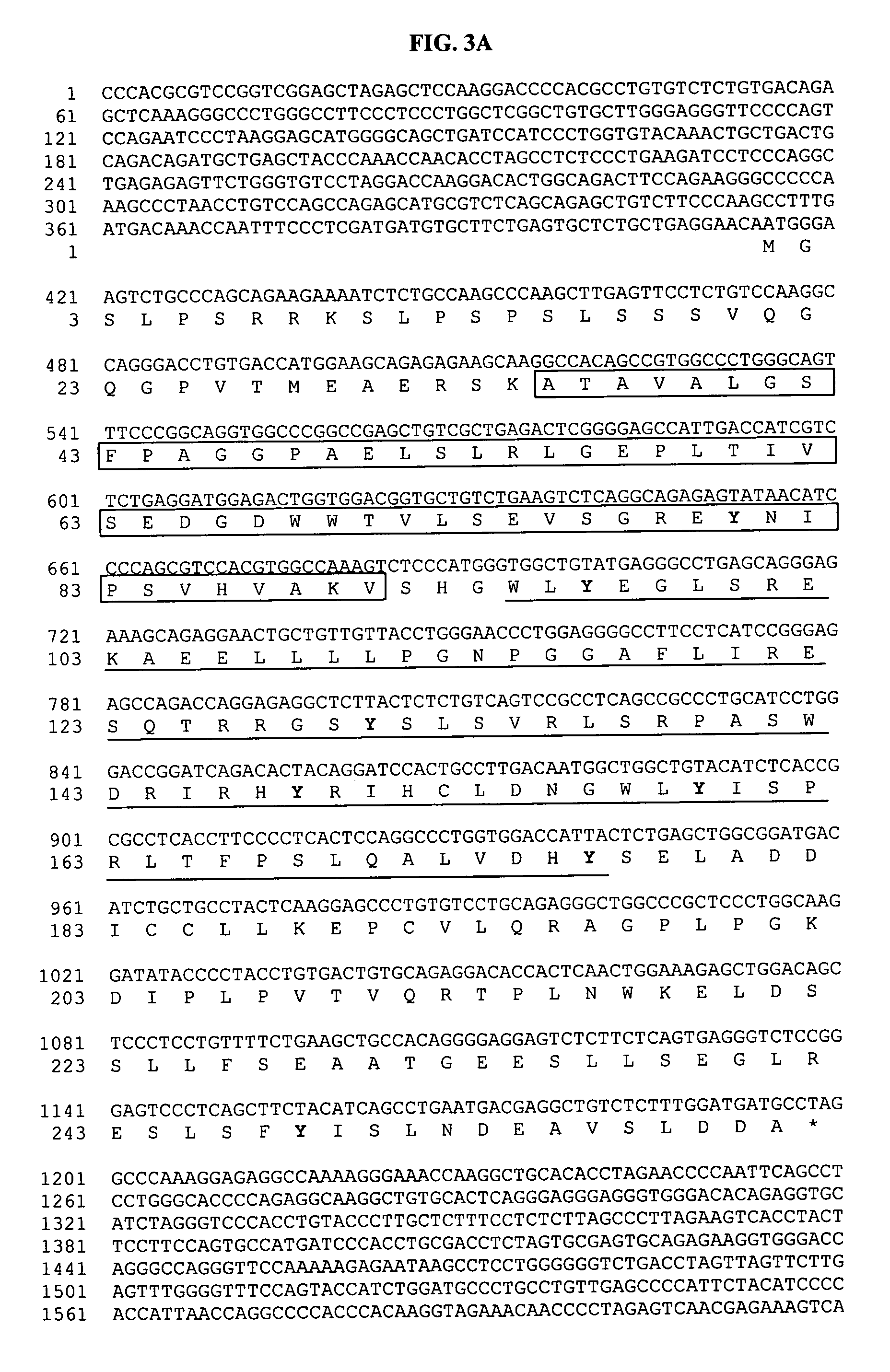Patents
Literature
Hiro is an intelligent assistant for R&D personnel, combined with Patent DNA, to facilitate innovative research.
40 results about "SH3 domain" patented technology
Efficacy Topic
Property
Owner
Technical Advancement
Application Domain
Technology Topic
Technology Field Word
Patent Country/Region
Patent Type
Patent Status
Application Year
Inventor
The SRC Homology 3 Domain (or SH3 domain) is a small protein domain of about 60 amino acid residues. Initially, SH3 was described as a conserved sequence in the viral adaptor protein v-Crk. This domain is also present in the molecules of phospholipase and several cytoplasmic tyrosine kinases such as Abl and Src. It has also been identified in several other protein families such as: PI3 Kinase, Ras GTPase-activating protein, CDC24 and cdc25. SH3 domains are found in proteins of signaling pathways regulating the cytoskeleton, the Ras protein, and the Src kinase and many others. The SH3 proteins interact with adaptor proteins and tyrosine kinases. Interacting with tyrosine kinases SH3 proteins usually bind far away from the active site. Approximately 300 SH3 domains are found in proteins encoded in the human genome. In addition to that, the SH3 domain was responsible for controlling protein-protein interactions in the signal transduction pathways and regulating the interactions of proteins involved in the cytoplasmic signaling.
Specific and high affinity binding proteins comprising modified sh3 domains of fyn kinase
InactiveUS20100119446A1Maintain good propertiesHigh affinityPeptide/protein ingredientsTransferasesActive componentNucleotide
The present invention relates to a recombinant binding protein comprising at least one derivative of the Src homology 3 domain (SH3) of the FYN kinase, wherein at least one amino acid in or positioned up to two amino acids adjacent to the src loop and / or at least one amino acid in or positioned up to two amino acids adjacent to the RT loop is substituted, deleted or added. Furthermore, the invention is directed to fusion proteins comprising a binding protein according to the invention fused to a pharmaceutically and / or diagnostically active component. In addition, the invention concerns nucleotides coding for these binding and / or fusion proteins as well as corresponding vectors and host cells. Last but not least, the present invention relates to the use of binding and / or fusion proteins of the present invention for preparing a medicament or a diagnostic means as well as to pharmaceutical or diagnostic compositions comprising said binding and / or fusion proteins.
Owner:ETH ZZURICH
GRB2 SH3 binding peptides and methods of isolating and using same
InactiveUS6184205B1Increase ratingsPeptide/protein ingredientsAntibody mimetics/scaffoldsRandom Peptide LibraryADAMTS Proteins
Peptides having general and specific binding affinities for the Src homology region 3 (SH3) domains of proteins are disclosed in the present invention. In particular, SH3 binding peptides have been isolated from phage-displayed random peptide libraries which had been screened for isolates that bind to bacterial fusion proteins having an SH3 domain and glutathione S-transferase (GST). Preferred peptides are disclosed which comprise a core 7-mer sequence (preferably, a consensus motif) and two or more, preferably at least six, additional amino acid residues flanking the core sequence, for a total length of 9, preferably at least 13, amino acid residues and no more than about 45 amino acid residues. Such peptides manifest preferential binding affinities for certain SH3 domains. The preferred peptides exhibit specific binding affinities for the Src-family of proteins. In vitro and in vivo results are presented which demonstrate the biochemical activity of such peptides.
Owner:CYTOGEN CORP +1
Compositions and methods for producing bioactive fusion proteins
Disclosed is a composition of matter involving a recombinant fusion protein comprising a a pharmacologically active protein partner, and a small pharmacologically inactive protein domain partner of human origin, such as but not limited to, a 10th fibronectin III domain, a SH3 domain, a SH2 domain, a CH2 domain of IgG1, a PDZ domain, a thrombospondin repeat domain, an ubiquitin domain, a leucine-rich repeat domain, a villin headpiece HP35 domain, a villin headpiece HP76 domain, or a fragment or modification of any of these. Also disclosed are nucleic acids (e.g., DNA constructs) encoding the fusion protein, expression vectors and recombinant host cells for expression of the fusion protein, and pharmaceutical compositions containing the recombinant fusion protein and a pharmaceutically acceptable carrier, and method of producing a pharmacologically active recombinant fusion protein.
Owner:AMGEN INC
Src SH3 binding peptides and methods of isolating and using same
InactiveUS20020091085A1Increase ratingsPeptide-nucleic acidsPeptide/protein ingredientsRandom Peptide LibraryBinding peptide
Owner:THE UNIV OF NORTH CAROLINA AT CHAPEL HILL
Selective PARP-1 targeting for designing chemo/radio sensitizing agents
InactiveUS7072771B2Affect activityMicrobiological testing/measurementBiological testingBiological activationDrug target
Poly(ADP-ribose) polymerase-1 (PARP-1) is a central signaling enzyme in a cell nucleus. PARP-1 is a target for the development of radio and chemo sensitizing agents in cancer treatment as well as providing protection from stroke. An SH3 domain and an SH3 ligand domain have now been discovered on the PARP-1 protein. These domains are involved in PARP-1 activation. This discovery makes possible the use of bioinformatics tools for the design of new drugs and strategies for drug target selection, specifically targeting the PARP-1 enzyme.
Owner:UNIV OF KENTUCKY RES FOUND
Compositions and methods for producing bioactive fusion proteins
InactiveUS20090118181A1Low immunogenic riskReduce riskBacteriaPeptide/protein ingredientsDNA constructActive protein
Disclosed is a composition of matter involving a recombinant fusion protein comprising a a pharmacologically active protein partner, and a small pharmacologically inactive protein domain partner of human origin, such as but not limited to, a 10th fibronectin III domain, a SH3 domain, a SH2 domain, a CH2 domain of IgG1, a PDZ domain, a thrombospondin repeat domain, an ubiquitin domain, a leucine-rich repeat domain, a villin headpiece HP35 domain, a villin headpiece HP76 domain, or a fragment or modification of any of these. Also disclosed are nucleic acids (e.g., DNA constructs) encoding the fusion protein, expression vectors and recombinant host cells for expression of the fusion protein, and pharmaceutical compositions containing the recombinant fusion protein and a pharmaceutically acceptable carrier, and method of producing a pharmacologically active recombinant fusion protein.
Owner:AMGEN INC
Nck SH3 binding peptides
InactiveUS6432920B1Increase ratingsPeptide/protein ingredientsAntibody mimetics/scaffoldsRandom Peptide LibraryBinding peptide
Peptides having general and specific binding affinities for the Src homology region 3 (SH3) domains of proteins are disclosed in the present invention. In particular, SH3 binding peptides have been isolated from phage-displayed random peptide libraries which had been screened for isolates that bind to bacterial fusion proteins having an SH3 domain and glutathione S-transferase (GST). Preferred peptides are disclosed which comprise a core 7-mer sequence (preferably, a consensus motif) and two or more, preferably at least six, additional amino acid residues flanking the core sequence, for a total length of 9, preferably at least 13, amino acid residues and no more than about 45 amino acid residues. Such peptides manifest preferential binding affinities for certain SH3 domains. The preferred peptides exhibit specific binding affinities for the Src-family of proteins. In vitro and in vivo results are presented which demonstrate the biochemical activity of such peptides.
Owner:CYTOGEN CORP +1
Nadph oxidase cytosolic cofactor mutant
A purified polypeptide includes an NADPH oxidase cytosolic cofactor polypeptide NOXA1 or P67phox having a C-terminal SH3 domain insertion mutation of at least three consecutive amino acids positioned between PEDL and GIFPK motifs of said SH3 domain so as to reduce activity of the purified polypeptide relative to the wild-type cofactor polypeptide. A process for treating, inhibiting, or prophylatically preventing a disease associated with the overproduction of reactive oxygen species involving NOXn where n is 1-4 inclusive includes the administration of a therapeutically effective amount with a purified polypeptide to a subject tissue that is overproducing reactive oxygen species through a NOXn pathway.
Owner:THE UNIV OF TEXAS
Fusion Protein and Nucleic Acid Molecule for Light-Dependent Stress Granule Assembly
A nucleic acid molecule encoding a fusion protein composed of a plant cryptochrome at the amino terminus, and a GTPase-Activating Protein SH3 Domain-Binding Protein (G3BP) is provided for light-dependent, G3BP-mediated stress granule formation.
Owner:ST JUDE CHILDRENS RES HOSPITAL INC
Targeted-assisted iterative screening (tais):a novel screening format for large molecular repertoires
InactiveUS20060099713A1Improve efficiencyHighly simpleMicroorganism librariesBiological testingCDNA libraryNEDD4
This invention provides a new in vitro screening method for the detection of protein-protein and other interactions. The method has been developed and applied to a commercial cDNA library to search for novel protein-protein interactions. PDZ, WW and SH3 domains from PSD95, Nedd4, Src, Abl and Crk proteins were used as test targets. 12 novel putative and 2 previously reported interactions were identified for 6 protein interaction modules in test screens. The novel screening format, dubbed TAIS (target-assisted iterative screening), provides an alternative platform to existing technologies for a pair-wise characterization of protein-protein, and other, interactions.
Owner:THE BUCK INST FOR RES ON AGING
BCR-ABL fusion protein mutant, encoding gene and expression carrier thereof, and construction method and application of the expression carrier
InactiveCN104212821APromote apoptosisReduce the binding forcePeptide/protein ingredientsGenetic material ingredientsTyrosineThreonine
The invention provides an encoding gene of a BCR-ABL fusion protein mutant. A nucleotide sequence of the encoding gene is represented as the SEQ ID No.1. The invention also provides an expression carrier including the nucleotide sequence and a construction method thereof, and also provides the BCR-ABL fusion protein mutant. The BCR-ABL fusion protein mutant is designed on the basis of BCR-ABL / c-ABL SH3 structural domain locus mutation. Threonine at the 79th position of the ABL SH3 structure is mutated into tyrosine, wherein an amino acid sequence of the tyrosine is represented as the SEQ ID No.2. A constructed BCR-ABL fusion protein mutant is competitively combined with R1N1 for directly blocking and reducing combination of intracellular R1N1 and BCR-ABL. With combination of IM, sensitivity of cells on the IM is further increased, apoptosis of tumor cells are promoted and meanwhile potential complications caused by direct knockout of an R1N1 gene are overcome.
Owner:CHONGQING MEDICAL UNIVERSITY
Sh3 domain binding inhibitors
The present invention provides SH3 domain binding inhibitors comprising, as an active ingredient, a non-peptide compound exhibiting SH3 domain binding inhibitory activity, a low molecular weight compound with molecular weight less than 750 which exhibit SH3 domain binding inhibitory activity, in particular, a compound represented by the general formula (I) or (II) described above, a cytochalsin, etc., or pharmaceutically acceptable salts thereof. The present invention also provides compounds represented by the general formula (Va), (Vb) or (VI) described above or pharmaceutically acceptable salts thereof.
Owner:KYOWA HAKKO KOGYO CO LTD
Application of urine SH3 domain glutamic acid-rich-like protein 3 protein and polypeptide fragments thereof in lung adenocarcinoma
The present invention provides application of urine SH3 domain glutamic acid-rich-like protein 3 protein (SH3 domain-binding glutamic acid-rich-like protein 3 protein, SH3BGRL3, also known as SH3 domain-binding protein 1) and polypeptide fragments thereof, and specifically provides application of the urine SH3 domain glutamic acid-rich-like protein 3 protein and the polypeptide fragments thereof in preparation of a preparation for detecting and assisting diagnosis of lung adenocarcinoma. Researches confirm that compared with normal control and a lung adenocarcinoma patient group, different polypeptide fragments of the SH3 domain glutamic acid-rich-like protein 3 protein are expressed in the urine of a patient with the lung adenocarcinoma, and can be used for the detecting and assisting diagnosis of the lung adenocarcinoma The advantages of non-invasive acquisition, large-scale repeated sampling, and convenient storage of a urine sample can be played. The urine sample is used to detectthe SH3 domain glutamic acid-rich-like protein 3 protein and the polypeptide fragments thereof.
Owner:张曼
Specific and high affinity binding proteins comprising modified SH3 domains of Fyn kinase
ActiveUS9513296B2Maintain good propertiesHigh affinityBiological material analysisBiological testingKinaseHigh affinity binding
The present invention relates to a method for the production of a library comprising recombinant derivatives of the SH3 domain of the Fyn kinase of SEQ ID NO: 1 as well as a method for selecting from a library comprising recombinant derivatives of the SH3 domain of the Fyn kinase of SEQ ID NO: 1 one or more of said derivatives having a specific binding affinity to a protein or peptide.
Owner:ETH ZZURICH
Polynucleotides encoding human SLAP-2:a novel SH2/SH3 domain-containing human SLAP homologue having immune cell-specific expression
The present invention describes a newly discovered full-length polynucleotide encoding an SH2 / SH3 domain-containing adapter protein, called hSLAP-2, cloned, isolated and identified. Also described are the hSLAP-2 polypeptide sequence, expression vectors, host cells, agonists, antagonists, anti-sense molecules, and antibodies related to the polynucleotide and / or polypeptide of the present invention. Methods for screening for modulators, particularly inhibitors, of the hSLAP-2 protein and use of the hSLAP-2 polynucleotide and polypeptide for therapeutics and diagnostics are described.
Owner:BRISTOL MYERS SQUIBB CO
Eps8-SH3 structural domain-based dual antitumor polypeptide
InactiveCN105968181APrevent proliferationInhibition of clonogenicityPeptide/protein ingredientsAntineoplastic agentsEPS8SH3 domain
The invention relates to an Eps8-SH3 structural domain-based dual antitumor polypeptide. The polypeptide has an amino acid sequence of Lys-Tyr-Ala-Lys-Ser-Lys-Tyr-Asp-Phe (SEQ ID No: 1). The dual antitumor polypeptide can induce cytotoxic T cells, effectively kill HLA-A*2402 positive and Eps8 positive tumors, directly inhibit HLA-A*2402 positive and Eps8 positive tumor cell proliferation and be used for preparation of dual antitumor drugs.
Owner:SOUTHERN MEDICAL UNIVERSITY
Method for identifying modulators of g3bp activity
A method of identifying a lead or candidate compound that modulates the activity of GTPase-Activating Protein SH3 Domain-Binding Proteins (G3BP) is provided, which includes determining whether a compound modulates the interaction between the N-terminal Nuclear Transport Factor 2-like (NTF2L) domain of G3BP and FGDF peptide of ubiquitin specific protease 10 (USP10) or non-structural protein 3 (nsP3).
Owner:ST JUDE CHILDRENS RES HOSPITAL INC
Marker composition capable of detecting gestational hypertension associated diseases and application thereof
InactiveCN108872583ATo intervene in advanceDisease diagnosisBiological testingPregnancyGlutamic acid
The invention provides a reagent of a marker composition capable of detecting gestational hypertension associated diseases. The marker composition is prepared from glutamate-rich SH3 domain binding protein 3, plasma protease inhibitory protein C1, relaxin, serine protease inhibitory protein A5, clusterin, serine protease inhibitory protein A4, serine protease peptidase inhibitory protein C1, phosphatidylinositol-glycan biosynthesis type F protein, pregnancy-associated plasma protein, insulin-like growth factors, calnexin and attractin. The accuracy rate of the marker composition provided by the invention for detecting gestational hypertension is 98% which meets the requirement for clinical disease screening and can not be realized by the existing gestational hypertension detection technology.
Owner:段天雄
Function and application of SH3 domain-containing RING finger protein 2 (Sh3rf2) in preparing drugs for treating non-alcoholic fatty liver disease and/or type-2 diabetes
The invention discloses a function and application of SH3 domain-containing RING finger protein 2 (Sh3rf2) in preparing drugs for treating a non-alcoholic fatty liver disease and / or type-2 diabetes. According to the function and the application, Sh3rf2 gene knockout mice and wild type C57 mice are taken as experiment objects, through a fat mice model induced with high-fat and high-cholesterol (HFHC) diet, it is found that the weight of Sh3rf2 gene knockout mice increases in comparison with that of the wild type C57 mice in a control group; results of the liver weight, the liver / body weight, lipid composition pathological staining and the like all indicate that the Sh3rf2-KO mice in an HFHC group have obviously serious lesion of the fatty liver, and lipid accumulation increases; and the results show that Sh3rf2 gene knockout significantly worsens the progression of the non-alcoholic fatty liver disease. In allusion to the effect of the Sh3rf2, the Sh3rf2 can be used for preparing the drugs for preventing, alleviating and / or treating the nonalcoholic fatty liver disease and / or the type-2 diabetes.
Owner:WUHAN UNIV
Composition Containing Inhibitors of the Expression or Activity of SH3RF2 for Preventing or Treating Cancer
InactiveUS20120321635A1Easy to useInhibit growth and metastasis of cancersOrganic active ingredientsPeptide/protein ingredientsCancer cellApoptosis
The present invention relates to a composition comprising an inhibitor of the expression or activity of SH3 domain containing ring finger 2 (SH3RF2) for preventing or treating cancers. More specifically, since the SH3RF2 protein, of which the expression level increases in various cancer tissues, binds to PAK4, which is a cancer-associated gene, to regulate an apoptosis inhibitory function of the PAK4 protein by ubiquitination activity of SH3RF2 RING domain, cancer cells, in which the expression of SH3RF2 is inhibited, sensitively respond to the induction of apoptosis to promote apoptosis and reduce in vivo tumorigenicity, such that the inhibitor of the expression or activity of SHRF2 can be useful as a composition for preventing or treating cancers.
Owner:KOREA RES INST OF BIOSCI & BIOTECH
Ligands of sh3 domains
InactiveUS20100035823A1Inhibit activity of proteinInhibitory activityPeptide librariesPeptide/protein ingredientsMammalProtein activity
Provided are compounds that bind to SH3 domains. Also provided are combinatorial libraries for discovering such compounds. Methods of identifying a compound that binds to an SH3 domain are also provided. Methods of inhibiting an activity of a protein comprising an SH3 domain are additionally provided. Additionally provided are methods of inhibiting the activity of a protein comprising an SH3 domain and methods of treating a mammal having a deleterious condition that is mediated by a protein comprising an SH3 domain. The use of a compound that binds to the SH3 domain of a protein kinase in the manufacture of a medicament for the treatment of a deleterious condition in a mammal that is dependent on a protein kinase for induction or severity are also provided.
Owner:NAT INST OF HEALTH REPRESENTED BY THE SEC OF THE DEPT OF HEALTH & HUMAN SERVICES NAT INST OF HEALTH
Cloning and expression of human SLAP-2: a novel SH2/ SH3 domain-containing human SLAP homologue having immune cell-specific expression
InactiveUS20060193858A1Peptide/protein ingredientsGenetic material ingredientsCell specificNucleotide
The present invention describes a newly discovered full-length polynucleotide encoding an SH2 / SH3 domain-containing adapter protein, called hSLAP-2, cloned, isolated and identified. Also described are the hSLAP-2 polypeptide sequence, expression vectors, host cells, agonists, antagonists, anti-sense molecules, and antibodies related to the polynucleotide and / or polypeptide of the present invention. Methods for screening for modulators, particularly inhibitors, of the hSLAP-2 protein and use of the hSLAP-2 polynucleotide and polypeptide for therapeutics and diagnostics are described.
Owner:BRISTOL MYERS SQUIBB CO
Fusion protein and nucleic acid molecule for exogenous stimulant-dependent stress granule assembly
A nucleic acid molecule encoding a fusion protein composed of an inducible multimerization moiety at the amino terminus, and a GTPase-Activating Protein SH3 Domain-Binding Protein (G3BP) is provided for exogenous stimulus / G3BP-mediated stress granule formation. Further disclosed are chemical or light inducible multimerization proteins or protein domains that can be used for the nucleic acid molecule production, and a method of inducing stress granule formation in a cell comprising expressing the nucleic acid molecule.
Owner:ST JUDE CHILDRENS RES HOSPITAL INC
Composition containing inhibitors of the expression or activity of SH3RF2 for preventing or treating cancer
InactiveUS8809295B2Inhibit growth and metastasis of cancersEasy to useOrganic active ingredientsPeptide/protein ingredientsCancer cellApoptosis
The present invention relates to a composition comprising an inhibitor of the expression or activity of SH3 domain containing ring finger 2 (SH3RF2) for preventing or treating cancers. More specifically, since the SH3RF2 protein, of which the expression level increases in various cancer tissues, binds to PAK4, which is a cancer-associated gene, to regulate an apoptosis inhibitory function of the PAK4 protein by ubiquitination activity of SH3RF2 RING domain, cancer cells, in which the expression of SH3RF2 is inhibited, sensitively respond to the induction of apoptosis to promote apoptosis and reduce in vivo tumorigenicity, such that the inhibitor of the expression or activity of SHRF2 can be useful as a composition for preventing or treating cancers.
Owner:KOREA RES INST OF BIOSCI & BIOTECH
A dual antitumor polypeptide based on the EPS8-SH3 domain
InactiveCN105968181BPrevent proliferationInhibition of clonogenicityPeptide/protein ingredientsAntineoplastic agentsEPS8SH3 domain
The invention relates to an Eps8-SH3 structural domain-based dual antitumor polypeptide. The polypeptide has an amino acid sequence of Lys-Tyr-Ala-Lys-Ser-Lys-Tyr-Asp-Phe (SEQ ID No: 1). The dual antitumor polypeptide can induce cytotoxic T cells, effectively kill HLA-A*2402 positive and Eps8 positive tumors, directly inhibit HLA-A*2402 positive and Eps8 positive tumor cell proliferation and be used for preparation of dual antitumor drugs.
Owner:SOUTHERN MEDICAL UNIVERSITY
Hypertensive disorders in pregnancy associated marker composition and application thereof
The invention provides a reagent capable of detecting a hypertensive disorders in pregnancy associated marker composition. The marker composition comprises three or more of calnexin, attractin, clusterin, cytokeratin 18, pregnancy-specific beta-1-glycoprotein 4, SH3 domain-binding glutamic acid-rich-like protein 3, serine protease inhibitor A4, plasma serine protease inhibitor A5, serpin peptidaseinhibitor, clade C member 1, relaxin-3, APOC4, Annexin A1, and insulin-like growth factor-binding protein 2. The marker composition provided by the invention has gestational hypertension detection accuracy up to 90% or more meets the requirements of clinical disease screening, which are unachievable by the current gestational hypertension detection technology.
Owner:GUANGZHOU WOMEN AND CHILDRENS MEDICAL CENTER
POSH inhibitor complex biomolecules and amphiphile micelles
The present invention is directed to a composition that includes an amphiphile, its use in a method of preventing and / or treating cancer, and its use in a method of producing a pharmaceutical composition. In certain embodiments, the amphiphile includes a hydrophilic peptide that binds to a Plenty of SH3 domain (POSH) and inhibits or disrupts a POSH scaffold network, a hydrophobic moiety, and an aptamer. The present invention is also directed to other POSH inhibitor complex biomolecules that do not contain a hydrophobic moiety.
Owner:UNIVERSITY OF MISSOURI
Protein AMSH and cDNA thereof
Owner:JAPAN SCI & TECH CORP
SRC SH3 binding peptides and methods of isolating and using same
InactiveUS6303574B1Increase ratingsPeptide-nucleic acidsPeptide/protein ingredientsRandom Peptide LibraryADAMTS Proteins
Peptides having general and specific binding affinities for the Src homology region 3 (SH3) domains of proteins are disclosed in the present invention. In particular, SH3 binding peptides have been isolated from three phage-displayed random peptide libraries which had been screened for isolates that bind to bacterial fusion proteins of SH3 domains and glutathione S-transferase (GST). Preferred peptides are disclosed having a core 7-mer sequence (preferably, a consensus motif) and two or more, preferably at least six, additional amino acid residues flanking the core sequence, for a total length of 9, preferably at least 13, amino acid residues and no more than about 45 amino acid residues. Such peptides manifest preferential binding affinities for certain SH3 domains. The preferred peptides exhibit specific binding affinities for the Src-family of proteins. In vitro and in vivo results are presented which demonstrate the biochemical activity of such peptides.
Owner:THE UNIV OF NORTH CAROLINA AT CHAPEL HILL
Human SLAP-2: a novel SH2/ SH3 domain-containing human SLAP homologue having immune cell-specific expression
The present invention describes a newly discovered full-length polynucleotide encoding an SH2 / SH3 domain-containing adapter protein, called hSLAP-2, cloned, isolated and identified. Also described are the hSLAP-2 polypeptide sequence, expression vectors, host cells, agonists, antagonists, anti-sense molecules, and antibodies related to the polynucleotide and / or polypeptide of the present invention. Methods for screening for modulators, particularly inhibitors, of the hSLAP-2 protein and use of the hSLAP-2 polynucleotide and polypeptide for therapeutics and diagnostics are described.
Owner:BRISTOL MYERS SQUIBB CO
Features
- R&D
- Intellectual Property
- Life Sciences
- Materials
- Tech Scout
Why Patsnap Eureka
- Unparalleled Data Quality
- Higher Quality Content
- 60% Fewer Hallucinations
Social media
Patsnap Eureka Blog
Learn More Browse by: Latest US Patents, China's latest patents, Technical Efficacy Thesaurus, Application Domain, Technology Topic, Popular Technical Reports.
© 2025 PatSnap. All rights reserved.Legal|Privacy policy|Modern Slavery Act Transparency Statement|Sitemap|About US| Contact US: help@patsnap.com
